 02/06/2012 15:40 02/06/2012 15:40 |
|
| | | OFFLINE | | Post: 24.971
Post: 7.486 | Registrato il: 28/08/2005
Registrato il: 20/01/2009 | Administratore | Utente Master | |
|




 Saturday, June 2, Eighth Week in Ordinary Time
Saturday, June 2, Eighth Week in Ordinary Time
 SAINTS MARCELLINUS and PETRUS OF ROME (d Rome 304), Martyrs
SAINTS MARCELLINUS and PETRUS OF ROME (d Rome 304), Martyrs
These two early martyrs are mentioned in the Eucharistic Canon of the Mass. Marcellinus was a priest and Peter was an exorcist. They were beheaded together during the persecutions under Emperor Diocletian. They were killed in an out-of-the-way spot to keep Christians from finding their bodies, but two women were guided by a vision to the spot, and the Christians of Rome buried them in what has since been called the Catacombs of Marcellinus and Peter. Pope St. Damasus wrote their epitaph. An ancient ceiling fresco in the catacombs shows Christ with Saints Peter and Paul, and below them four martyrs - Gorgonius, Marcellinus, Peter and Tiburtius (photo second from right above).
Readings for today's Mass:
usccb.org/bible/readings/060212.cfm
DAY 2 OF THE PASTORAL VISIT TO MILAN
Saturday, June 2
08.00 Private Mass at the Archbishop's Residence.
09.50 The Holy Father leaves the Archbishop's Residence for the Duomo (Cathedral)
10.00 CELEBRATION OF LAUDS
Duomo of Milan
with the priests and religious of the Archdiocese
- Meditation by the Holy Father
- Veneration of the relics of St. Charles Borromeo in the cathedral crypt
The Holy Father proceeds by car to
the Stadio di San Siro (Milan's football stadium)
11.00 MEETING WITH YOUNG PERSONS PREPARING FOR CONFIRMATION
Stadio di San Siro
- Address by the Holy Father
The Pope then returns to the Archbishop's Residence.
17.00 MEETING WITH CIVILIAN AUTHORITIES
Archbishop's Residence
- Address by the Holy Father
20.00 Proceed by car to Milano Parco Nord-Bresso Airport
20.30 MEETING WITH FAMILIES
FEAST OF TESTIMONIALS
Milano Parco Nord-Bresso
- Address by the Holy Father.
21.30 The Pope leaves Milano Parco Nord by car to return to the Archbishop's Residence.
THIRTY-FIVE YEARS AGO TODAY...

 Just five days after Joseph Ratzinger was ordained a bishop
Just five days after Joseph Ratzinger was ordained a bishop as Archbishop of Munich-Freising, Pope Paul VI
named him one of five new cardinals that he would elevate formally on June 22, 1977, in what was to be the last
consistory of his Pontificate.
|
| |
|
| |
 02/06/2012 16:22 02/06/2012 16:22 |
|
| | | OFFLINE | | Post: 24.972
Post: 7.487 | Registrato il: 28/08/2005
Registrato il: 20/01/2009 | Administratore | Utente Master | |
|
 I was unable to translate this lengthy piece by Sandro Magister in a timely way, so let me insert here it here before it gets too old... As you know, I have this personal conceit of preferring to do my own translations as long as I am able to, instead of posting what I consider inadequate translations. And this article also had a major inaccuracy about the IOR-white list story that I point out, because it is inconsistent with the relevant facts known to everyone from the communiques of the Vatican itself.
Hunting the thieves
I was unable to translate this lengthy piece by Sandro Magister in a timely way, so let me insert here it here before it gets too old... As you know, I have this personal conceit of preferring to do my own translations as long as I am able to, instead of posting what I consider inadequate translations. And this article also had a major inaccuracy about the IOR-white list story that I point out, because it is inconsistent with the relevant facts known to everyone from the communiques of the Vatican itself.
Hunting the thieves
at the Vatican
Documents leaked, poison letters, arrests. Seeming chaos in the Roman Curia.
The president of the Vatican bank is dismissed, maneuvers by Cardinal Bertone,
and anonymous persons claiming to be behind Vatileaks out of love for the Pope.

ROME May 31, 2012 - There is method in this madness. Since the Pope's valet was arrested and detained, the picture has suddenly changed. At center stage is no longer the dispute over the contents of the leaked documents, but the thieves who are determined to plot and scheme behind the back of an 85-year-old man in white.
"Without justice, what are kingdoms other than a big bunch of thieves?" The statement by St. Augustine is cited by Benedict XVI in his first encyclical, Deus caritas est, in 2005. How could he know that seven years later, this would be the public image of the Vatican? A small city state devastated by thievery, without, it seems, any corner left inviolate, not even the 'sanctum sanctorum' that Pope Benedict's private office ought to be.
{It's too bad that Magister makes these broad and clearly hyperbolic generalizations about the Vatican, no more dicriminating than run-of-the-mill secular journalists. He, of all people, ought to know, that the Secretariat of State is not the Curia, much less 'the Vatican', and that, so far, Vatileaks has been limited to the Apostolic Palace, which houses the papal apartment, the offices of the Secretariat of State, and the residence of the Secretary of State. In other words, all the documents published so far could only have come from the Secretariat of State which archives all correspondence to itself as well as the Pope's correspondence. Until the valet was arrested, it was logically theorized that the thief or thieves could only have been some person(s) with access to these archives. To smear the other Curial offices by using the sweeping denunciations made by Magister and others in the secular media is not just most unfair, but patently unfounded.]
Persons claiming to be responsible for the theft and release to the media of stolen papers have been telling the newspapers, under cover of anonymity, that they did what they did out of love for the Pope - to help him clean house.
While it is true that none of the negative things conveyed by the documents do not involve the Pope in any way, it is even truer that inexorably, the negative fallout is on him. [Again, Magister is reasoning like the run-of-the-mill journalist who wants to exploit this story for more than it is actually and objectively worth. The normal Church-going Catholic whose thought processes have not been corrupted by secularism would never think ill of the Pope - upon reading the tiresome details of human failings that even cardinals, bishops and priests have - and would react as the faithful did in Milan and at the Pope's public appearances since the event. They rally supportively and affectionately around him whom they see not only as their beloved Pope but as the undeserving victim of misconduct if not malfeasance by those around him. Failings that encumber him unnecessarily on top of everything else that he was to worry about for the Catholics of the world.
No, the fallout is not on him insofar as negative public opinion. The fallout on him is only that which is manufactured and promoted by secular media whose vested interest is to discredit the Church and the Pope because they represent everything that secular society abhors - faith, truth, discipline, responsibility, authentic love and Christian hope.]
The theologian Pope, he of the great homilies, of the books on Jesus, also governs a Curia that is adrift, a den of 'selfishness, violence, enmity, discord, jealousy', all the vices that he stigmatized in his homily on Pentecost Sunday and in so many other homilies that have been preached in vain. [There he goes again! Can Magister name a single dicastery or office of the Curia, outside of the Secretariat of State, that can be said to be 'adrift' in any way? Or that is a den of all the vices he mentions? That's a major insult to each of the hard-working cardinals who are Benedict XVI's most trusted co-workers. Which makes it more egregious that his Secretary of State, who should be overseeing all these other dicasteries, has turned out to be the least efficient of all. Inefficient perhaps, and with its share of rotten apples in its huge bureaucracy, but that does not make the Secretariat of State a den of vices, either.
The Governatorate is not part of the Curia, because its task is far more mundane - simply administering Vatican City-State as a hybrid version of City Hall. But the worse that malcontent Mons. Vigano could say of it with a specific charge, not a general shotgun blast, was a 500,000-euro Nativity scene he claimed to have been overcharged. Which, of course, did not stop all the media, including some Catholic newsmen, from blaring out 'CORRUPTION IN THE VATICAN' in every way they can, on the basis of that one goddamn 500,000-euro contract which had a perfectly ressonable rationale. As if the Vatican had just invented corruption.
How do we fight this terribly unfair and untrue picture of the Vatican when even people like Sandro Magister who are supposed to be friendly to the Vatican are singing the same badly offkey tune? The Vatican offices are human institutions - they are not part human, part divine like the Church is - and the men who work in them will have their human failings. Of course, they ought to be held to a higher standard because most of them are supposed to be consecrated men of God, but when has the priestly or episcopal ministry ever been a guarantee of holiness? Judas was present as a privileged Apostle when Jesus instituted the Eucharist, and look what he did just a few hours later!] ]
And this is the same Pope who chose Cardinal Tarcisio Bertone for his Secretary of State and continues to keep him in his post despite the fact that his inadequacies are being exposed increasingly every day! [I love Benedict XVI unconditionally, so it doesn't affect my love for him that I disagree with his keeping on Bertone after all this trauma - mostly provoked, it appears, by widespread hostility to Bertone regardless of the reason, and aggravated by his ill-conceived major misadventures that Benedict XVI himself had to reverse! Even if these factors may not have directly provoked the virulence of Vatileaks, they have been used as convenient pretexts by the still unnamed wolves masquerading as 'friends of the Pope'. Either way, we have a mess - and it's not going to be easy to clean up all the icky spatters.]
In the Vatican today, the line between illicit acts and those of sheer maladministration has become quite tenuous, or virtually none at all. [Again, the most unjust ploy of saying 'the Vatican' instead of 'the Secretariat of State', because there is just no comparing State's bureaucracy of hundreds compared with the relative handful of personnel working at each of the genuine dicasteries - perhaps the CDF with a staff of 50 being the largest of them. And even the Governatorate, with its 2000+ employees almost as numerous as the entire Curial personnel, was not denounced by Vigano wholesale - only a few unnamed officials whom he accused without specifics of negotiating sweetheart deals with Italian contractors. If he wanted to give specifics, he could have done so easily, as he did with the Nativity scene, but he did not!]
We saw the scandalous proof we saw in recent days. The day after the Pope's valet was arrested for the presumed theft of documents from the Pope's study, an attack of unprecedented violence took place against the president of the so-called Vatican bank, IOR, carried out with such brutality, first in an official communique of the Holy See and then, in an internal document that was deliberately released to the media, to let the whole world know that Ettore Gotti Tedeshi had been dismissed by the four other lay members of the IOR's administrative Council on a vote of no-confidence.
He was thrown out, says the document, because of inability to carry out his role, frequent abandonment of the workplace, culpable ignorance of his duties, increasingly bizarre personal behavior, and even suspicion of leaking IOR documents! A total of nine charges that added insult to injury, all undersigned by the four other administrators (Gotti Tedeschi was president of the council) - Ronaldo Hermann Schmitz of Deutsche Bank, Carl Anderson of the Knights of Columbus, Manuel Soto Serrano of the Bando de Santander [whose Italian subsidiary Gotti Tedeschi has headed for years], and Italian lawyer Antonio Maria Marcocco, the newest member of the Council.
The first three had been solidly behind the nomination of Gotti Tedeschi in 2009 to head IOR. And they continued to support him until recently, when relations between Gotti Tedeschi and Paolo Cirpriani. director-general of the bank and a stalwart of the Old Guard, soured to the point of no longer talking to each other in the past six months. [I have to research Cipriani, because if he was from the discredited Old Guard of the IOR - known to be under the control of Cardinal Angelo Sodano - why was he kept on with the revamp of 2009? If Gotti Tedeschi was such a lousy executive, why did it take these 4 all this time to denounce him? And why now in particular?]
The communique announcing the dismissal of Gotti Tedeschi ended by saying that the following day, May 25, the cardinals' oversight commission for IOR would be meeting in order to ratify the council's action.
The meeting did take place but without an announcement afterward. Foramlly, Gotti Tedeschi had not been dismissed yet and one can imagine he would be sharpening his weapons to give his side of the dispute.
Now, however, the conflict was among the cardinals of the oversight commission. Whose president is Cardinal Tarcisio Bertone [who had chosen and named Gotti Tedeschi president of IOR with great fanfare in September 2009].
Present were Cardinal Attilio Nicora, whom the Pope had named to be the financial oversight czar of all Vatican organisms and agencies in December 2010 (Bertone and Nicora have never seen eye to eye), and Cardinal Jean-Louis Tauran, president of the Pontifical Council for Inter-Religious Dialog, and once Foreign Minister at State under John Paul II. Having been a veteran diplomat and therefore, acareer official in the Secretariat of State, Tauran is thought not to have ever warmed to Bertone. The other two commission members were absent because Cardila Odilo Scherer lives in Sao Paolo, and Cardinal Telesfore Toppa lives in India.
Between Bertone and Nicora, the latest dispute was over the norms for financial regulation introduced by the unprecedented financial transparency law promulgated by Benedict XVI on December 31, 2010, as one of the premises for the Vatican being able to be included in the European Union's 'white list' of countries having laws fully compliant with international standards to counteract money laundering and illegal use of bank accounts to finance terrorism.
It is thus even more surprising that in the statements released about Gotti T4edeschi's dismissal, no mention was ever made of this.
To draft that 2010 law, Cardinal Nicora and Gotti Tedeschi called on the two leasding Italian experts on the subject, Marcello Condemi and Frnacesco De Pasquale, both from Bando d'Italia. The eventual law, Vaticna Law 127, came into force on April 1, 2011, thus instituting the Authority for Financial Information, headed by Cardinal Nicora, with powers of absolute supervision over all movements of funds in any organism of the Holy See or associated with it, including IOR and the Secretariat of State.
Nicora and Gotti Tedeschi both believed it was the most adequate measure to meet the transparency standards for the 'white list'. [Here Magister gets into a confused account of what happened next because he speaks of only one law, without the crucial amendment passed months later. And I will not translate his mistake. These are the facts: Law 127 was promulgated in December 2010, but before it could go into effect, in June 2011, Cardinal Bertone, with the support of his proteges Cardinal Bertelli at the Governatorate and and Cardinal Calcagno, president of ......., thought that Law 127 concentrated too much power in the AIF, so they drafted an amendment which would give the Secretary of State and the Governor of Vatican City State some say in the financial oversight of Vatican institutions. In other words, Cardinal Nicora's AIF was no longer 'the' Authority but just one of three. Somehow, they managed to get the Pope to sign on, and the Amendment went into effect. Over the objections of both Nicora and Gotti Tedeschi. In Magister's confused account, it is Law 127 itself that Nicora and Gotti Tedeschi opposed as a step backwards - No, it was the amendment that defanged the AIF that they considered a step backward.]
The first response of the EU authorities evaluating the Vatican's application to be included in the 'white list' will be known in July.
[But it was reported that at a preliminary visit in April by Moneyval, the regulatory group, some inspectors informally expressed their view that the amended law and the role it gives to the Secretary of State was 'too political'.]
It is said that the original Law 127 had received six votes for and four against when first reviewed by Moneyval, but that last April, when Moneyval inspectors examined the amended law, the vote was eight against and only two in favor.
Meanwhile, at the Vatican, there is war. [Again, an unfounded exaggeration. Given what Magistee writes next, perhaps a more appropriate introduction would have been: 'Meanwhile, Cardinal Bertone was meeting opposition on other fronts'.]
Also held against Bertone is the campaign he conducted in 2011 to acquire, with IOR funds, the San Raffaele hospital complex founded in Milan by a controversial priest [who was almost maniacally anti-Pope] Luigi Verze which was in deep financial trouble even before Verze died last year.
Initially, Gotti Tedeschi supported the bid but changed his mind and joined the two other opponents, Cardinal Nicora and the new Archbishop of Milan, Cardinal Angelo Scola. In this, they had the support of Benedict XVI who opposed the idea not just of a major involvement by the Holy See in a primarily business affair far removed from any spiritual ends, but because the avant-garde San Raffaele complex, with its attached university, were engaged in advanced biomedical practices contrary to Catholic teaching, and it would never be possible to replace medical personnel, teachers and researchers en masse.
Bertone had no choice but to back off, and San Raffaele was acquired by a leading Italian health entrepreneur.
But for the exuberant Bertone, the dream of creating a Catholic hospital pole under the control and guidance of the Vatican would not die easily. As we would see with his next failed enterprise: the attempted conquest of the Gemelli, the Roman hospital of the Catholic Univrsity of Sacro Cuore, which became known worldwide because of John Paul II's many hospitalizations there.
To do this, there was an obligatory passage: control of the founding Toniolo Institute of the Catholic University, which had always been under the Italian bishops' conference (CEI) and was traditionally presided by the Archbishop of Milan.
The Toniolo had been the objective of a hostile takeover in recent years, with the aim of ridding it of board members who were linked to Cardinal Camillo Ruini, president of the CEI for 16 years till 2007.
The most ferocious attempt came with the attack in 2009 against Dino Boffo, a member of the Toniolo board and editor of the CEI newspaper Avvenire, who was accused in a national newspaper of homosexuality on the basis of a local lawsuit that had to do with telephone harassment [somebody was using an office cellphone assigned to Boffo to make the calls] - a story later retracted as false by the newspaper.
Bertone did not defend him. [But why would he? And if Boffo was being chased out of the Toniolo because he was a Ruiniano, who might be the interested party? Besides, in 2007, when Benedict XVI named Cardinal Angelo Bagnasco to succeed Ruini as CEI president, Bertone infamously wrote him a congratulatory letter in which he also informed him that he, the Secretary of State, would henceforth deal with the Italian government on matters regarding the Church in Italy. Rather unheard of and improper, to say the least, since under the Lateran Pacts, the Italian government was to deal with the Church in Italy through the Italian bishops conference - which is the recipient of the famous 'otto per mille' (0.008%) share of annual Italian tax revenues meant to recompense the Church for all the properties seized by the Italian government when the Papal States were abolished back in 1861. Bagnasco wisely ignored the letter. Moreover, the Pope, as Primate of Italy, deals directly with the Italian bishops through the CEI, and does not have to go through the Secretariat of State to do that!]
Worse, editor Giovanni Maria Vian of the Vatican newspaper under the direct control of the Secretariat of State gave an interview to a national newspaper mercilessly criticizing Boffo at the height of the anti-Boffo storm. [I could never understand Vian's completely gratuitous action at the time, in which he criticized how Avvenire had handled its reportage on Berlusconi. It made him look like a jerk envious of the editorial and publishing success of Boffo's Avvenire. If he had nothing good to say of a fellow Catholic editor under attack, why even speak about him? Wasn't that the time for the Catholic world in Italy to close ranks behind Boffo? And what is it about this Secretariat of State that makes them so un-Christian towards people they do not like? Against Boffo then, against Gotti Tedeschi now.]
There was no need to have read the aggrieved letters - disclosed in Nuzzi's book based on stolen Vatican papers - written by Boffo months later to Mons. Gaenswein for the Pope's information. The substantial dynamic of the anti-Boffo operation was already quite evident to all back when.
San Raffaele, Boffo, Toniolo, the attempt to supplant the CEI in the leadership of the Church in Italy - it is all consistent.
In the unsuccessful bid to take over the Toniolo, Bertone, implying that he was under orders from Benedict XVI, wrote Cardinal Dionigi Tettamanzi of Milan, then president ex-officio of the Toniolo, to step down in favor of a layman of Bertone's choice. Tettamanzi was outraged, asked for an audience with the Pope to protest Bertone's move, and the Pope took his side. [He had apparently been told of alleged mismanagement by Tettamanzi at the Toniolo, but the cardinal brought documentary proof to show the contrary.]
Even this correspondence was among those published in Nuzzi's book, but the facts were known and reported at the time. When Cardinal Scola was named Archbishop of Milan, he took over the Toniolo ex-officio from Tettamanzi in the natural course of events.
In his open letter to the bishops of the world in March 2009, Benedict XVI admonished them as Paul did the Galatians in his time: "If you bite and devour one another, take heed that you are not consumed by one another".
And even among the first Apostles, there were those who vied to be the ones immediately next to him, and those who decried the waste of precious perfume poured on the Master's feet when it could have been sold to give money to the poor.
Benedict XVI is humble enough never to identify himself with Jesus (though he is Christ's Vicar on earth). Last May 21, when he offered a toast at a luncheon to thank the cardinals for their greetings on his 85th birthday and seventh anniversary as Pope, he told them, "We are on the Lord's team - the winning team".
And yet what a shame that so many seem to be playing against him, even masquerading as his friends who are looking out only for his good.
But in the same brief remarks, he also said earlier, citing St. Augustine, that "All history is a war between two loves: love of oneself to the point of scorning God; and love of God to the point of giving oneself".
Then: "We are in a struggle, in which it is very important to have friends. I feel I am surrounded by friends in this College of Cardinals, and I feel secure and at home in your company".
On May 29, Fr. Federico Lombardi told newsmen regarding the Various probes into Vatileaks: "No cardinal is under interrogation or suspicion". [Like, what else would he say? "Actually, we are looking at a couple of cardinals and some monsignor"??? Nice try to ask him, but surely no one could have expected him to say anything else but what he said!
But with apologies to the Vatican police, not all these cardinal 'friends' of the Pope are the team players he expects them to be!
[Modificato da TERESA BENEDETTA 09/06/2012 11:48] |
| |
 02/06/2012 17:03 02/06/2012 17:03 |
|
| | | OFFLINE | | Post: 24.973
Post: 7.488 | Registrato il: 28/08/2005
Registrato il: 20/01/2009 | Administratore | Utente Master | |
|

 Day 2
Day 2
LAUDS WITH THE CLERGY,
religious, seminarians and
lay people of the diocese

June 2, 2012
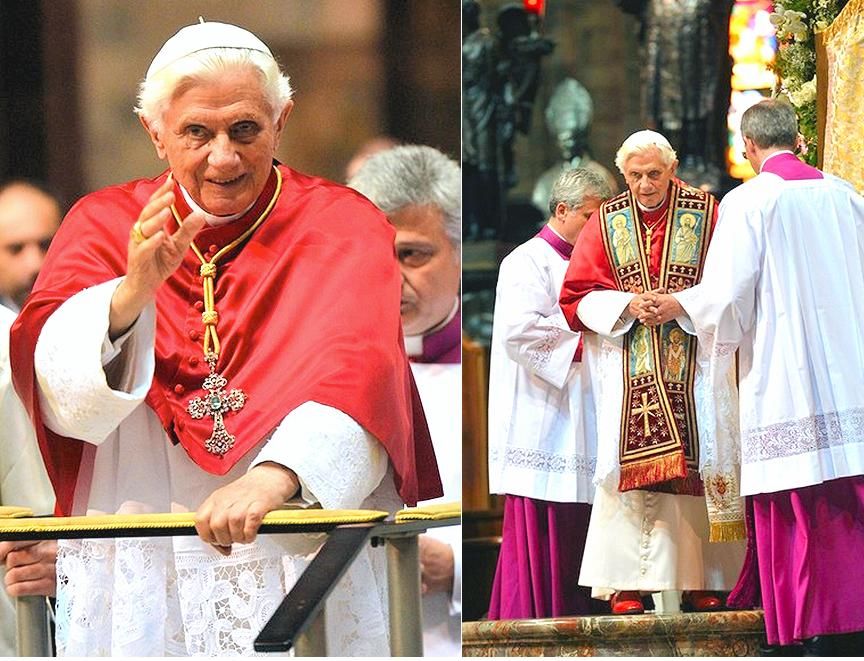
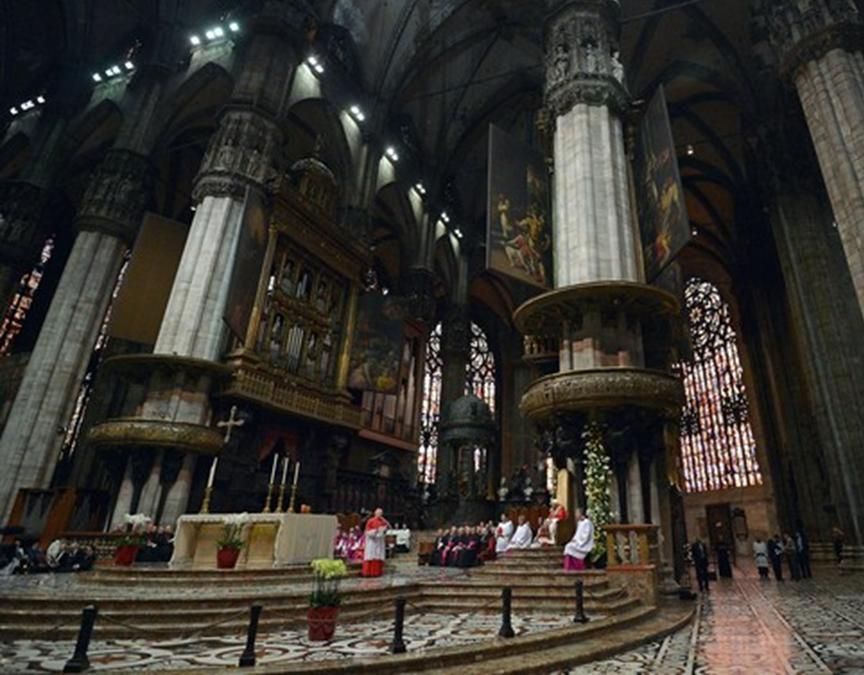
Pope Benedict XVI presided at the Third Hour of the Divine Office on Saturday morning in the cathedral basilica of the Assumption in Milan, on the first full day of his pastoral visit to the city that is host to the weeklong VII World Meeting of Families.
In his homily, the Holy Father spoke of liturgical prayer – the official, public praise of God – as the highest expression of the mystery of the Church.
“Our lips, our hearts and our minds,” he said, “are, in the prayer of the Church, interpreters of the needs and aspirations of all humanity.”
The Pope called the daily prayer of the Liturgy of the Hours [also called the Divine Office] - of which Lauds and Vespers are part - “an essential task of the ordained ministry in the Church,” all of whose members together constitute God’s very own family.
Pope Benedict went on to say, “Through the Divine Office, which prolongs the central mystery of the Eucharist throughout the day, priests are especially united to the Lord Jesus, living and working in time.”
Pope Benedict encouraged seminarians to learn to enjoy the prayer right now and live their time in seminary with commitment, saying, “If Christ, in order to build up His Church, places Himself in the hands of the priest, these priests must in turn entrust themselves to Him without reserve.”
“Love for the LORD Jesus,” said Pope Benedict, “is the soul and the reason for the priestly ministry, just as it was also the premise upon which He assigned Peter the mission of feeding his flock".
The Holy Father also had words of gratitude, praise and encouragement for consecrated men and women religious, calling on them to look to the future with confidence, relying on the faithfulness of God and the power of His grace, which, he said, “is able to work ever new wonders.”
Calling on the intercession of the Blessed Virgin Mary and of the vast array of saints who have emerged from the bosom of the Church in Milan throughout the centuries, Pope Benedict prayed that God, “Giver of all gifts, might make the ministry of priests ever fruitful and to strengthen the witness of consecrated persons."
Finally, Pope Benedict prayed that God might renew all Christian families according to His plan, "that they might be places of grace and holiness, fertile ground for vocations to the priesthood and consecrated life."
Dear brothers and sisters!
We are gathered together in prayer, responding to the Ambrosian hymn of the Third Hour: "It is the third hour. The Lord Jesus ascends the Cross, reviled". It is a clear reference to Jesus's loving obedience to the will of the Father. The Paschal mystery has given rise to a new time: The death and resurrection of Christ recreate the innocence of mankind and make joy pour forth.
In fact, the hymn continues: "Here starts the era of Christ's salvation - Hinc iam beata tempora coepere Christi gratia" (Here, the happy times begin in the grace of Christ)".
We are gathered in the Cathedral Basilica, this cathedral which is truly the heart of Milan. From here, one's thought goes out across the very vast Ambrosian diocese, which through the centuries and even in the recent past, has given the Church names that are illustrious for their eanctity of life and their ministry, like Saint Ambrose and St. Carlo Borromeo; Popes of uncommon stature like Pius XI and the Servant of God Paul VI, and the Blessed Cardinals Andrea Carlo Ferrari and Alfredo Ildefonso Schuster.
I am very happy to linger with you a bit. I address each and everyone with an affectionate greeting, and I wish to extend it in a special way to those who are ailing or too old.
I greet most heartily your Archbishop, Cardinal Angelo Scola, and I thank him for his kind words. I affectionately greet your emeritus Pastors, Cardinals Carlo Maria Martini and Dionigi Tettamanzi, along with the other cardinals and bishops who are present.
At this moment, we are experiencing the mystery of the Church in its highest expression, that of liturgical prayer. Our lips, our hearts, and our minds, in ecclesial prayer, become the interpreters of the needs and yearnings of all mankind.
With the words of Psalm 118, we implored the Lord in the name of all men: "Direct my heart toward your testimonies...Lord, let your mercy come to me" (36.41).
The daily praying of the Liturgy of the Hours constitutes an essential task of the ordained ministry in the Church. Through the Divine Office, which prolongs the central mystery of the Eucharist throughout the day, priests are united in a special way to the Lord Jesus, who lives and works in time.
The priesthood - what a precious gift it is! Dear seminarians, who are preparing to receive it, learn to enjoy it starting now, and you will live your valuable time in the seminary with commitment!
Thus, Archbishop Montini, during Ordinations in 1958, said in this very Cathedral: "Your life as a priest begins: (it is) a poem, a dramatic play, a new mystery ... source of perpetual meditation... always an object for discovery and wonder."
The priesthood, he said, "is always a novelty and a beauty for whoever dedicates his loving thought to it... It is an acknowledgment of God's work in us" (Homily at the Ordination of 46 Priests, June 21, 1958).
If Christ, in order to edify the Church, puts himself into the hands of a priest, the latter in turn should trust in him without reservations. Love for the Lord Jesus is the soul and the reason of priestly ministry, as it was premised when he assigned to Peter the mission of pasturing his own flock: "Simon, do you love me more than they do?... Feed my sheep" (Jn 21,15).
The Second Vatican Council recalled that Christ "always remains the source and wellspring of the unity of their lives. Priests, then, can achieve this coordination and unity of life by joining themselves with Christ to acknowledge the will of the Father. For them this, means a complete gift of themselves to the flock committed to them. Hence, as they fulfill the role of the Good Shepherd, in the very exercise of their pastoral charity, they will discover a bond of priestly perfection which draws their life and activity to unity and coordination" (Decr. Presbyterorum Ordinis, 14).
On this question, one might ask: In various occupations, and in various occasions, how to find the unity of life, the unity of the priestly being, which comes from this very source - profound friendship with Jesus, an interior being together with him.
There is no opposition between what is good for the priest as a person and his mission. Rather, pastoral charity is a unifying element of life which comes from an increasingly intimate relationship with Christ in prayer, in order to live the total gift of oneself for the flock, so that the People of God may grow in communion with God and be a manifestation of the communion of the Most Holy Trinity.
Indeed, every act of ours has the objective of leading the faithful to union with the Lord, and thus to grow in ecclesial communion, for the salvation of the world.
The three things - personal union with God, the good of the Church, the good of mankind in its totality - are not distinct or opposing things, but a symphony of lived faith.
A luminous sign of this pastoral charity and of an undivided heart is priestly celibacy and consecrated virginity. We sang the hymn of St. Ambrose: "If the Son of God is born in you, you will keep your life sinless".
To receive Christ - Christum suscipere - is a theme that is often found in the preachings of the Holy Bishop of Milan. I cite a passage from his commentary on St. Luke: "Whoever receives Chris joys t into the intimacy of his home will be sated with the greatest of (Expos. Evangelii sec. Lucam, V, 16).
The Lord Jesus was his great drawing card, the principal theme of his reflection and preaching, and above all, the object of a living and confident love. Without a doubt, all Christians love Jesus, but this love for him acquires a singular significance for the celibate priest and for those who have responded to the vocation of consecrated life: Only and always in Christ do we find the spring and the model for repeating Yes daily to the will of God. .
"What bonds retain Christ?"? , St. Ambrose asked, who with surprising intensity, preached and cultivated virginity in the Church, as he promoted the dignity of women. To the question cited, he said: "Not knots of rope, but the chains of love and spiritual affection". (De virginitate, 13, 77).
It was in this sermon to virgins that he said: "Christ is everything for all of us. If you wish to heal your wounds, he is the physician. If you are burning with fever, he is the spring; if you find yourself oppressed by sin, he is justice; if you need help, he is power; it you fear death, he is life; if you desire paradise, he is the way; if you are fleeing from darkness, he is light; if you need food, he is nourishment" (Ibid., 16, 99).
Dear consecrated brothers and sisters, I thank you for your witness and I encourage you: Look to the future with confidence, counting on God's fidelity, which will never fail you, and the power of his grace which is always capable of working new wonders, even in us and with us.
The antiphons of this Saturday's psalmody lead us to contemplate the mystery of the Virgin Mary. Indeed, in her we can recognize the "virginal life of poverty that Christ chose for himself and which his Mother the Virgin embraced" (Lumen gentium, 46), a life in full obedience to the will of God.
The hymn also reminds us of the words of Jesus on the Cross: "From the glory of the gallows, Jesus spoke to the Virgin: 'Woman, behold your son", :John, behold your mother".
Mary, Mother of Christ, extend and prolong in us your divine motherhood, so that the ministry of the Word and the Sacraments, the life of contemplation and apostolic activity in its multiple forms, may persevere, without tiring and with courage, in the service of God and the edification of his Church.
At this time, I give thanks to God for the ranks of Ambrosian priests and religious men and women who have given all their energies in the service of the Gospel, sometimes with the supreme sacrifice of their life.
Some of them have been proposed for the veneration and emulation of the faithful even in recent times: the Blessed priests Luigi Talamoni, Luigi Biraghi, Luigi Monza, Carlo Gnocchi and Serafino Morazzone; the Blessed religious Giovanni Mazzucconi, Luigi Monti, Clemente Vismara, Maria Anna Sala and Enrichetta Alfieri.
Through their common intercession, let us trustingly ask the Giver of every gift to always make fruitful the ministry of priests and to strengthen the witness of consecrated persons in order to show the world the beauty of giving oneself to Christ and to the Church; and to renew Christian families according to God's plan, so that they may be places of grace and holiness, fertile ground for vocations to the priesthood and the consecrated life. Amen.
The Anglophone news agencies virtually ignored the start of the Pope's visit to Milan yesterday, even they continued to churn out further speculations and 'analyses' of Vatileaks and its recent developments. AFP - whose mother agency is French but runs a well-subscribed English service - probably would not have reported this event at all if the Pope had not spoken about priestly celibacy! and no, he most certainly is not 'defending' it but rather reminding Catholics that for priests and consecrated persons who have freely chosen to take on the consecrated life, it is a grace from God and a gift of the Holy Spirit. ]
Pope defends priestly celibacy

MILAN, June 2, 2012 (AFP) - The Pope COLORE=#B200FF]insisted Saturday that celibacy is central to the priesthood, amid increasing calls for clergy to be allowed to marry and claims that abstention may have contributed to sex abuse scandals.
"The shining light of pastoral charity and a unified heart is sacerdotal celibacy and enshrined virginity," Pope Benedict XVI told hundreds of clergy members in Milan Cathedral during the 7th World Meeting of Families.
"Without a doubt, Jesus's love is for all Christians but takes on particular significance for the celibate priest and for those who take up the vocation of a life of devotion," he said on the second day of his visit to Milan.
It is not the first time the Pope has insisted on celibacy. [DUH! He is the Pope - it's his duty to remind everyone as often as he can that the Church has practiced (though not always successfully enforced) priestly celibacy for most of its history. That Tradition and the Magisterium have established the necessity of priestly celibacy, and that countless saints, declared or not, have dedicated their lives to God in poverty, obedience and chastity.
Obviously, it is by no means humanly impossible to live a celibate life, and no priest who is now militantly against celibacy can claim he was forced to to take the vow of chastity (along with obedience and poverty, for that matter!) when they were ordained. They knew what the priesthood would entail when they decided to prepare for it, and most especially, at the moment they decided to take their vows at Holy Orders. It is a measure of how much they have allowed the ego to override everything else that they do not think the priestly vows - made to God, not to men - mean anything at all. Joseph Ratzinger and an overwhelming majority of the world's 400,000 priests daily keep to their vows. If the dissidents can't do that, they should stop thinking of themselves as priests and take steps towards laicization ASAP.]
In April he issued a rare condemnation of disobedient priests, saying those who questioned the Church over celibacy and the ordination of women were being self-serving.
Some senior Catholic clergymen have called for a new discussion on the issue of priest celibacy in the wake of the sex scandal which has rocked the Church. [Which most psychologists now agree are unrelated issues. The deviant priest, just like other human deviants like serial killers, for example, has no control - or does not wish to control - his perversions, and would be deviant whatever occupation he had. The incidence of pedophilia among priests is below that of persons in the Western world who have secular occupations like sports trainers or even of married men in general!]
But the Pope made no reference to the scandal, or the moral and spiritual crises which often isolated and fragile priests face daily in their vocation. [Because, unlike the mass media, the Pope has a sense of appropriateness - the right time and the right place - to bring up issues, especially those with which the public has been over-saturated.]
On his arrival at the Cathedral, the Pope was welcomed by Milan's Archbishop Angelo Scola, tipped by some as a possible future Pope, as well as Cardinal Carlo Maria Martini, who was among the favourites to succeed John Paul II.
The Pope has left behind a scandal-hit Vatican to address pilgrims and families from 154 countries around the world on the importance of traditional family values in securing the Church's future in the West.
On Friday, he was greeted in front of Milan's multi-spired Gothic cathedral by thousands of cheering faithful, and was presented with yellow daisies by children as he passed through the crowd in his Popemobile.
Later today, he was to meet with tens of thousands of young pilgrims in the San Siro football stadium, before presiding over a celebration with 300,000 faithful in the evening.
The trip will wind up on Sunday with an open-air Mass at Bresso airport near Milan, Italy's economic capital.
Media reporting or commenting on events in the Vatican in recent days has highlighted the decline of journalism as a respectable profession even more than usual. Reuters, for instance, has churned out so-called 'analyses' almost every day since May 23, when Paolo Gabriele was arrested. Its writers have used the news peg as a pretext for trotting out and gloating over every imaginable fault they can find with Benedict XVI and his Pontificate, while, like the Italian media, they have been glossing over the moral, ethical and criminal aspects of the crimes committed.
These crimes involve the violation of individual privacy and the privacy of correspondence - which also has to do with a higher order of crime, since the victim is a sovereign head of state - by stealing private documents, accepting stolen documents, and publishing such documents for commercial gain. The MSM gloat over the fact that the Pope's valet may have been among those who stole the Pope's papers, but portray the eventual recipient, journalist Gianluigi Nuzzi, like a hero for publicly exploiting these stolen documents in his TV show, in newspaper interviews, and eventually in a book. Stealing isn't just a 'Catholic sin' as seculars might say abortion is - indeed, there has never been any human culture that has sanctioned stealing, profiting off stealing, and rampant trespass (violation of privacy) - but in the age of Wikileaks, it seems as if the media no longer consider it a crime if the persons involved wear white collars like Julian Assange and Nuzzi (but they will the moment one or more presumed purveyors of Vatileaks turn out to wear a Roman collar! After all, they've already more or less branded pedophilia as a 'Roman-collar crime'.]
[Modificato da TERESA BENEDETTA 03/06/2012 16:37] |
| |
 02/06/2012 17:03 02/06/2012 17:03 |
|
| | | OFFLINE | | Post: 24.974
Post: 7.489 | Registrato il: 28/08/2005
Registrato il: 20/01/2009 | Administratore | Utente Master | |
|

 Day 2:
Day 2:
MEETING WITH YOUNG PEOPLE
who were recently confirmed
or about to be confirmed

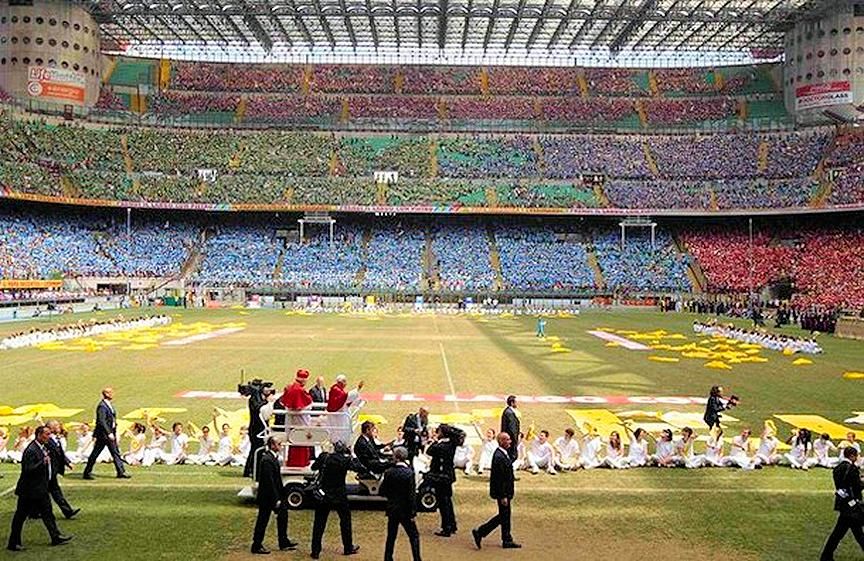
As part of his Apostolic Visit to Milan, Pope Benedict XVI met with young people who are preparing for Confirmation, or who have recently received it.
Addressing the 'confirmands' gathered in Milan’s San Siro stadium on Saturday morning, the Holy Father spoke about the gifts of the Holy Spirit, saying that they are a “stupendous reality that will allow them to be formed as Christians, to live the Gospel, and to be active members of the community.”
Through the grace of these gifts, the Holy Father continued, one can enter into a more profound relationship with Christ.
“Christian life,” he said, “is a journey, it is like hiking up a mountain path in the company of Jesus. With these precious gifts [of the Holy Spirit] your friendship with Him will become ever closer, and ever more true.”
“Learn to dialogue with the Lord,” said Pope Benedict, “confide in Him, tell Him your joys and your worries, and ask Him for light and sustenance for your journey.”
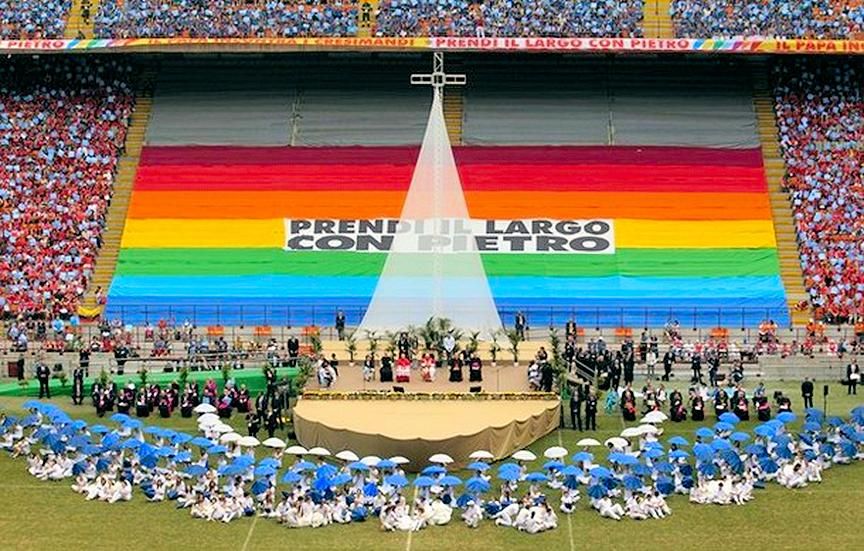 The theme of the gathering was 'PUT OUT TO SEA WITH PETER'.
The theme of the gathering was 'PUT OUT TO SEA WITH PETER'.
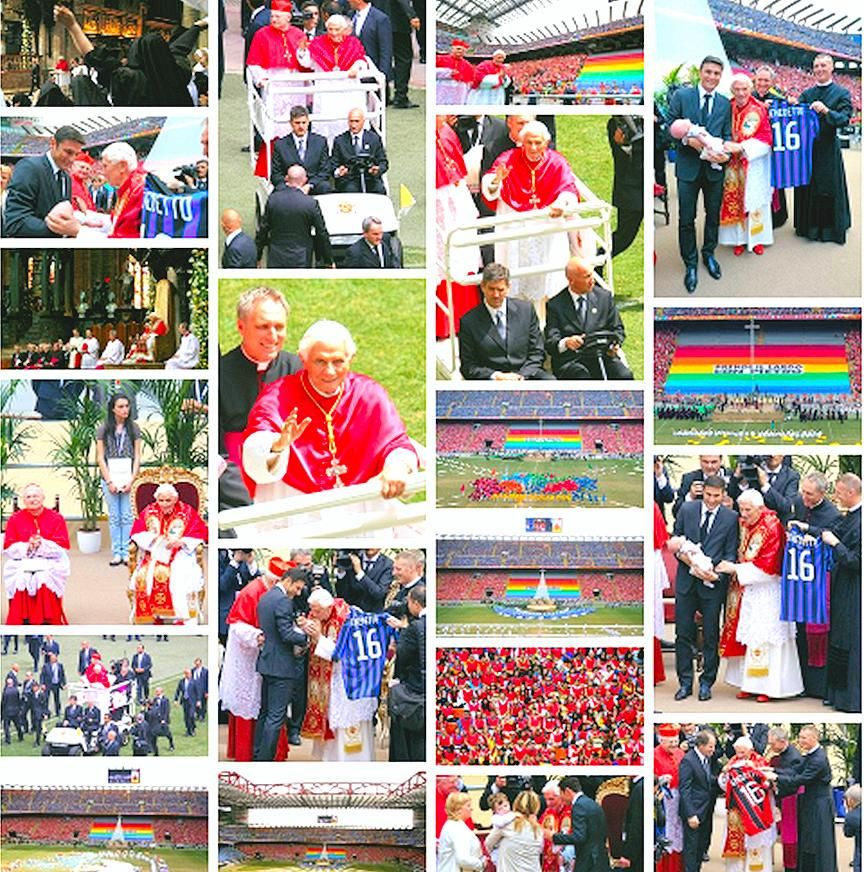
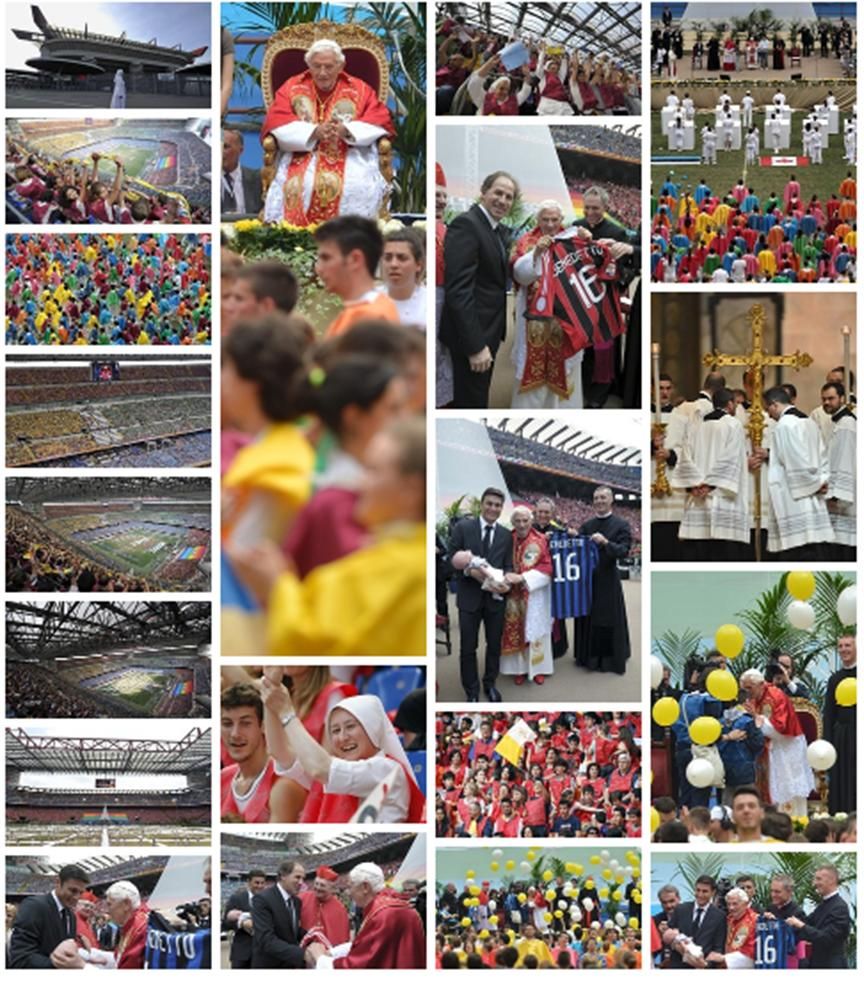 THE POPE'S MEETING WITH
THE POPE'S MEETING WITH
YOUNG CONFIRMANDS AT SAN SIRO
Translated from

July 2, 2012
At 11:15 am, the Holy Father reached the Meazza stadium in San Siro where he met with the boys and girls who this year received tghe sacrament of Confirmation or are about to receive it.
Introduced by a presentation of the confirmands by Caridnal Angelo Scola, Archbishop of Milan, and by a greeting from don Samuele Morelli, who is in charge of the Children's Seciton of the diocesan Youth Ministry, the Holy Father addressed the children. Here is a translation...
Dear boys and girls:
It is a great joy to be able to meet with you during mY visit to your city. In this famous football stadium, today you are the protagonists.
I thank your Archbishop, Cardinal Angelo Scola, for his kind words. I thank don Samuel Marelli as well - your friend who has welcomed me in your behalf.
I am happy to greet the episcopal vicars who, in the name of the Archbishop, have administered or will administer Confirmation.
I particularly thank the Fondazione Oratori Milanesi who organized this encounter, your parents, all the catechists, your educators, your godfathers and godmothers, and those who, in each of your parish communities, have been your 'travelling companions' and have given witness to you of their faith in Jesus Christ who died, resurrected, and lives among us.
You, dear children, are preparing to receive the sacrament of Confirmation or have received it recently. I know you have gone through a beautiful formative course, which this year your dicoese called "The miracle of the Spirit".
Helped by this itinerary in various stages, you have learned to recognize the amazing things that the Holy Spirit has done and continues to do in your life and in the lives of all those who say YES to the Gospel of Jesus Christ.
You have discovered the great value of Baptism, the first of the Sacraments, the gateway to Christian life. You received it, thanks to your parents, who along with your godparents, and in your name, professed the Creed and vowed to educate you in the faith.
That has been for you - as it was for me a long time ago! - an immense grace. From that time, reborn in water and the Holy Spirit, you became part of the family of God's children, you became Christians, members of the Church.
Now you have grown up, and you can say your own personal Yes to God, a Yes that is free and aware. The sacrament of the Chrism confirms Baptism, and brings the Holy Spirit abundantly to you.
You yourselves, filled with gratitude, now have the chance to welcome the great gifts of the Spirit which will help you, in the journey of life, to become faithful and courageous witnesses to Jesus.
The gifts of the Holy Spirit are wonderful realities which allow you to be formed as Christians, to live the Gospel and be active members of the community. Remember briefly these gifts, of which first the prophet Isaiah and then Jesus himself spoke:
- The first gift is wisdom, which makes you discover how good and great the Lord is, and as the Word says, makes your life full of flavor, because you are, as Jesus said, the 'salt of the earth'.
- Then the gift of intellect, so that you can understand deeply the Word of God and the truth of the faith.
- The gift of counsel, which will guide you in the discovery of God's plan for your life, the life of each and everyone.
- The gift of strength, to conquer the temptations of evil and to always do good, even when it means sacrifice.
- Then comes the gift of science - not in the technical sense as it is taught in the university - but in the deeper sense, as that which teaches us to find in creation the signs of God, the traces by which God has spoken in every time, of how he speaks to me, to each of us; and how to animate the work of every day with the Gospel, to understand that there is a depth in our work, to understand this depth itself and thus give flavor to work, even difficult work.
- Mercy is another gift, which keeps alive the flame of love in our heart for our Father who is in heaven, so we can pray to him daily with the confidence and loving tenderness of children who are loved, in order not to forget the fundamental reality of the world and your own life - that God exists and God knows me and awaits my response to his plan for me.
- And finally, the seventh and last gift is fear of God. Fear of God does not mean being afraid of him, but to feel for him a profound respect, respect for the will of God which is the true design for my life, and the way through which personal as well as communitarian life can be good; and today, with all the crises in the world, we see how important it is to that everyone respects this will of God which is impressed in our hearts and according to which we must live. Thus, fear of God is the desire to do good, to do what is true, to do the will of God.
Dear boys and girls, all of Christian life is a journey - it is like going along a path that climbs a mountain - therefore, it is not always easy, but climbing a mountain is a beautiful thing, in the company of Jesus. With these precious gifts, your friendship with him becomes even truer and closer.
That friendship is continuously nourished by the sacrament of Eucharist, in which we receive his Body and Blood. That is why I invite you to always take part with joy and faithfulness in Sunday Mass, when the whole community gathers together to pray, to listen to the Word of God, and take part in the Eucharistic Sacrifice.
Therefore, always avail of the Sacrament of Penitence, of confession. It is an encounter with Jesus who pardons our sins and helps us to fulfill what is good. To receive this gift, to start anew, is a great gift in life - to know that I am free, that I can start anew, that everything has been forgiven.
And do not miss your daily personal prayer - learn to dialog with the Lord, trust him, tell him your joys and your concerns, and ask for light and support during your journey of life.
Dear friends, you are fortunate because in your parishes, there are oratories, a great gift in the diocese of Milan. The oratory, as the word says, is a place where one prays, but also a place where you gather together in the joy of the faith, you learn catechesis, you play, you organize activities for service and other purposes, and I would say, where you learn to live. So be frequent and assiduous users of your oratory so that you may increasingly ripen in your knowledge of Jesus and in following him.
The seven gifts of the Holy Spirit grow precisely in such a community where life in the truth, with God, is the practice. In your families, be obedient to your parents, listen to the instructions they give you, so that like Jesus, you may "grow in wisdom, age and grace before God and men" (Lk 2,51-52).
Finally, do not be lazy, but children and youth who are committed, especially to your studies, with a view to your future life - it is your daily duty and a great opportunity for you to grow and to prepare your future.
Be there for others, and be generous, conquering the temptation to place yourself in the center, because selfishness is the enemy of true joy. Once you enjoy the beauty of being part of the community of Jesus, you can make your own contribution to make it grow and you will know how to invite others to be part of it.
Allow me to tell you also that the Lord - every day, today - calls you to great things. Be open to what he suggests to you, and if he asks you to follow him in priesthood or in the consecrated life, do not say No to him! It would be a mistake of laziness. Jesus will fill your heart for all your life.
Dear boys and girls, I tell you this, with particular force: Keep to high ideals - all of them can be held to high measure, not just some. Be saints! But is it possible to be saints at your age? I tell you, of course! St. Ambrose said so himself, the great saint of your city, where he writes in one of his works: "Every age is mature for Christ" (De virginitate, 40).
Above all, this has been shown by many saints who were your age, like Domenico Savio or Maria Goretti. Holiness is the normal way of the Christian - it is not reserved for a few chosen ones, but open to everyone, of course, with the light and the power of the Holy Spirit who will not fail us if we hold out our hands and open our hearts. And with the guidance of our Mother.
Who is our Mother? She is the Mother of Jesus, Mary. To her, Jesus entrusted everyone, before he died on the Cross. May the Virgin Mary always safeguard the beauty of your Yes to Jesus, her Son, the great and faithful friend in your life. So be it.[DIM]
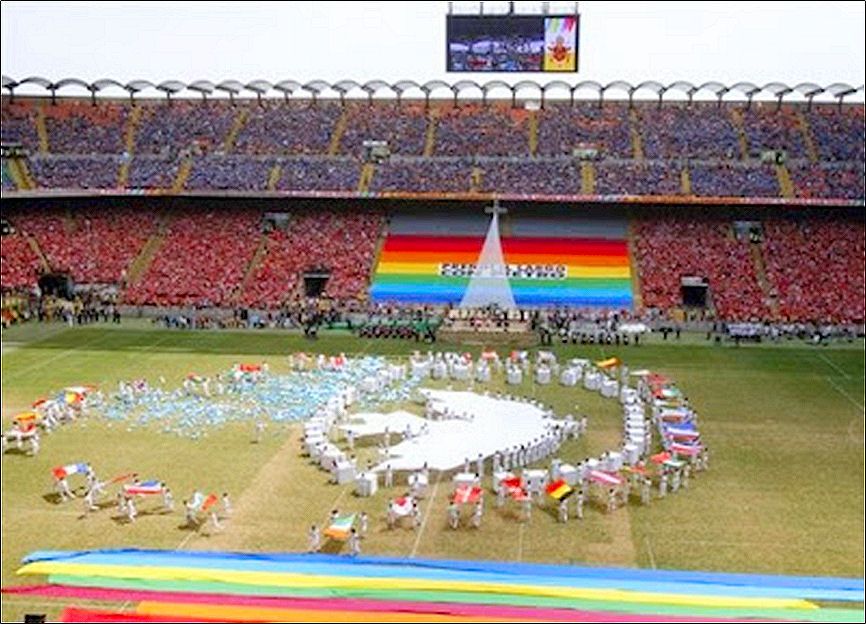
After this meeting at San Siro, the Holy Father returned by car to the Archbishops' Residence where he had lunch in private.
[Modificato da TERESA BENEDETTA 05/06/2012 12:30] |
| |
 02/06/2012 21:34 02/06/2012 21:34 |
|
| | | OFFLINE | | Post: 24.975
Post: 7.490 | Registrato il: 28/08/2005
Registrato il: 20/01/2009 | Administratore | Utente Master | |
|
 Benedict in Milan:
Benedict in Milan:
A gust of fresh air for him
by Andrea Tornielli
Translated from the Italian service of

June 2, 2012
MILAN - The wind which blew yesterday afternoon through Milan's Linate domestic airport and caused the Pope to take off his white zucchetto as he got off the airplane from Rome, was a breeze, of course, compared to the storm that has been slamming the Vatican in the past few weeks.
Benedict XVI has left the Vatican for three days - his longest trip so far within Italy, leaving behind him the physical scene of poison pen letters and fliers [In Italian, this is a compact colourful phrase, 'veleni e veline', literally 'poisons and anonymous fliers'], document leaks, and betrayal by people in his immediate circle.
He was welcomed by Cardinal Angelo Scola - who has now hosted a Pope twice in the space of 12 months as archbishop of a major diocese, first as Patriarch of Venice in May 2011, and now as Archbishop of Europe's largest diocese. Papa Ratzinger and Scola have known each other as friends and fellow theologians for more than 40 years.
For a man whose personal habits and discipline are monk-like, the open embrace of the Milanese must have been a breath of pure oxygen for the Pope. Arriving in Milan with him, also in apparent fine spirits, was Cardinal Secretary of State Tarcisio Bertone, the openly declared target of the Vatileaks operation. [So how is that 'leaving the scandal behind' for the Pope?]
The Secretary of State does not usually travel with the Pope on visits within Italy, but his presence in Milan was on the program from the beginning because the occasion of the visit is an international event. [In other words, he was not added to the entourage because of recent events. And so, Tornielli implies but does not say, his presence must not be interpreted as anything special. On the other hand, it might have been best not to have him hovering around the Pope all the time in Milan as a living reminder of the 'scandal' the Pope is supposed to be getting away from.
The only reason I can think for having him in Milan - other, of course, than the express wish of the Pope (whose sense of propriety would have nonetheless quickly perceived this nuance) - is that he simplifies the pecking and seating protocol, since as SecState, he outranks both Cardinals Scola and Tettamanzi, host bishops as present and immediate past Archbishop of Venice, as well as Cardinal Ennio Antonelli, president of a Curial dicastery and the senior Vatican official in charge of the World Meeting of Families. I found this evident in the seating at La Scala last night, where these four were seated in that order, to the left of the Pope, whereas Cardinal Angelo Bagnasco, president of the Italian bishops' conference and Archbishop of Genoa, was seated in the row behind them. Still, since Bertone has no special role in any of the events in Milan, he ought to have had the grace to plead out of the trip by calling in sick yesterday morning before the flight from Rome! His 6'2" bulk is hardly a discreet presence.]
Discreet and active as always, don Georg Gaenswein, the Pope's private secretary. He too appeared calm, at least externally.
The past week has been very difficult for everyone in the Pope's immediate circle, but it seems that the papal entourage in Milan, two days after he expressed his continuing confidence in his co-workers, was anxious to project a united front. In keeping with the Vatican spokesman's repeated statements that infighting for power in the Vatican are nothing but exaggerations by the media who paint the Vatican as a nest of intrigue. [In fairness, the Pope himself said something similar last Wednesday.]
The only one who does not smile in public, for professional reasons, is another protagonist in recent events - Domenico Giani, the Pope's chief security officer, who is also head of the Vatican Police. He is always within arm's length of the Pope when he is out in public, always carefully scrutinizing the crowd. His investigations led to the arrests of the valet Paolo Gabriele ten days ago.
The order of the day is compactness. The current storm, whose outcome continues to be inscrutable, appears to have given the Pope's people new strength. Moreover, the Church usually does not allow media pressure to dictate her agenda.
And so, yesterday afternoon, on the stage in front of Milan's cathedral, there they sat together - Cardinals Scola, Tettamanzi and Bagnasco - each of them mentioned more than once in the documents published by Gianluigi Nuzzi in his book. [It must be underscored, however, that none of them were cast in a negative light by said documents.]
In 2000, when he presented the concept of 'purification of memory' for the Jubilee Year, Cardinal Ratzinger said: "The Church is ever aware that there is sin among her members, and has always opposed the idea that the Church consists only of saints".
Perhaps, the Bavarian prelate with the refined manners never thought at the time how much of that sin he would have to bear. [No, that may sound like a convenient closing line for this article. But Joseph Ratzinger surely never had illusions about the Church and the 'filth' in it [not just pedophilia, but rampant careerism, as well, and all the other human vices that go with it] - he just did not imagine he would ever be Pope and have to deal with the problems directly in such a public way.]
|
| |
 02/06/2012 23:51 02/06/2012 23:51 |
|
| | | OFFLINE | | Post: 24.976
Post: 7.491 | Registrato il: 28/08/2005
Registrato il: 20/01/2009 | Administratore | Utente Master | |
|

 Day 2
Day 2
MEETING WITH CIVILIAN AUTHORITIES
of Milan and Lombardy
Translated from the Italian service of

June 2, 2012
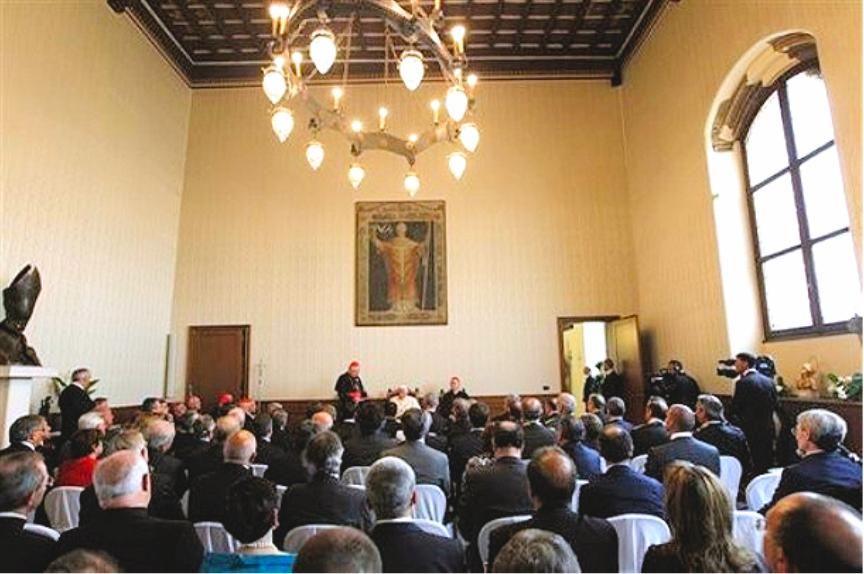
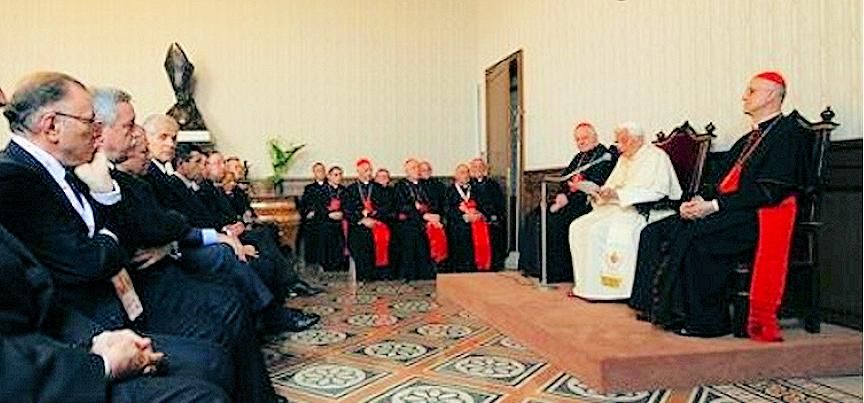
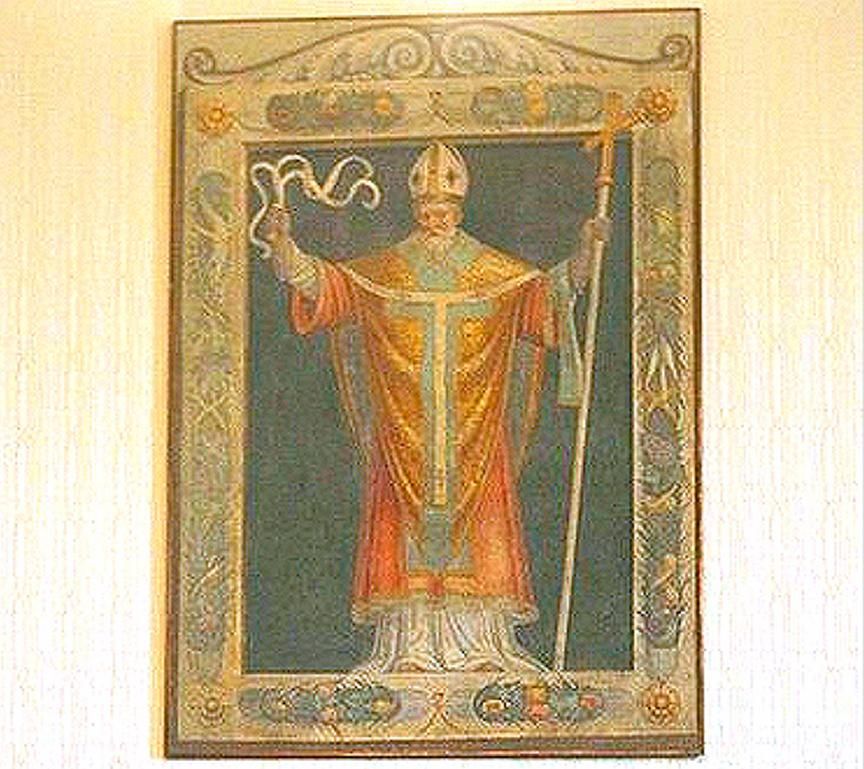
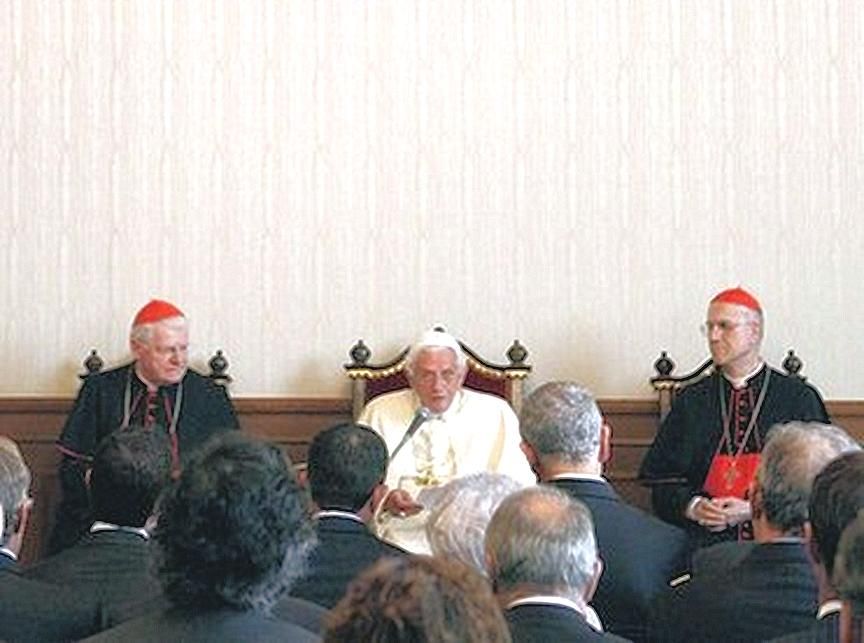 A portrait of St. Ambrose dominates the Throne Room.
A portrait of St. Ambrose dominates the Throne Room.
Those in charge of public administration must "learn to make themselves loved", Pope Benedict XVI told civilian and military authorities, as well as business leaders, of the city of Milan and the Lombardy region, when he met them Saturday afternoon at the Throne Room of the Archbishop's Palace in Milan.
He said the admonition was not a modern electoral slogan but fruit of the wisdom of St. Ambrose, patron saint of the city. And from those principles, he said, that had made Ambrose's governance as bishop of what was then known as Mediolanum, 'balanced and enlightened', the Pope offered a series of considerations about the exercise of public power.
"The first quality of he who governs is justice", he said, "then love of freedom - understood not as the privilege of a few but as a right for everyone".
He said such freedom expresses the 'secularity of the State', a value that safeguards the collective good, but is at the same time "in the service of individual rights'.
"Thus one can see that legislation and the work of state institutions should particularly serve the family, which is founded on matrimony and open to life, and one such service is to acknowledge the primary right of parents to freely choose how to educate and form their children according to the educational plan that they consider valid and relevant. One cannot do justice to the family if the State does not sustain freedom of ecucation for the common good of the entire society".
Recalling the secular contribution made by the Church in the social and cultural sectors - "of which the Church's many saints of charity bear witness" - the Holy Father said: "The period of crisis that we are going through requires, beyond courageous technical and political decisions, gratuitousness, giving freely, as I have had occasion to sau, that 'The City of Man is not promoted only relationships of rights and duties, but even more and beforehand, by relationships of giving freely, of mercy and of communion'."
This morning, a grand celebration of faith by 80,000 young people, along with their parents and catechists, engulfed the Pope at the football stadium of San Siro.
He inspired them with the words: "Dear boys and girls, I tell you now: keep your ideals high - all of them, not just some, are reachable. Be saints! Is it possible to be saints at your age? And I tell you, of course! So did St. Ambrose, the great saint of your city, who wrote in one of his works, 'any age is mature for Christ'."
Saturday began with the celebration of Lauds according to the Ambrosian rite, at the Cathedral of Milan, which was packed with 5,000 priests, religious, seminarians and lay faithful.
"Look to the future with confidence," the Holy Father told them. "You can count on God's faithfulness".
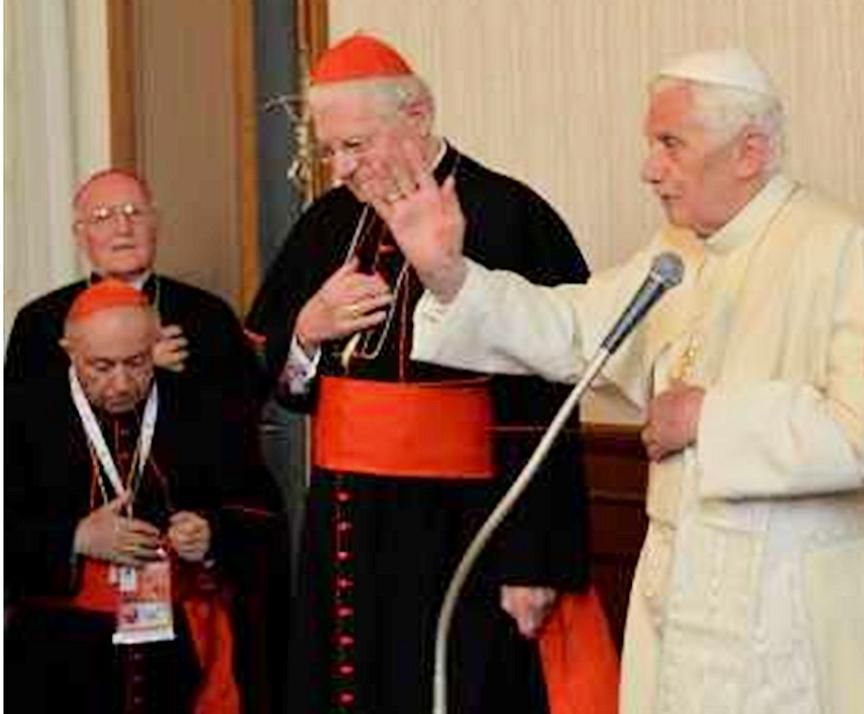
The Pope earlier had a private meeting with Cardinal Carlo Maria Martini, who had been Archbishop of Milan for 22 years until he retired in 2002. The Jesuit cardinal, a renowned Biblical scholar, has been suffering from Parkinson's disease in recent years, and now lives in a Jesuit retirement home near Milan. He turned 85 last February.
THE POPE ADDRESSES LAY LEADERS
Translated from

June 2, 2012
At 5 pm, in the Throne Room of the Archbishop's Residence, the Holy Father met representatives from Milan and the Lombardy region of various institutional, civilian and military authorities, entrepreneurs and laborers, and the world of education and culture.
After an introduction by Cardinal Scola, the Holy Father delivered the following address (presented her in translation):
Distinguished Gentlemen:
I am truly grateful for this encounter which shows your feelings of respect and esteem towards the Apostolic See, and at the same time, allows me,as Pastor of the universal Church, to express my appreciation to you for the diligent and meritorious work which you have tirelessly promoted for the increasingly better civic, social and economic wellbeing of the industrious people of Milan and Lombardy.
Thank you to Cardinal Angelo Scola, who introduced this meeting. In addressing my deferential and heartfelt greeting to you, my thoughts go naturally to him who was your illustrious predecessor, St. Ambrose, governor - consularis - of the provinces of Liguria and Aemilia, with its seat in the imperial city of Milan, a place of passage and of reference, which was, as we would say today, European.
Before he was elected Bishop of what was then known as Mediolanum - in a way that was completely unexpected and absolutely against his will because he felt he was not prepared - he had been responsible for public order and administered justice for this purpose.
I find significant the words with which the prefect Probus asked him to be consularis of Milan: "Go and govern not as a judge but as a bishop". And he was indeed a governor who was fair and enlightened, who could confront issues with wisdom, good sense and authoritativeness, who could overcome conflicts and repair divisions.
So I wish to dwell briefly on some principles that he followed and which are still valuable to those who are called to govern public affairs.
In his commentary on the Gospel of Luke, St. Ambrose recalls that "the institution of power derives so much from God that he who exercises power is himself a minister of God" (Expositio Evangelii secundum Lucam, IV, 29).
These words may seem strange to men of the third millennium, but they clearly indicate a central truth about the human being which is the solid foundation of social coexistence: There is no human power that can be considered divine, and therefore, no man can be the master of another. Ambrose reminded the Emperor of this courageously, writing him: "Even you, most august Emperor, are a man" (Epistula 51,11).
There is another element that we can take from the teaching of St. Ambrose: The first quality of he who governs is justice, the public virtue par excellence, because it has to do with the good of the entire community.
But it does not suffice. Ambrose accompanied it with another quality: love of freedom, which he considered the element that distinguished good governors from the bad ones, because, as he wrote in another letter, "Good men love freedom, reprobates love servitude" (Epistula 40, 2).
Freedom is not a privilege of the few but a right for everyone, a precious right that civil authority should guarantee. Nonetheless, freedom does not mean individual arbitrariness, bur rather implies responsibility for each one.
We can find here one of the principal elements of secularity in the State: to assure freedom so that everyone may be able to propose their view of the common good, but always with respect for others, and in the context of laws that aim for the good of all.
On the other hand, to the degree that the concept of a confessional (religious) state was overcome, it appeared clear, in each case, that her laws should find justification and strength in natural law, which is the foundation of an order that is appropriate to human dignity, beyond a merely positivist idea from which there can be no indications that have, in any way, an ethical character. (cfr Address to the German Parliament, Sept. 22, 2011).
The State is in the service and guardianship of the person and his 'well being' in multiple aspects, starting with the right to life, whose deliberate suppression can never be allowed.
Everyone can thus see how legislation and the work of state institutions should be, especially, a service to the family that is founded on marriage and open to life, recognizing, among other things, the primary right of parents to free choice of how to educate and form their children according to the educational plan that they consider valid and relevant. Justice cannot be rendered to the family if the State does not support this freedom of education for the common good of the entire society.
In this existence of the State for its citizens, a constructive collaboration with the Church seems valuable - without any confusion, of course, as to their respective ends, and to the different and distinct civilian powers and that of the Church - but for the contribution that she has offered and continues to offer to society, with her experience, her doctrine, her tradition, her institutions, and the works through she has been of service to the people in general.
Just think of the splendid line of the saints of charity, the schools and Christian culture, her care of the sick and the marginalized, who are served and loved as one serves and loves the Lord himself.
This tradition continues to bear fruit: the diligence of Lombard Christians in such sectors is quite alive and perhaps even more significant than in the past. Christian communities promote these activities not just to be supplementary, but rather as a freely-given super-abundance of the charity of Christ and the totalizing experience of their faith.
The time of crisis that we are going through requires more than just courageous technical and political decisions, as I had occasion to recall: "The earthly city is promoted not merely by relationships of rights and duties, but to an even greater and more fundamental extent, by relationships of gratuitousness, mercy and communion" (Enc. Caritas in veritate, 6).
We can avail of yet another precious invitation from St. Ambrose, whose solemn and admonitory figure is woven into the banner of the City of Milan.
Of those who wish to work in government and public administration, St. Ambrose asks that they make themselves loved. In the work De officiis, he writes: "Whoever inspires love can never bring on fear. Nothing is as useful as to make oneself loved" (II,29).
On the other hand, reason which, in its turn, moves and stimulates your industrious presence in the various fields of public life, can only be the will to dedicate yourselves to the good of the citizens, and therefore, a clear expression and evident sign of love. Thus, politics is profoundly ennobled, becoming an elevated form of charity.
Distinguished Gentlemen: Please accept these simple considerations of mine as a sign of my profound esteem for the institutions that you serve and for your important work. May you be assisted in your task by the continual protection of heaven, of which let my Apostolic blessing be a token of good wishes for you, your co-workers, and your families. Thank you!
After the meeting, and having dined in private, the Holy Father travelled by car to Bresso for the Feast of Testimonials.
AFP filed a wrap-up of Day 2, minus the Feast of Testimonials with the families, but continues to make Vatileaks the context and background for its report:
Faithful Catholics welcome
scandal-weary Pope in Milan

MILAN, June 2 (AFP) - Thousands of young Catholics have greeted the Pope in Milan in a welcome distraction from Vatican infighting for the aged pontiff.
The Pope, who left the scandal-hit Vatican for the Church-sponsored World Meeting of Families, appeared cheered by the raucous welcome that the 80,000 young believers gave him.
And during a colourful spectacle at the city’s famous San Siro football stadium, one young Italian chosen to address the Pope told him he was “the biggest champion”.
Milan’s Archbishop Angelo Scola said he hoped the youths would give the Pope some comfort after weeks of turmoil at the Vatican over the leaking of papal documents to the press.
Some commentators have suggested the leaks were part of a plot to undermine the Church hierarchy.
The crowds of adolescents and children were divided into groups in the colours of the rainbow and some presented a choreographed show on the pitch. Several then had the chance to address a few words to the pope.
“We are so very happy that you wanted to take the time to meet us,” said one young Italian, Giovanni Castiglioni.
“It’s so great to be able to welcome you in the stadium where our champions play. Today, you are the biggest champion.”
Scola, accompanying the Pope, said he hoped the young pilgrims’ “contagious enthusiasm” would bring the Pope “smiles, rest and joy”.
The archbishop has long been tipped as a possible successor to Benedict. But the Vatileaks scandal, with its echoes of an internal power struggle inside the Church, suggests to some that all bets are now off. {Will the journalists never learn? Not one of them even remotely thought that Angelo Roncalli or Albino Luciani or Karol Wojtyla would end up being elected Pope. And as for Joseph Ratzinger, although his obviously eminent qualifications were unmatched by any other cardinal, most newsmen and Vatican observers explicitly and expressly ruled out the probability that he would ever be elected Pope (too old, too polarizing, absolutely not papal material at all). And that's one thing they will never forgive him for - that he made them all look foolish, and completely wrong, even though this was all the Holy Spirit's doing! So now they are devoted to making him look foolish and completely wrong any chance they get - never mind that the Holy Spirit is with him!]
The scandal, in which hundreds of secret papal documents were leaked to the media, led last week to the arrest of the pope’s personal butler. The drama appears to have taken its toll on the 85-year-old pontiff. [Really?!?! If this latest development had not happened, the reporter would have made the same remark, except using his age as the pretext: "At 85, the Pope's age is showing more and more", or some such!]
On the second day of his trip to address pilgrims from 154 countries, the pope also spoke to hundreds of clergy members in Milan Cathedral.
Despite increasing calls from some parts of the Church for clergy to be allowed to marry, he made it clear that the question of priest celibacy was not up for debate.
“The shining light of pastoral charity and a unified heart is sacerdotal celibacy and enshrined virginity,” Benedict said.
“Without a doubt, Jesus’s love is for all Christians but takes on particular significance for the celibate priest and for those who take up the vocation of a life of devotion,” he added.
Some senior Catholic clergymen have called for a new discussion on the issue of priest celibacy in the wake of a string of child abuse scandals that has rocked the Church. [Same assertion in AFP's earlier story.]
Later Saturday, the pontiff was due to preside over a celebration with 300 000 faithful and the trip will wind up on Sunday with an open-air mass at Bresso airport near Italy’s economic capital.
While Benedict was blessing new-born babies and receiving yellow daisies from children as he drove around the city in his Popemobile, the Vatican was busy denying media reports suggesting its administration was in turmoil.
Vatican spokesman Federico Lombardi told journalists Saturday that it was not true that cardinals tasked with deciding the fate of the Vatican bank’s president were split due to a rift in the Holy See’s heart.
The commission of cardinals must decide whether or not to uphold the bank board’s decision last month to oust Ettore Gotti Tedeschi for having allegedly failed to clean up the institution’s image amid accusations of corruption.
Lombardi did not comment on other reports suggesting the cardinals were being forced to choose sides in the “Vatileaks” scandal, which some argue is aimed at ousting the Vatican number two, Secretary of State Tarcisio Bertone.
[Remember the Cardinals' oversight commission that met the day after Gotti Tedeschi was 'fired'? It was announced the next day that they had no announcement to make! Well, for what it's worth, the Italian media reported that only 3 of the 5 met - Bertone, who chairs the commission; Cardinal Nicora, head of the AIF which Bertone et al have apparently emasculated; and Cardinal Tauran, who was once #3 at State. The other two - Cardinal Scherer of Sao Paolo, and Cardinal Toppa of Mumbai - were out of the country. Nicora and Tauran were both apparently unhappy about the Gotti Tedeschi firing. So, two against one, no announcement could be made. Now, after ten days, Fr. Lombardi makes the announcement that the commission members have come to an agreement and they have now written Gotti Tedeschi to confirm that he has been fired! Adding insult to an already unconscionable injury. Why Fr. Lombardi chose to make this announcement in Milan is another one of those arcane and totally inexplicable communications decisions one has come to expect from the Bertone-administered Vatican communications apparatus.]
It was Bertone who reportedly pushed the bank’s board to fire their president as internal divisions over financial transparency came to a head.
Gotti Tedeschi’s mission was to get the Vatican on to the “white list” of financially virtuous countries, but tensions grew after Bertone resisted reform and pushed for a new transparency law to be watered down.
Tedeschi, 67, came under suspicion himself in 2010 when he was investigated as part of an inquiry by magistrates into money-laundering. More recently he too was suspected of having leaked secret papal documents to the press. [So, the black mythification is on, and now, Gotti Tedeschi will always have this asterisk after his name as amillstone around his neck!]
[Modificato da TERESA BENEDETTA 06/06/2012 19:37] |
| |
 03/06/2012 03:09 03/06/2012 03:09 |
|
| | | OFFLINE | | Post: 24.977
Post: 7.492 | Registrato il: 28/08/2005
Registrato il: 20/01/2009 | Administratore | Utente Master | |
|

 Day 2
Day 2
MEETING WITH FAMILIES
Feast of testimonials
Translated from the Italian service of

June 2, 2012
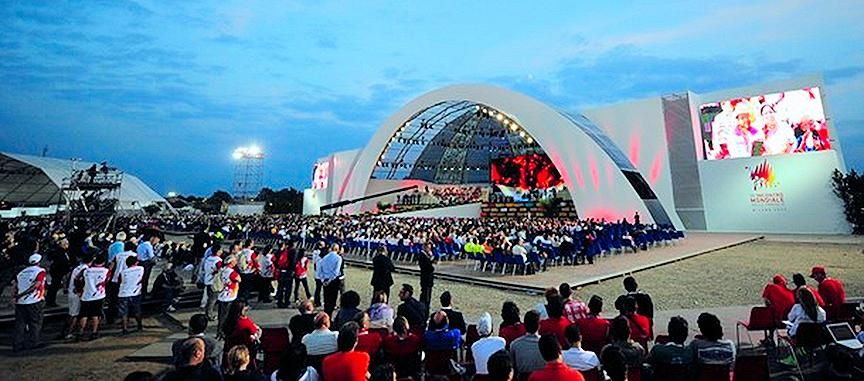
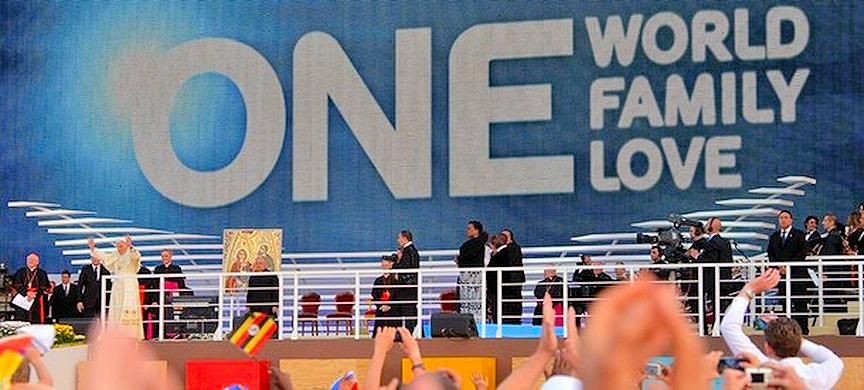
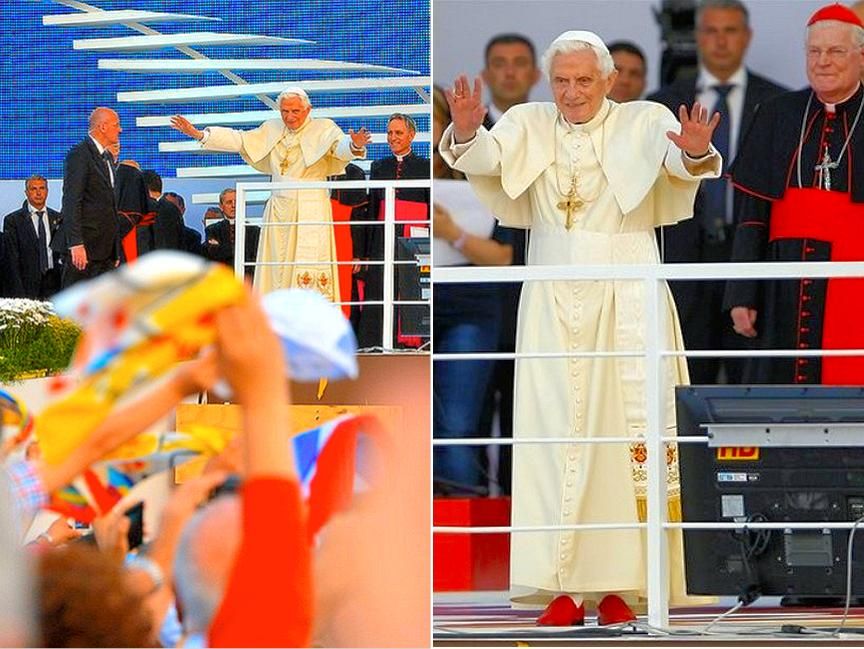
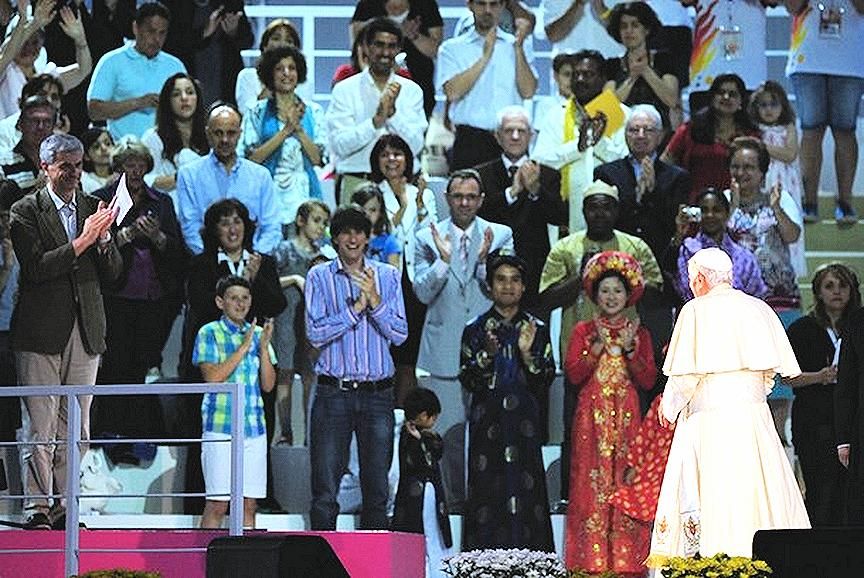
With 350,000 in attendance, the VII World Meeting of Families in Milan had its much-awaited Feast of Testimonials tonight in the presence of Benedict XVI.
After an hour of experiences lived in the light of the Gospel, recounted by families representing the inhabited continents and Oceania, the Pope responded to five questions posed to him on the most typically acute problems facing families today, ranging from the unprecedented national crisis in Greece to the recent earthquakes that struck the central Italian region of Emilia-Romagna. Alessandro De Carolis has this report:
On a former airport that has become a park and Milan's largest fairground, it became this week the epicenter for Catholic families upholding Christian values, a topic that is hardly ever discussed in public, but tonight was 'on show' for world television: the faith of those who build their lives by starting with making room for God.
From the huge stage designed to recall the vault of heaven but open to the skies, it all took place, thanks to precise and expert direction, interspersed with musical numbers by renowned Italian and European pop artists, amid which Benedict XVI sat like a master sage.
Like a fond grandfather with a beloved grandchild, the Holy Father answered the first question from a Vietnamese girl, Cat Tien, by ecalling scenes of domestic tranquillity from his own childhood, and then saying: "To tell the truth, if I try to imagine what it could be like in Paradise, I think back to the days of my youth, of my infancy. In an atmosphere of trust, of joy and of love, we were happy. And so I think that in Paradise there should be something of what my childhood was like. In this sense, I look forward to 'going home' on the other side of our world."
Next, a young engaged couple from Madagascar, confided that they appreciated the virtues of Christian marriage but were apprehensive about the 'for always' part of it.
The Pope said that the way to overcome it was simply to build on a love that is not just sentiment. Which he would also remind a Greek couple whose life has become dependent on the outcome of their country's current crisis. But in this respect, he also said that political leaders should learn to assume responsibility:
"I think that a sense of responsibility should grow in all political parties, not to promise things which they cannot realize; not just to seek votes for themselves, but to be responsible for the good of everyone, that they may understand that politics is always a moral responsibility before God and before men".
A couple from the United States spoke about a typical complaint in the West - the difficulty of observing Sunday rest because of work demands.
"I would call on employers to think of the family, how to make it possible for parents to reconcile both priorities. Then there's Sunday, a holiday. I do not know if in the USA, Sunday is still observed as such. But I think it is very important that Sunday, the Lord's day - and because of this, also 'a day for man' - must be defended as a freedom for man. Let us defend Sunday and other religious holidays as days for God, and therefore for men".
The last question was about divorced Catholics who subsequently remarry without having annulled their previous marriage. The Pope called this "one of the great sufferings for the Church today". He said the Church does not stop loving those in such irregular situations, and said parishes should always be the first refuge for those who are burdened by the problem. [Unfortunately, the report does not say anything more about the Pope's answer!]
The Pope did not forget the victims of recent earthquakes in the Emilia-Romagna region, greeting onstage a family from Cento who lost their home. He directly addressed the residents of the tent cities that now house the homeless, for whom a live TV feed of the Milan event had been arranged:
"Dear friends, you know that we feel your pain profoundly, your suffering, and that above all, I pray everyday that the earthquakes may come to an end. Be assured that we do not forget you and that we are doing everything possible to help you. I wish you well, and may the Lord bless you all".
At 9:30 p.m., after leading the assembly in praying the Our Father, surrounded by representative families, the Pope left Parco Bresso to return to the city. He will be back tomorrow morning to celebrate the concluding Mass of the VII World Meeting of Families.
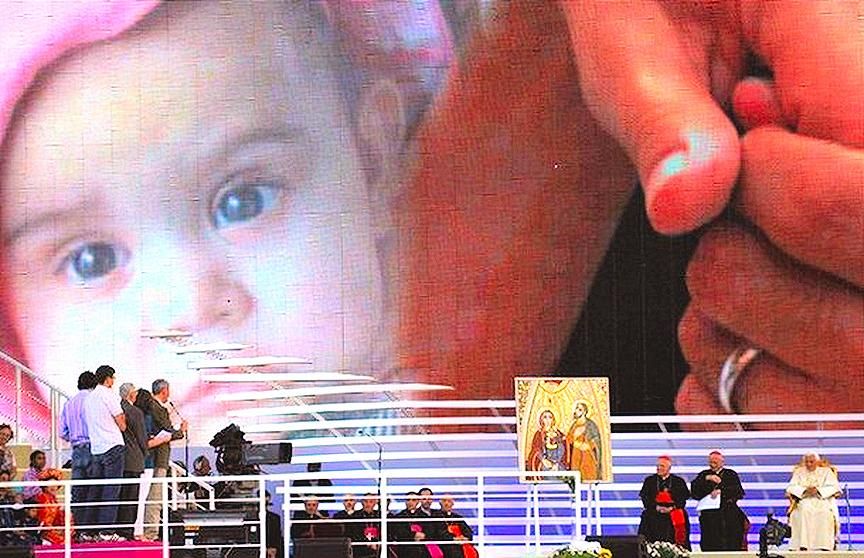
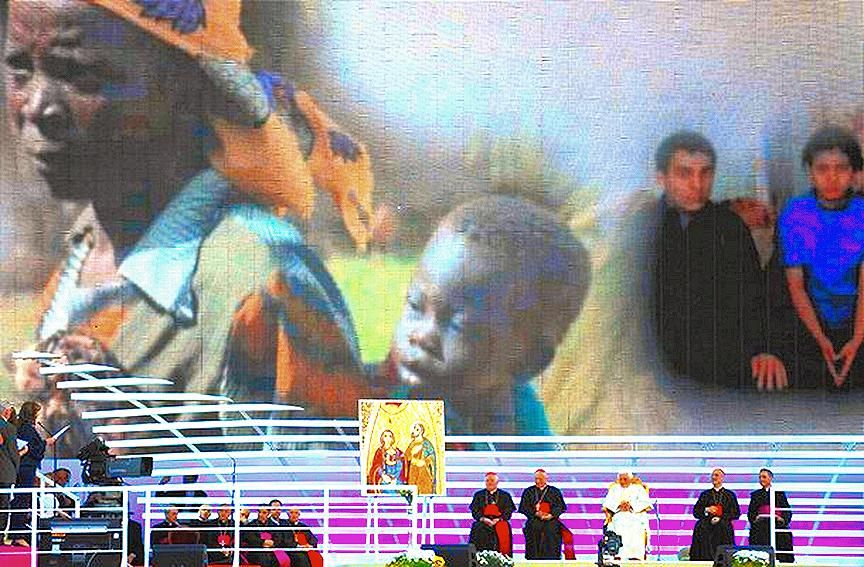
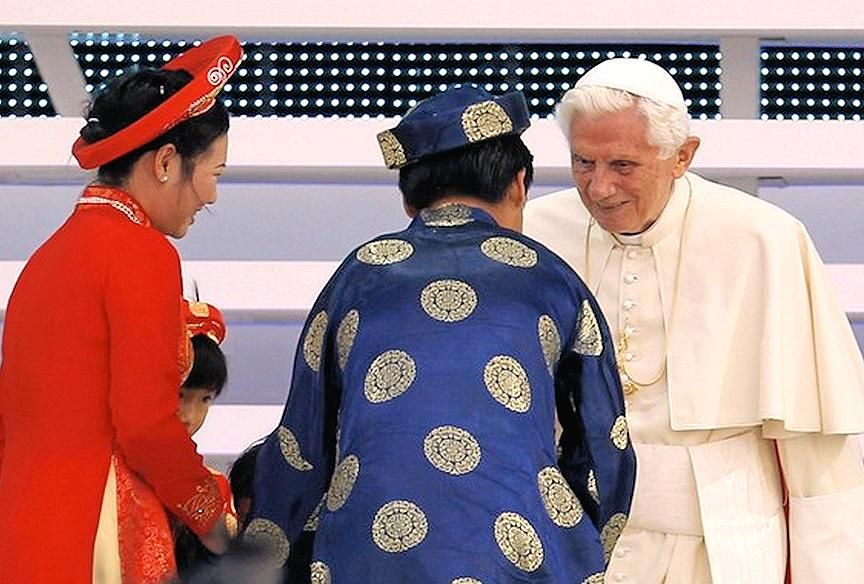
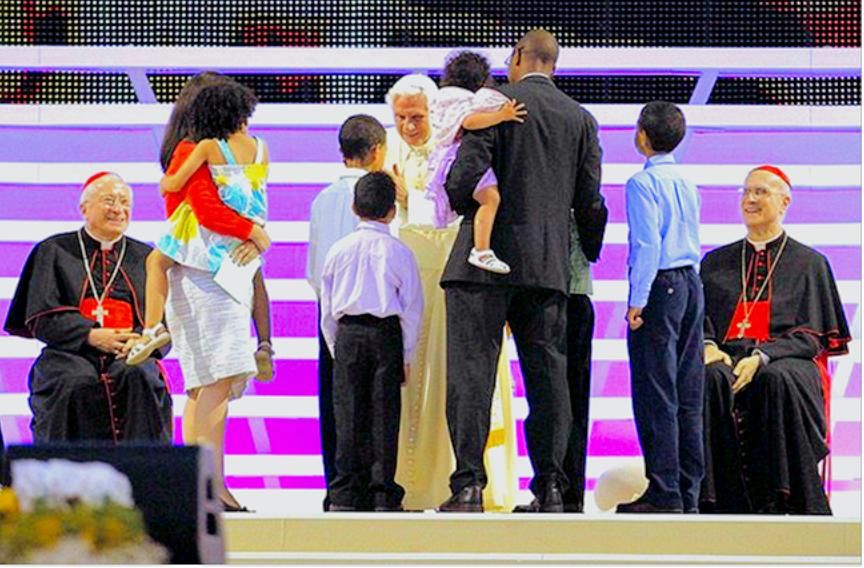
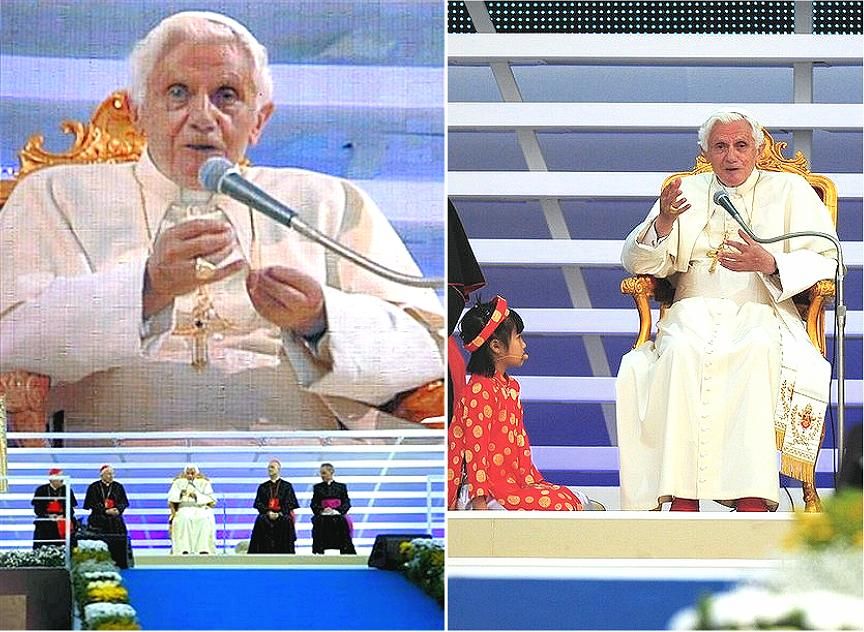 THE POPE'S DIALOG
THE POPE'S DIALOG
with representatives of families
from around the world
Translated from

June 2, 2012
This evening, the Feast of Testimonials of the VII World Meeting of Families took place at Milan's Parco-Nord at the former airport of Bresso.
The Holy Father Benedict XVI arrived at Bresso at 8:30 pm. Cardinal Ennio Antonelli, president of the Pontifical Council for the Family, opened the event with some words of greeting.
In the course of the program, the Pope listened to representatives of families and couples from different regions of the world and answered some questions. Here is a translation of the Q&A transcript:
1. CAT TIEN (a girl from Vietnam):
Ciao, Papa. I am Cat Tien from Vietnam. I am seven years old, and I would like to present my family to you. This is my father Dan, and my mother Tao, and my little brother Binh. I would like so much to know something about your family and when you were a child like me...
THE HOLY FATHER: Thank you, carissima, and to your parents, thank you from the heart. Now, you want to know what I remember about my family and my childhood - that would be quite a lot. I would just want to say a few things.
The essential reference point for our family was always Sunday, but it began for us on Saturday afternoon. That was when Father told us about the readings for the next day, from a book that was in wide use in Germany at the time, which explained the Bible texts. Thus we began our Sunday by getting into the liturgy, in an atmosphere of joy.
Then the next day we went to Mass. We lived in places that were near Salzburg, so we always had a lot of music - Mozart, Schubert, Haydn - and whenever the Kyrie begun, it was like heaven had opened.
Later, the big meal together at home was of course important. And we sang a lot. My brother is a great musician, and even as a boy, he composed things for all of us that the whole family could sing. Our father played the zither and he sang. These were unforgettable times.
We also made little trips together, and took walks. We lived near woods, and so walking through the woods was always beautiful- with adventures, games, etc. In short, we were one heart and one soul as a family, with so many experiences in common, even in very difficult times - because there was the war, and before that, the dictatorship, and afterwards, poverty.
But there was mutual love among us, a joy even in simple things that was so strong that we could overcome and endure the difficulties. I think this was very important: that even small things could give joy - it is the way we expressed our heart to each other.
So we grew up in the certainty that it is good to be alive, to be a human being, because we could see the goodness of God reflected in our parents and our siblings. To tell you the truth, if I try to imagine what it would be like in Paradise, it always seems to me something like my childhood, my infancy. In which we were happy in an atmosphere of trust, of joy, of love. I think that Paradise would be something similar to my childhood. So, in this sense, I expect to be 'going home' as I am bound for the other side beyond our world.
2. SERGE RAZAFINBONY and FARA ANDRIANOMBONANA (Engaged couple from Madagascar)
SERGE: Holiness, we are Fara and Serge, from Madagascar. We got to know each other in Florence where we are students - engineering for me, economics for her. We have been engaged for four years and as soon as we graduate, we plan to return to our country and give a hand to our people through our professions.
FARA: The family models dominant in the West do not convince us, but we are also aware that many traditions in Africa are being lost or overturned. We feel that we are made for each other, and that is why we want to get married and build a family together. We also want every aspect of our life to be oriented by the values of the Gospel. But speaking of matrimony, Holiness, there is a term about it that attracts us more than anything else, but it also frightens us - and that is, 'for always'...
Dear friends, thank you for your witness. My prayers go with you during your engagement and I hope that you will be able to create, with the values of the Gospel, a family 'for always'.
You have indicated various forms of metrimony: we know about the 'mariage coutumier' (customary marriage) in Africa, and Western marriage. But in Europe, in fact, until the 19th century, there was a different kind of marriage that prevailed: often, matrimony was really a contract between clans, where it was sought to preserve the clans, to open them up to a better future, to defend clan property, etc.
And so it was the clans that sought to find who should marry whom among them, hoping that they would turn out to be suitable for each other. That was the case in part of my country. I remember that in the little village where I was a schoolboy, it was still largely like that.
But since the 19th century, too, there emerged the idea of emancipation of the individual, the freedom of each person, and therefore, marriage no longer had to be based on the will of others, but on one's own personal choice. First, falling in love, then engagement, and finally, marriage.
From that time, the whole world was convinced that this was the only correct model and that love in itself would guarantee the 'for always', because love is absolute, and would therefore last for all time, for always.
Unfortunately, reality is not always so. Falling in love is beautiful, but perhaps it is not something that can last in perpetuity, a because that's the way sentiments are - they do not last. Therefore, the passage from falling in love, to engagement, and finally to marriage demands a series of decisions, which are interior experiences.
As I said, the sentiment of love is beautiful, but it must be purified, it must go through a process of discernment - which means reason and will should get into it. One must unite reason, will and sentiment.
The rite of the Church does not say, "Are you in love?", but it asks, "Do you want this (marriage)?" "Are you decided on this?" Therefore, being in love must become true love which involves reason and should go hand in hand with sentiment and will. This is what happens during engagement, a purification that gives greater depth, so that the whole person, with all his abilities, with the discernment of reason adn the strength of his will, can say, "Yes, this is the life I want".
I often think of the marriage at Cana. The first wine is great - that's falling in love. But it doesn't last to the end of the feast. There must be a second wine, one that has fermented and matured. A definitive love which truly becomes this 'second wine' is more beautiful, much better than the first wine. This is what we should seek.
It is also important that the I is not isolated - the I and the you - both should be involved also in the life of the parish, of the Church, of friends. This - all of the right personal relationships, the communion of life with others, with families that can support each other - is very important, because only in this common involvement with the community, with friends, with the Church, in the faith, in God himself, will you have the wine that is 'for always'. My best wishes to both of you!
3. THE PALEOLOGOS FAMILY (form Greece)
NIKOS: Kalispera![Good evening.] We are the Paleologos family from Athens. I am Nikos, and this is my wife Pania, and our two children, Pavlos and Lydia. Years ago, with two associates, we invested everything we had to launch a small informatics company. Because of the current economic crisis, we have lost many customers, and those who remain are increasingly behind with their payments. We can barely afford to pay our two employees, and very little is left for us, the investors, after paying expenses. So, every day that passes, we have even less to keep up with family expenses. Our situation is one of many, of millions like us. In the city, everyone goes around with heads hung low. No one trusts anyone, and there is no hope.
PANIA: And even if we continue to believe in Divine Providence, we too, Holy Father, cannot think what the future can be for our children. Night and day we ask ourselves what should we do not to lose hope. What can the Church tell all this people like us, persons and families who seem to have no prospects left?
Dear friends. Thank you for this testimonial which has struck me in the heart, the hearts of everyone. What can we possibly answer you? Words are insufficient. We ought to be able to do something concrete, and we all suffer from the fact that we are unable to do anything concrete.
But let us speak of politics first. I think that a sense of responsibility should grow in all political parties so they may not promise things which they cannot realize, that they may not seek votes only for themselves but in order to be responsible for the good of everyone, understanding that politics is a human responsibility, a moral one, to God and to men.
Then, of course, individuals suffer and must accept things as they are, often without a possibility of defending themselves, Nonetheless, we can also say: Let us see to it that everyone does what he can and think of himself, his family, and others, with a great sense of responsibility, knowing that sacrifices are necessary to move ahead.
And the third point, what can we do? That is the question now. I think perhaps that 'twinship' between cities, parishes, families, could help. We already have in Europe a network of twin cities but they are focused on cultural exchange - certainly very good and useful - but perhaps, there can be twinships in another sense: for instance, that a family in the West, from Italy, from Ger5many, from France, assumes the responsibility of helping another family elsewhere. Likewise, for parishes and cities, who could take on the responsibility to help their 'twin' in a concrete sense.
But be assured that I and so many others pray for you, and a prayer that is not merely saying words, but opening our heart to God, so we may be given the creativity to find solutions. Let us hope that the Lord may help us, and that the Lord help you always. Thank you.
4. THE BERRIE FAMILY (United States)
JAY: We live near New York. I am Jay, of Jamaican origin, and I work as an accountant. My wife Anna is a substitute teacher. These are our six children, aged 2 to 12. You can well imagine, Holiness, that our life is a perennial race against time, problems and very complicated jams. Even in the United States, one of the absolute priorities is to maintain a job, and to do so, we ought not to mind the hours, often to the point of sacrificing family relations.
ANNA: It is not always easy. The impression, Holiness, is that institutions and enterprises do not care about reconciling work hours with time for the family. And certainly for us, it is not easy to reconcile our infinite work commitments with rest. Do you have any advice for finding this necessary harmony? In the vortex of so many stimuli imposed by contemporary society, how can families to observe holidays according to God's wish?
It's a big problem, and I wish to understand this dilemma between two priorities: the priority of a job is fundamental, so is the priority of the family. How then to reconcile the two. I can only try to give some advice.
The first point: There are some enterprises that allow some kind of bonus days off for the family, such as on your birthday, and they see that to concede a bit more liberty ultimately is good for the company itself because it helps reinforce the employer's love for their work, for their job. So I would call on jobgivers to think of the family, to help them so that they can reconcile both priorities.
Secondly, I think one must also find a certain creativity, which is not always easy. But at least, try every day to bring some element of joy into the family, some attention, some giving up of one's own personal desires in order to be together as a family, and to learn to overcome the nights, the dark times we referred to earlier, thinking of the great good which the family is, so that even in the thoughtfulness of giving the family a bit of something good every day, a small act of goodness, one is able to reconcile the two priorities somehow.
Finally, there is Sunday. I hope Sunday is still observed in the United States. I think that Sunday, the Lord's day, and because of this, 'the day of man' also, is very important, as a day to be free. In the story of Creation, this was the Creator's original intention - that on one day of the week, everyone may be free. And in this being free to be for each other, for ourselves, even, we are free for God. I think doing so, we defend man's freedom by defending Sunday and holidays as days for God, and therefore, days for us. I wish you the best.
5. ARAUJO FAMILY (From Porto Alegre, Brazil)
MARIA MARTA: Holiness, as in the rest of the world, marital failures continue to grow in Brazil. I am Maria Marta, he is Manoel Angelo. We have been married for 34 years and we are grandparents. As a doctor and familial psychotherapist, we meet so many troubled families, noting in the conflicts between couples an increasingly marked difficulty to forgive and to accept forgiveness. But in other cases, we find the desire and the will to construct a new union, something that will last, for the children who will be born from this new union.
MANOEL ANGELO: Some of these remarried divorcees wish to be nearer to the Church but their disappointment is great when they are refused the sacraments. They feel excluded, branded with a judgment that is unappealable. These sufferings deeply hurt those who are concerned, and these are also our wounds. Holy Father, we know that these situations and these persons are very much in the heart of the Church - but what words and what signs of hope can we give them?
Dear friends, thank you for the work that you do as family psychotherapists, which is very necessary these days. Thank you for all that you do to help those who suffer as you say. Indeed, this problem of remarried divorcees is one of the great sufferings for the Church herself. We do not have a simple prescription. The suffering is great, and we can only help through the parishes, so they may help these people to bear the consequences of divorce.
But I would say that it would naturally be very important to begin with prevention, namely, to help couples so that from the time they fall in love, they are able to proceed to a mature and profound decision about marriage. And later on, when they are married, to accompany these couples along the way, so that they do not feel alone or isolated.
As for those you speak about, we must say, as you did, that the Church loves them, but they should be able to see and feel this love. I think it is a great task for a parish, for a Christian community, to do what is possible to make them feel loved and accepted, that they are not cast out because they cannot receive absolution and the Eucharist. They must see that even so, they still live fully within the Church.
Even if the absolution of confession is not possible, they can still have permanent contact with a priest, with a spiritual guide, which is important so that they can see they are truly being helped along.
And they must feel that the Eucharist is true, that they participate in the Eucharistic sacrifice if they truly enter into communion with Christ. Because even without physically receiving the Sacrament, we can be spiritually united to Christ in his Body [the Church]. To make them understand this is important - so that they may truly find the possibility of living a life of faith, with the Word of God, in the communion of the Church, seeing their suffering as a gift to the Church, serving to help everyone defend the stability of love in marriage; and that this suffering is not just a physical and psychological torment, but a suffering in the community of the Church in the name of the great values of our faith. I think that their suffering, if accepted interiorly by themselves, is a gift to the Church. And they should know that in their way, they serve the Church, they are in the heart of the Church. Thank you for your commitment.
TO THE EARTHQUAKE VICTIMS
OF CENTRAL ITALY
The feast of families from around the world did not forget the tragedy of those persons struck in recent days by the earthquakes in Emilia-Romania. In a satellite link to the children assembled at the tent city in San Felice sul Panaro, the Holy Father addressed this greeting:
Dear friends, you know that we feel profoundly your pain and your suffering. Above all, I pray everyday that these earthquakes may end. We all wish to work together to help you - Caritas, all the organizations of the Church, the State, other communities - each of us wish to help you, you are in our prayers, we are spiritually close to you in our hearts, as well as with material assistance, and I pray constantly for you. God help you, and God help us all. I wish you well, and that the Lord bless you all.
At 9:30 pm, the Pope left Bresso and returned by car to the Archbishop's residence in Milan. The family prayer vigil in Bresso continued to 10:30 pm.
[Modificato da TERESA BENEDETTA 05/06/2012 10:48] |
| |
 03/06/2012 06:24 03/06/2012 06:24 |
|
| | | OFFLINE | | Post: 24.978
Post: 7.493 | Registrato il: 28/08/2005
Registrato il: 20/01/2009 | Administratore | Utente Master | |
|
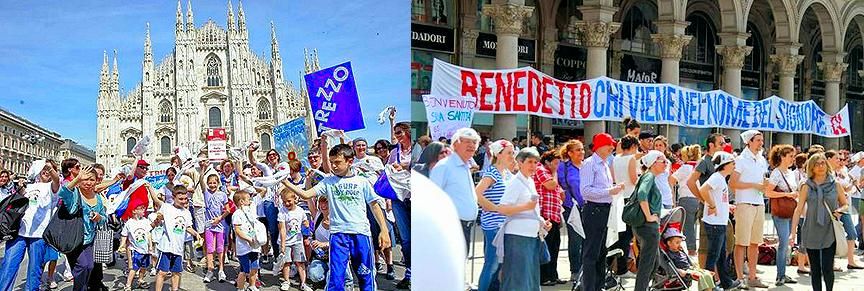 This is the kind of sidebar I have been hoping to read every time the Pope goes on the road (or eben in St. Peter's Square, where the whole world comes), but most journalists think it is not worth the effort. And yet, 'man-on-the-street' reactions have always been a good staple of journalism. The trick is to be able to talk to as many people as you can in order to get a range of answers. And invariably, one is surprised how individual and even how original almost every answer is. They are so spontaneous they cannot be invented. And not the least of this story's merits is that in an almost matter-of-fact way, without melodrama, the writer does not hesitate to convey the sense that she is in the midst of an extraordinary happening, about which is not in the least blase... It is most refreshing.
Caterina, Seunghee, Mahmoud...
This is the kind of sidebar I have been hoping to read every time the Pope goes on the road (or eben in St. Peter's Square, where the whole world comes), but most journalists think it is not worth the effort. And yet, 'man-on-the-street' reactions have always been a good staple of journalism. The trick is to be able to talk to as many people as you can in order to get a range of answers. And invariably, one is surprised how individual and even how original almost every answer is. They are so spontaneous they cannot be invented. And not the least of this story's merits is that in an almost matter-of-fact way, without melodrama, the writer does not hesitate to convey the sense that she is in the midst of an extraordinary happening, about which is not in the least blase... It is most refreshing.
Caterina, Seunghee, Mahmoud...
Here are the Pope's faithful
by Elena Galardoni
Translated from

June 2, 2012
"Me gusta su corazon" (I like his heart), says little Lucia, 8 years old, who has come to Milan from Cuenca near Madrid with Suor Maria de la Cruz who is wearing a baseball cap over her brown sister's veil.
Lucia puts her hand over her heart and beats it to the rhythm of her heartbeat when I asked her what she liked most about Benedict XVI.
Here, at Milan's Piazza del Duomo this later afternoon, there are children everywhere among the adults, even many dogs on a leash or carried by their masters.
And when the Pope with his unmistakable shock of white hair blowing in the wind emerges to greet the people of Milan from the little stage in front of the cathedral doors, not just the babies but even the dogs were raised high to greet him! Umbrellas close down as if on cue, and the chant is taken up, BE-NE-DET-TO!
God's creatures present here today are exultant. Faces are alight with smiles, even as the first stretcher with a woman prostrated by the heat, rushes by, towards the Galleria.
"It's almost too much to bear," says Ana Maria, dressed in yellow. "The emotion is overwhelming".
Thousands like her had been waiting here for hours, almost rooted to the pavement on the Piazza. The whole world is here but not to protest. Rather to rejoice.
"Please write that we are here to pay our respects to beauty - we are so tired of ugliness", says Maria P. 40, a Milanese, who is here with a friend.
Caterina Grassi, 41, also Milanese: "I am here to start a religious journey. I have the essentials, but I waited for this day to formally mark my initiation into faith. It is never too late".
Seunghee Kang, 32, Korean: "It's a difficult and complicated time for the Pope. We are with him. And God is with him".
Hamissou, 23, Nigerian: "Benedict XVI is a strong religious figure. I am a believer, but he makes me believe even more".
Mahmoud, 33, Egyptian: "He is a good man, and his goodness is contagious. He works only for what is good, which is rare in our time".
Elizabeth, 20, from the USA: "It's a stupendous feeling to see so many people of so many races gathered here today - and for a good cause. What a great celebration! 'No Benedict, no party'."
Simone R., 20, Milanese: I am not a believer, and I think that at this time, any money should go to the earthquake victims. I hope the Church is thinking of them. [Yes, Simone, all kinds of collections have been taken up in Milan for those victims, in connection with the Pope's visit and the big Family get-together!] I'm here because I want to see the Pope. He's a VIP".
Kevin, 28, from Hong Kong: "I think Benedict XVI is a great theologian - and a very likable man"
Agnes, 18, German: "He's a most beautiful personality. He has an extraordinary personality. He helps ordinary folk to follow the faith".
Scott Pickering, 21, from California: "I came to Milan to be with my girl friend. But I did not want to miss the opportunity to see the Pope. I am agnostic but I am very curious. I want to see him in person, with my own eyes".
Jacinthe, French, is wearing a white lace veil: "I'm wearing it for the Holy Father and for San Damiano".
Maria Fabrela, 19, from Pamplona, Spain: "Six of us girls travelled from Spain to celebrate with the Pope. He shows us the right path, along which step by step, we get to Christ".
Angelo Fumagalli, 66, from Sesto San Giovanni: "Today man seems to be on his knees all day worshipping ephemeral things. I kneel only for Jesus Christ".
Hans and Monica, from Bavaria, with six kids. "We came to Milan only for the Holy Father. Later, we will spend a few days in Turin and three days on Lake Garda".
There are some who are worried because they think the Pope looks tired. And someone asks whether the Mayor of Milan had kissed the Pope's ring.
"What does it matter?", answers someone impatiently. "The important thing is that like all of us here, he is aware that from this man, there is everything to learn!"
|
| |
 03/06/2012 17:33 03/06/2012 17:33 |
|
| | | OFFLINE | | Post: 24.979
Post: 7.494 | Registrato il: 28/08/2005
Registrato il: 20/01/2009 | Administratore | Utente Master | |
|

 June 3 (Ninth Sunday in Ordinary Time)
June 3 (Ninth Sunday in Ordinary Time)
SOLEMNITY OF THE MOST HOLY TRINITY
 From left: Icon by Andrei Rublev, 1411; The Trinity at the Nativity, Lippi, 1480; a Crucifix from Altoetting; a painting from St Petersburg, 1433; The Trinity with Mary and Joseph, Dutch painting, 1726; and the Orthodox icon Paternitas.
NB: In the Orthodox tradition, the Trinity is most commonly represented by the scene known as Abraham and the three Angels who visited him, in which the Angels represent the three Persons of the Trinity. A popular representation in medieval imagery shows God the Father at the head of the Cross, and the Holy Spirit as a dove above the head of the crucified Christ, or alternatively, at the deposition from the Cross.
From left: Icon by Andrei Rublev, 1411; The Trinity at the Nativity, Lippi, 1480; a Crucifix from Altoetting; a painting from St Petersburg, 1433; The Trinity with Mary and Joseph, Dutch painting, 1726; and the Orthodox icon Paternitas.
NB: In the Orthodox tradition, the Trinity is most commonly represented by the scene known as Abraham and the three Angels who visited him, in which the Angels represent the three Persons of the Trinity. A popular representation in medieval imagery shows God the Father at the head of the Cross, and the Holy Spirit as a dove above the head of the crucified Christ, or alternatively, at the deposition from the Cross.
Readings for today's Mass:
usccb.org/bible/readings/060312.cfm
Today is also the liturgical feast ofBlessed John XXIII:
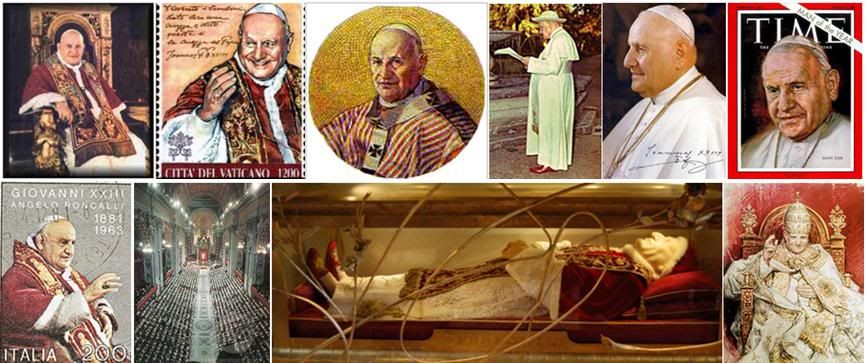 BLESSED POPE JOHN XXIII (1881-1963)
Cardinal Angelo Roncalli was Patriarch of Venice and one month short of his 78th brthday when he was elected Pope to succeed Pius XII in 1978. Shortly thereafter, he made history by convoking the Second Vatican Council. He lived only through its first session, succumbing to stomach cancer in 1963. He was beatified in 2000 by John Paul II and his body was moved from a tomb in the Vatican grottoes to a glass urn in a side chapel on the main floor of St. Peter's Basilica.
6/4/12 I must apologize. I mistakenly posted the wrong 'saints of the day' yesterday, the Ugandan martyrs whose feast is June 4, not June 3.
FINAL DAY OF THE PASTORAL VISIT TO MILAN
BLESSED POPE JOHN XXIII (1881-1963)
Cardinal Angelo Roncalli was Patriarch of Venice and one month short of his 78th brthday when he was elected Pope to succeed Pius XII in 1978. Shortly thereafter, he made history by convoking the Second Vatican Council. He lived only through its first session, succumbing to stomach cancer in 1963. He was beatified in 2000 by John Paul II and his body was moved from a tomb in the Vatican grottoes to a glass urn in a side chapel on the main floor of St. Peter's Basilica.
6/4/12 I must apologize. I mistakenly posted the wrong 'saints of the day' yesterday, the Ugandan martyrs whose feast is June 4, not June 3.
FINAL DAY OF THE PASTORAL VISIT TO MILAN
Sunday, June 3
09.15 The Holy Father leaves the Archbishop's Residence for Milano Parco Nord
10.00 EUCHARISTIC CELEBRATION
Milano Parco Nord-Bresso
- Homily by the Holy Father
12.00 ANGELUS
- Message by the Holy Father
He leaves Milano Parco Nord by car to return to the Archbishop's residence.
13.15 Lunch with cardinals and bishops and
representatives of the families attending the Encounter
Archbishop's Residence
16.30 Meeting with members of the Fondazione Milano Famiglie 2012
and the organizers of the visit
Archbishop's Residence
17.00 He leaves the Archbishop's Residence and proceeds by car to Milan Linate airport.
17.30 The Holy Father bids goodbye to his hosts at the plane steps,
before boarding the plane for Rome
ROME
18.30 Arrival at Rome-Ciampino airport.
Transfer to helicopter for the Vatican.
18:45 Arrival at the Vatican heliport.
Sorry, I am late for everything today. I missed seeing the Mass on live broadcast and woke up late, etc... [/C]
[Modificato da TERESA BENEDETTA 04/06/2012 17:11] |
| |
 03/06/2012 19:07 03/06/2012 19:07 |
|
| | | OFFLINE | | Post: 24.980
Post: 7.495 | Registrato il: 28/08/2005
Registrato il: 20/01/2009 | Administratore | Utente Master | |
|
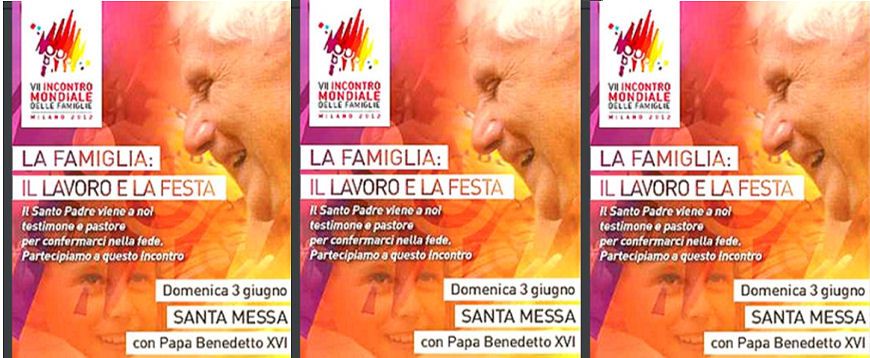 Day 3
Day 3
Concluding Mass
VII World Meeting of Families
Bresso-Parco Nord
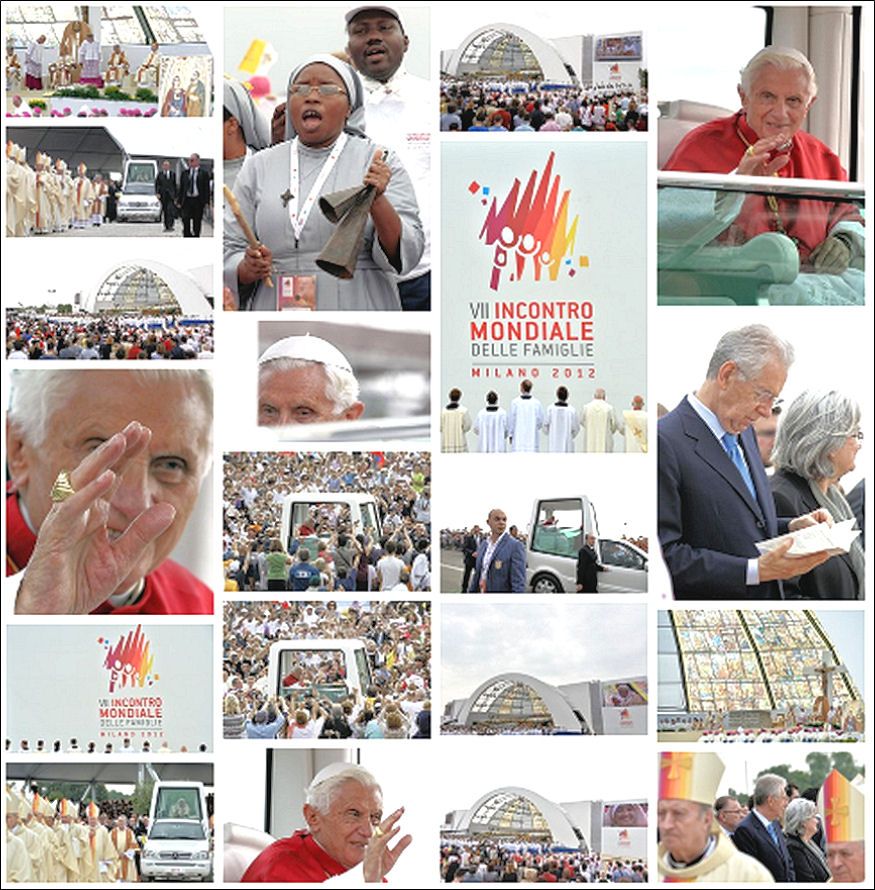
 In praise of Christian marriage
In praise of Christian marriage
and the Christian family
Adapted from

June 3, 2016
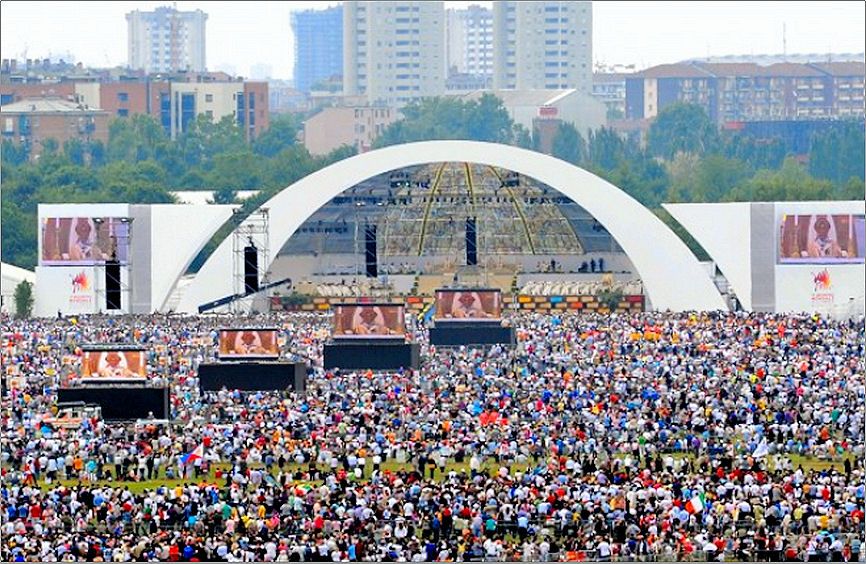
Up to a million people packed into Milan’s Parco Nord in Bresso for a Mass celebrated by Pope Benedict XVI, marking the conclusion of the VII World Meeting of Families, which was the occasion for Benedict XVI's three-day pastoral visit to Milan, his first as Pope.
Speaking on this year's theme "The Family: Work and Celebration", the Holy Father said it was important to 'strike the right balance' among the various areas of life because it is essential “for building up a society with a human face".
He stressed the significance of the sacrament of Marriage, saying that marriage between a man and a woman had “fruitful consequences" in every way.
The Pope said that this sacred union was fruitful first and foremost for the married couple, because “you desire and accomplish one another's good, you experience the joy of receiving and giving."
"It is also fruitful," he said, "in your generous and responsible procreation of children, in your attentive care for them, and in their vigilant and wise education. And lastly, it is fruitful for society, because family life is the first and irreplaceable school of social virtues, such as respect for persons, gratuitousness, trust, responsibility, solidarity, cooperation."
Pope Benedict underscored that being a family also means "maintaining a constant relationship with God and participating in the life of the Church.
He warned against the consequences that modern economic theories and practice can have on the family, when they create "ferocious competition, strong inequalities, and degradation of the environment", while reducing family relationships to "fragile convergences of individual interests" that undermine the social fabric.
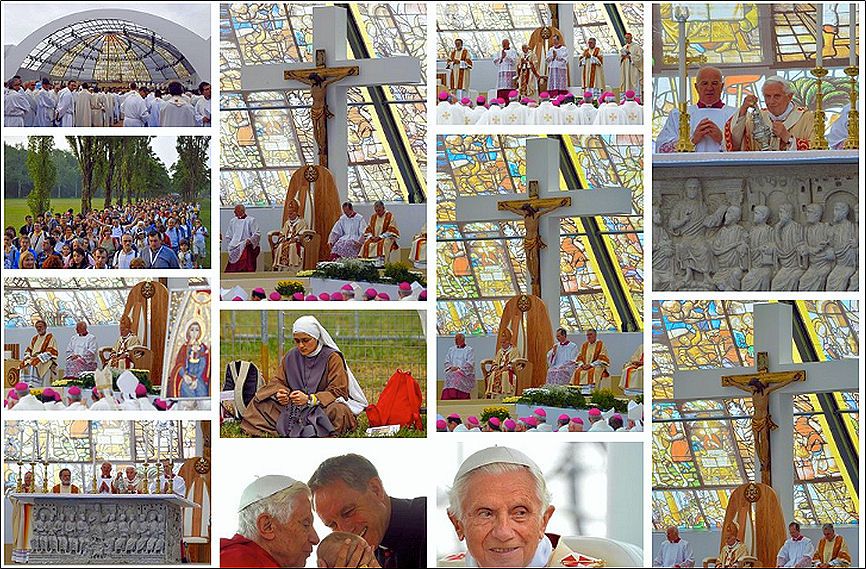
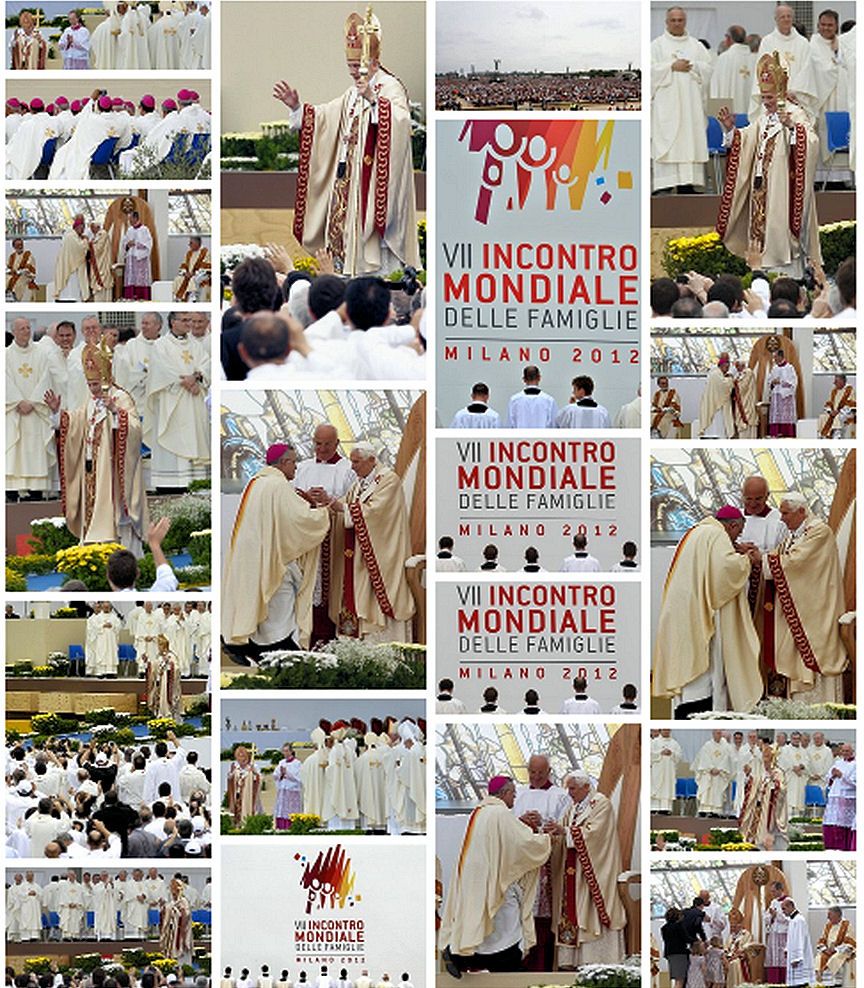 Another million-faithful Mass with Pope Benedict XVI
Another million-faithful Mass with Pope Benedict XVI....
Cologne, Sydney, Madrid, almost a million in Guanajuato, Mexico recently, and of course, the funeral Mass for John Paul II and the Beatification Mass....
Here is Vatican Radio's English translation of the Pope's homily:
Dear Brother Bishops,
Distinguished Authorities,
Dear Brothers and Sisters,
It is a time of great joy and communion that we are experiencing this morning, as we celebrate the Eucharistic Sacrifice: a great gathering, in union with the Successor of Peter, consisting of faithful who have come from many different nations.
It is an eloquent image of the Church, one and universal, founded by Christ and fruit of the mission entrusted by Jesus to his Apostles, as we heard in today’s Gospel: to go and make disciples of all nations, “baptizing them in the name of the Father and of the Son and of the Holy Spirit” (Mt 28:18-19).
With affection and gratitude I greet Cardinal Angelo Scola, Archbishop of Milan, and Cardinal Ennio Antonelli, President of the Pontifical Council for the Family, the principal architects of this VII World Meeting of Families, together with their staff, the Auxiliary Bishops of Milan and the other bishops. I am pleased to greet all the Authorities who are present today. And I extend a warm welcome especially to you, dear families! Thank you for your participation!
In today’s second Reading, Saint Paul reminds us that in Baptism we received the Holy Spirit, who unites us to Christ as brothers and sisters and makes us children of the Father, so that we can cry out: “Abba, Father!” (cf. Rom 8:15,17).
At that moment we are given a spark of new, divine life, which is destined to grow until it comes to its definitive fulfillment in the glory of heaven; we became members of the Church, God’s family, sacrarium Trinitatis as Saint Ambrose calls it, “a people made one by the unity of the Father, the Son and the Holy Spirit”, as the Second Vatican Council teaches (Lumen Gentium, 4).
The liturgical Solemnity of the Holy Trinity that we are celebrating today invites us to contemplate this mystery, but it also urges us to commit ourselves to live our communion with God and with one another according to the model of Trinitarian communion.
We are called to receive and to pass on the truths of faith in a spirit of harmony, to live our love for each other and for everyone, sharing joys and sufferings, learning to seek and to grant forgiveness, valuing the different charisms under the leadership of the bishops.
In a word, we have been given the task of building church communities that are more and more like families, able to reflect the beauty of the Trinity and to evangelize not only by word, but I would say by “radiation”, by the strength of living love.
It is not only the Church that is called to be the image of One God in Three Persons, but also the family, based on marriage between man and woman. In the beginning, “God created man in his own image, in the image of God he created him; male and female he created them. And God blessed them, and God said to them, ‘Be fruitful and multiply’” (Gen 1:27-28).
God created us male and female, equal in dignity, but also with respective and complementary characteristics, so that the two might be a gift for each other, might value each other and might bring into being a community of love and life. It is love that makes the human person the authentic image of God.
Dear married couples, in living out your marriage you are not giving each other any particular thing or activity, but your whole lives. And your love is fruitful, first and foremost for yourselves, because you desire and accomplish one another’s good, you experience the joy of receiving and giving.
It is also fruitful in your generous and responsible procreation of children, in your attentive care for them, and in their vigilant and wise education.
And lastly, it is fruitful for society, because family life is the first and irreplaceable school of social virtues, such as respect for persons, gratuitousness, trust, responsibility, solidarity, cooperation.
Dear married couples, watch over your children and, in a world dominated by technology, transmit to them, with serenity and trust, reasons for living, the strength of faith, pointing them towards high goals and supporting them in their fragility.
And let me add a word to the children: Be sure that you always maintain a relationship of deep affection and attentive care for your parents, and see that your relationships with your brothers and sisters are opportunities to grow in love.
God’s plan for the human couple finds its fullness in Jesus Christ, who raised marriage to the level of a sacrament. Dear married couples, by means of a special gift of the Holy Spirit, Christ gives you a share in his spousal love, making you a sign of his faithful and all-embracing love for the Church.
If you can receive this gift, renewing your “yes” each day by faith, with the strength that comes from the grace of the sacrament, then your family will grow in God’s love according to the model of the Holy Family of Nazareth.
Dear families, pray often for the help of the Virgin Mary and Saint Joseph, that they may teach you to receive God’s love as they did. Your vocation is not easy to live, especially today, but the vocation to love is a wonderful thing, it is the only force that can truly transform the world.
You have before you the witness of so many families who point out the paths for growing in love: by maintaining a constant relationship with God and participating in the life of the Church, by cultivating dialogue, respecting the other’s point of view, by being ready for service and patient with the failings of others, by being able to forgive and to seek forgiveness, by overcoming with intelligence and humility any conflicts that may arise, by agreeing on principles of upbringing, and by being open to other families, attentive towards the poor, and responsible within civil society.
These are all elements that build up the family. Live them with courage, and be sure that, insofar as you live your love for each other and for all with the help of God’s grace, you become a living Gospel, a true domestic Church (cf. Familiaris Consortio, 49).
I should also like to address a word to the faithful who, even though they agree with the Church’s teachings on the family, have had painful experiences of breakdown and separation. I want you to know that the Pope and the Church support you in your struggle. I encourage you to remain united to your communities, and I earnestly hope that your dioceses are developing suitable initiatives to welcome and accompany you.
In the Book of Genesis, God entrusts his creation to the human couple for them to guard it, cultivate it, and direct it according to his plan (cf. 1:27-28; 2:15).
In this commission from God, we may recognize the task of man and woman to collaborate with God in the process of transforming the world through work, science and technology. Man and woman are also the image of God in this important work, which they are to carry out with the Creator’s own love.
In modern economic theories, there is often a utilitarian concept of work, production and the market. Yet God’s plan, as well as experience, show that the one-sided logic of sheer utility and maximum profit are not conducive to harmonious development, to the good of the family or to building a more just society, because it brings in its wake ferocious competition, strong inequalities, degradation of the environment, the race for consumer goods, family tensions. Indeed, the utilitarian mentality tends to take its toll on personal and family relationships, reducing them to a fragile convergence of individual interests and undermining the solidity of the social fabric.
One final point: man, as the image of God, is also called to rest and to celebrate. The account of creation concludes with these words: “And on the seventh day God finished his work which he had done, and he rested on the seventh day from all his work which he had done. So God blessed the seventh day and hallowed it” (Gen 2:2-3).
For us Christians, the feast day is Sunday, the Lord’s day, the weekly Easter. It is the day of the Church, the assembly convened by the Lord around the table of the Word and of the eucharistic Sacrifice, just as we are doing today, in order to feed on him, to enter into his love and to live by his love.
It is the day of man and his values: conviviality, friendship, solidarity, culture, closeness to nature, play, sport. It is the day of the family, on which to experience together a sense of celebration, encounter, sharing, not least through taking part in Mass.
Dear families, despite the relentless rhythms of the modern world, do not lose a sense of the Lord’s Day! It is like an oasis in which to pause, so as to taste the joy of encounter and to quench our thirst for God.
Family, work, celebration: three of God’s gifts, three dimensions of our lives that must be brought into a harmonious balance. Harmonizing work schedules with family demands, professional life with motherhood, work with celebration, is important for building up a society with a human face.
In this regard, always give priority to the logic of being over that of having: the first builds up, the second ends up destroying. We must learn to believe first of all in the family, in authentic love, the kind that comes from God and unites us to him, the kind that therefore “makes us a ‘we’ which transcends our divisions and makes us one, until in the end God is ‘all in all’ (1 Cor 15:28)” (Deus Caritas Est, 18). Amen.
Next World Meeting of Families
will be held in Philadelphia -
first time in North America

June 3, 2016
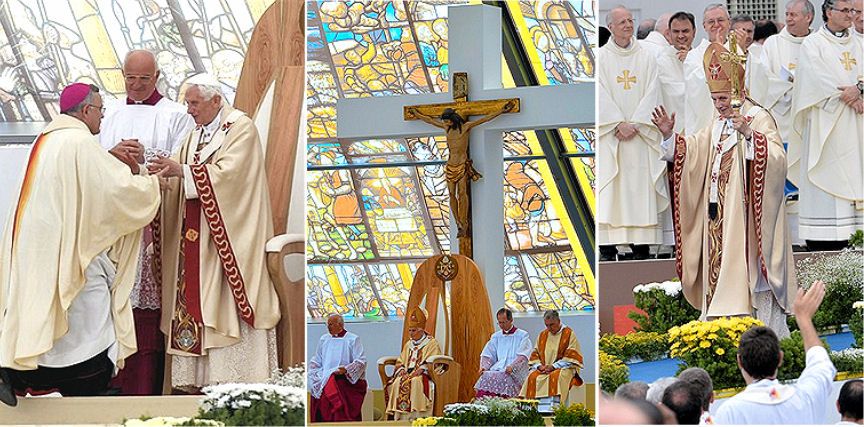 Mons. Chaput, Archbishop of Philadelphia, was on hand for the good news that his diocese will be hosting the VIII World Meeting of Families.
Mons. Chaput, Archbishop of Philadelphia, was on hand for the good news that his diocese will be hosting the VIII World Meeting of Families.
After the final Communion prayer and before leading the Angelus today, the Pope, speaking off the cuff said, “I cannot find the words to express my thanks for your presence here for this celebration of the Family.”
And to the cheers of the hundreds of thousands gathered, the Holy Father announced that the 2015 World Meeting of Families would take place in Philadelphia in the United States.
“I now have the joy of announcing that the next World Meeting of Families will take place in 2015 in Philadelphia in the United States of America. I send my warm greetings to Archbishop Charles Chaput and to the Catholics of that great city, and look forward to meeting them there along with numerous families from all around the world. May God bless you all!”
There was also loud applause when the Auxillary Bishop of Milan Erminio De Scalzi announced that Pope Benedict was donating 500,000 euros to those affected by the recent earthquake in the Emilia Romagna region of Italy.
In concluding remarks, the Pope encouraged the faithful to be always near to families who face difficulties, such as the Italians stricken by the recent earthquake and those who face hardship due to the economic crisis.
Here is a translation of the Holy Father's words before and after the Angelus prayers:
Dear brothers and sisters:
I cannot find the words of thanksgiving for this faest of God, for this communion of the family of God that we are. At the end of this celebration, then, we thank God who has given us this great ecclesial event.
On my part, I extend my heartfelt thanks to all who have worked for this event, starting with Cardinal Ennio Antonelli, president of the Pontifical Council for the Family - thank you, Eminence! =- and to Cardinal Angelo Scola, Archbishop of Milan - thank you! Also for this beautiful temple of God that you gave us for today. I thank all the officials who organized the event and all the volunteers.
And I am happy to announce that the next World Meeting of Families will take place in 2015, in Philadelphia in the United States of America.
I greet the Archbishop of Philadelphia, Mons. Charles Chaput, and I thank him for his readiness to host the event.
In French he said:
I affectionately greet French-speaking families, especially those who travelled to Milan for this event. I entrust all families to the Holy Family of Nazareth so that they may be places where life can flourish - families in which God has a place.
Today, I also take part spiritually in the joy of the faithful of the Archdiocese of Besancon in France, who are gathered to celebrate the beatification of Fr. Marie Jean-Joseph Lataste, a priest of the Order of Preachers (dominicans), apostle of mercy and apostle of prisons.
I am happy to announce that the next World Meeting of Families will take place in the city of Philadelphia, USA, in 2015. Through the intercession of the Virgin Mary, may you open your hearts and homes to Christ!
In English:
As we conclude this celebration by turning in prayer to the Virgin Mary, I wish to extend my thanks to all who have contributed to the success of this World Meeting of Families, particularly to Cardinal Ennio Antonelli, President of the Pontifical Council for the Family, to Cardinal Angelo Scola, to the Archdiocese and City of Milan, and to the many people from Italy and abroad who have prayed and worked so hard to make this Meeting a time of grace for all.
I now have the joy of announcing that the next World Meeting of Families will take place in 2015 in Philadelphia in the United States of America. I send my warm greetings to Archbishop Charles Chaput and to the Catholics of that great city, and look forward to meeting them there along with numerous families from all around the world. May God bless you all!
In German:
I greet all the pilgrims and families from German-speaking countries. I thank you for your participation in this World Meeting of Families in Milan. The family is, as we know, vital for society. In God's plan of creation, it is the privileged place where human beings can grow and learn the right way of life. Its contribution to the overall development of man is indispensable.
Let us therefore all do everything to create, even today, a family-friendly climate. and let us pray for good families and their togetherness.
Even now I invite you to the next World Meeting of Families in Philadelphia in 2015. May the Lord bless and protect families and all of us.
In Spanish:
I greet with special affection the Spanish-speaking faithful who have taken part with great enthusiasm in this World Meeting of Families, as well as those who are spiritually united to us through the communications media.
May the Most Holy Trinity - Father, Son and Holy Spirit - make everyone grow interiorly in the wisdom of love and abandonment to God, so that following the example of the Virgin Mary - perfect model of daughter, mother and spouse - your homes may increasingly be temples of God and true domestic churches in an abundance of virtues. beauty of mutual union, and constant fidelity.
With joy I announce that the next World Meeting of Families in 2015 will take place in the city of Philadelphia, in the United States of America. A happy Sunday to all...
In Portuguese:
I greet the families from the various Portuguese-speaking lands who are present in communion, and remind everyone of the Divine Treaty which, from the dawn of creation, hovered over the work that God had done and rejoiced: "It is good".
Dear families, you are with God at work and in celebration. Reserving Sunday for God, you celebrate like God did and rest together, at the spring where life arises, in order to construct the present and the future.
Divine powers are always stronger than your difficulties: Do not be afraid! You are strong in God. With joy, I announce to you that the next World Meeting of Families will take place in 2015 in the American city of Philadelphia.
In Polish:
I greet the Polish families present here in Milan and those who are with us through the communications media. May the the themes discussed these days - family, work and celebration - strengthen family love, fidelity and conjugal honesty; encourage young people so that they may desire 'to be' rather than 'to have', and help everyone to live Sundays as an encounter with Christ, in the joy of family celebration.
For the next World Meeting of Families, I invite you to Philadelphia in the United States, God willing, in three years. I entrust all your families to Mary, Queen of Families!
Finally, in Italian once more:
Dear families of Milan, Lombardy, Italy and the entire world. I greet you all with affection and thank you for your participation. I encourage you to always show solidarity with the families who are undergoing the most difficulties - such those who are suffering from the economic and social crisis, and the victims of the recent earthquakes in Emilia. May the Virgin Mary accompany you and sustain you always. Thank you.
After the Mass and Angelus, the Pope returned to the Archbishop's residence by car for lunch with cardinals, bishops and representatives of the families who took part in the week's events. The lunch was held in an interior balcony of the residence.
In the afternoon, at 4:30 pm., the Holy Father greeted the members of the Fondazione Famiglia 2012 and other organixers of the event. Downstairs, he greeted volunteers who had worked for the WMF, then left by car for Linate airport and the trip back to Rome.
At the airport, he made his farewell to his hosts, as well as Prime Minister Mario Monti, who represented the Italian government.
[Modificato da TERESA BENEDETTA 05/06/2012 22:20] |
| |
 03/06/2012 23:52 03/06/2012 23:52 |
|
| | | OFFLINE | | Post: 24.982
Post: 7.496 | Registrato il: 28/08/2005
Registrato il: 20/01/2009 | Administratore | Utente Master | |
|
 The Holy Father is back in Rome, and DEO GRATIAS for yet another successful trip - one that is even more gratifying to all who love the Pope, because it comes at such a terrible time, it would seem, for the the Vatican, for the Pope's co-workers in the Curia, and for his own papal household. Here is an account of his other activities in Milan before leaving Friday afternoon to return to Rome.
The Holy Father is back in Rome, and DEO GRATIAS for yet another successful trip - one that is even more gratifying to all who love the Pope, because it comes at such a terrible time, it would seem, for the the Vatican, for the Pope's co-workers in the Curia, and for his own papal household. Here is an account of his other activities in Milan before leaving Friday afternoon to return to Rome.
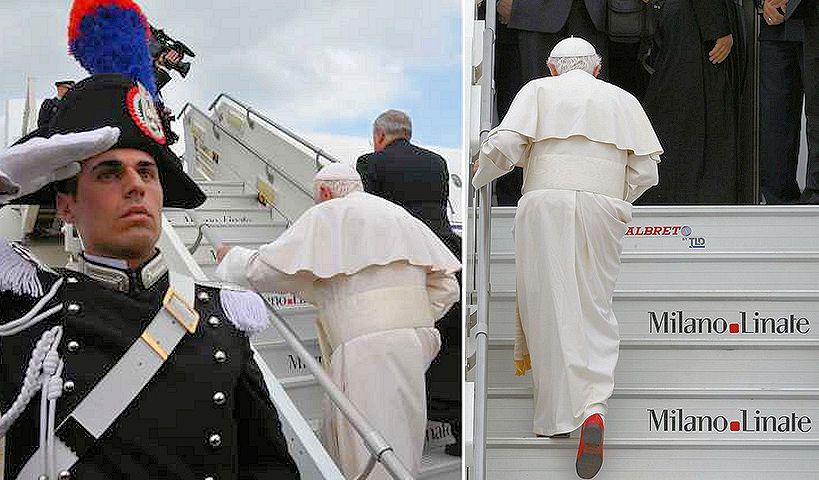 Pope Benedict leaves Milan
Pope Benedict leaves Milan
'serene and very happy'
Translated from

June 3, 2012
"We see the Pope very serene and very happy," said Fr. Federico Lombardi, Vatican news director, on Benedict XVI's three-day pastoral visit to Milan.
He said these have been "three great days - positive and encouraging - which will certainly help the Holy Father to face other problems".
At a briefing with journalists, he added: "The Pope knows the situation of the Church very well and her problems, but he is never frightened at whatever happens. He who must be the foundation, the rock of our faith, never loses his certainty regardless of the difficulties he may encounter".
Fr. Lombardi pointed out that "Benedict XVI himself is first of all, a man of faith, and in Milan, he did what a Pope does -t o announce the Good News of the Gospel for mankind and for society".
After the Mass in Bresso-Parco Nord, the Pope had lunch in the Archbishop's Residence with representatives of families around the world.
Seven families were invited: the Hassib family from Baghdad; the Botolos, a couple from the Congo; from Mexico City, the Gomez-Serranos with their son and one grandmother; from Australia, the Greens, with their two children, one of them a seminarian; from Philadelphia, the Tumcos with their five children; from Milan, the Colzanos with four children.
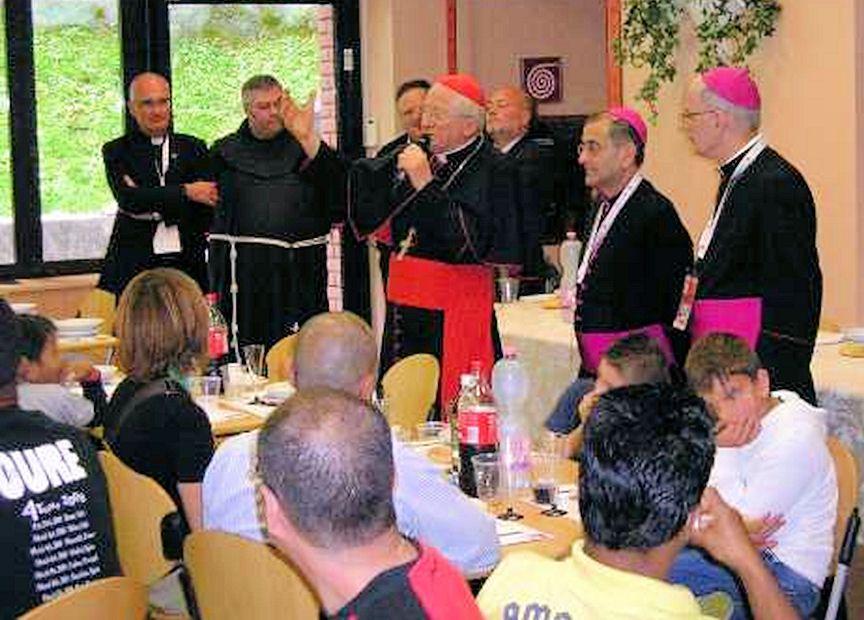 Above, Cardinal Antonielli addresses the invited families before the Pope arrives for the lunch. Below, Cardinal Scola gives some remarks after the meal.
Above, Cardinal Antonielli addresses the invited families before the Pope arrives for the lunch. Below, Cardinal Scola gives some remarks after the meal.
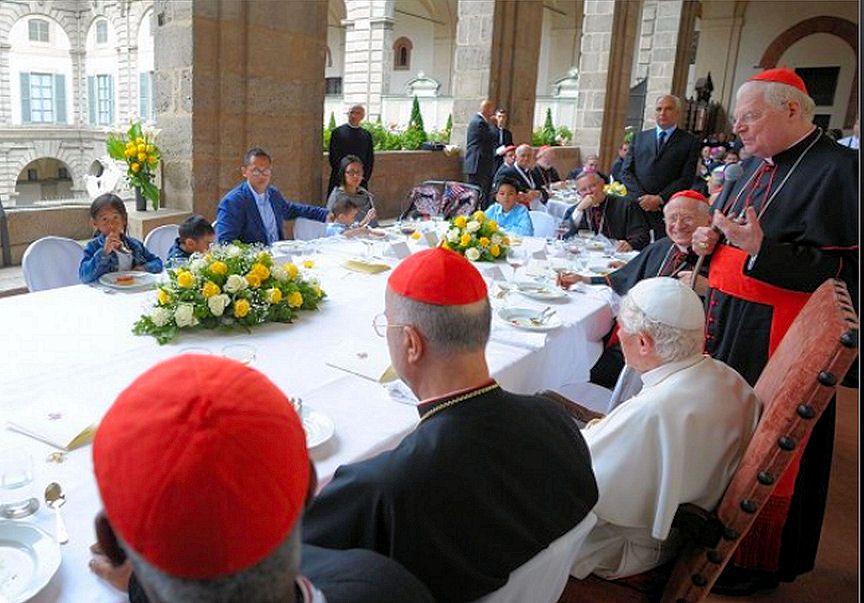
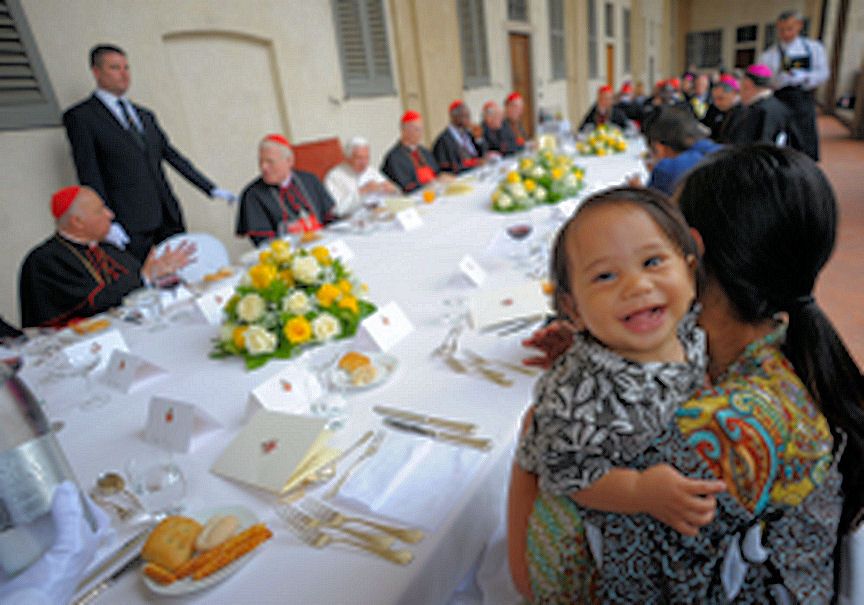
Also at the luncheon were Cardinal Angelo Scola, Archbishop of Milan, all the cardinals present in Milan for the occasion, the Milan Episcopal Council, and the Pope's delegation from Rome.
In the afternoon, before leaving the Archbishop's Residence, the Holy Father met privately with the officers of the Fondazione Milano Famiglie 2012 - the organization that had been primarily responsible for preparing the VII World Meeting of Families. Some of them brought their own families to meet the Pope.
The Pope then descended to the inner courtyard where, from the foot of the steps, he greeted the Archbishop's staff and some volunteers of the Fondazione and thanked them for all the work they had done.
Men and women of all ages had started working for the VII World Meeting of Families three years ago, although most of the volunteers came in a few months back. They said their common objective was "to make the experience a happy one" for the Pope and for the thousands of families who had come from Italy and the rest of the world for the meeting.
"I may not know what each of you did in particular, but I know that you worked so hard in a spirit of giving freely that is typically Christian," he said.
After imparting his blessing to them, the Pope stepped into the Popemobile which was to take him to Milan's Linate domestic airport for the flight to Rome.
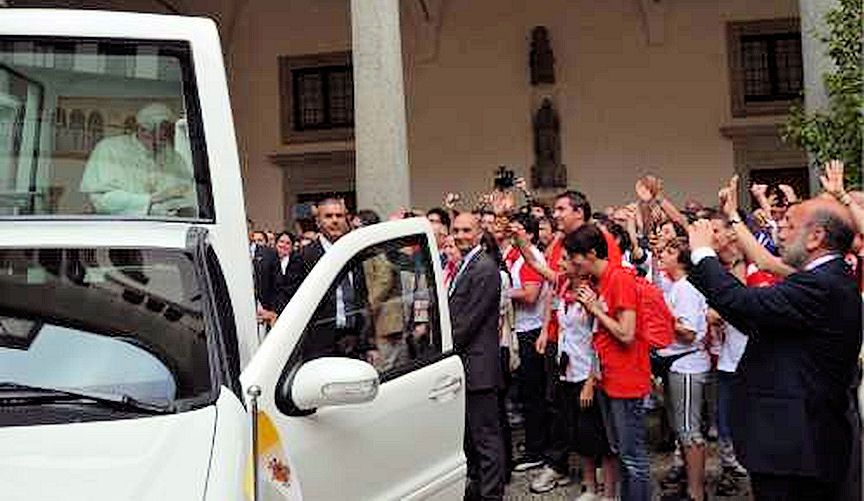
In the Piazza Fontana near the Archbishop's Residence, hundreds of persons had gathered earlier to give the Pope a send-off. Prominent was a banner that read VERGELT'S GOTT [the Bavarian form of 'Thank you', which literally means "God will reward you"].
Wellwishers turned up along the route all the way to the airport, as they had lined up when the Pope arrived on Friday. Waves of applause and chanting accompanied the progress of the Popemobile towards the airport.
P.S. The Vatican today, June 4, released a brief item on the Pope's remarks after the luncheon with representative families on Sunday, June 3:
The Pope's remarks
Translated from

June 4, 2012
After the lunch that took place at the Archbishop's Residence in Milan, yesterday, June 3, Cardinals Angelo Scola and Dionigi Tettamanzi addressed brief greetings to the Pope.
Cardinal Tettamanzi, immediate past Archbishop of Milan, also presented the Holy Father with a valuable copy of the Ambrosian Evangeliarium - realized by living artists under the supervision of don Umberto Bordoni - whose cover illustration is an iconographic representation of the celestial Jerusalem.
The Holy Father replied with the following brief extemporaneous remarks:
Dear friends, I find it beautiful that we have come back to the Word of God, which is the key to life, the key to thought, of how to live. We started with the Word, and we end with the Word - we are in the fullness of true life.
I want to say simply 'Thank you' for everything that I have experienced these days: an experience of the living Church.
If sometimes one might think that Peter's boat is in the midst of difficult adverse winds - which iS true - nonetheless we see that the Lord is present and living, that the Risen One is truly alive and has in his hands the governance of the world and the hearts of men.
So, the first thanks must go to the Lord, as I also thank Cardinal Scola, Cardinal Tettamanzi, their co-workers, and everyone - there are so many - who contributed, as well as all those who celebrated with us.
AP's wrap-up of the Pope's visit to Milan (the second of only two stories it gave to the event) but it probably would not have reported on the Mass at all if it had not needed a legitimate news peg on which to hang their account of the latest splash of benzine in the Italian media to revive the Vatileaks bonfire which had died down a bit in recent days... :
Pope celebrates open-air
Mass for one million
by COLLEEN BARRY

MILAN, June 3 (AP) — Pope Benedict XVI celebrated an open-air Mass for 1 million cheering faithful Sunday, capping a weekend visit to Milan viewed as a respite from a Vatican scandal, but fresh leaks of Holy See documents have only fueled the intrigue.
If the new leaks are authentic, the development could indicate that the recent arrest of the Pope's butler might not have stemmed the scandal as top Holy See officials had hoped.
The three-day visit to Milan during a weekend of Catholic events meant to boost support for families was also an opportunity for the 85-year-old pontiff to show he is still firmly at the helm of his Church. On Sunday, Benedict announced that he hoped to go to Philadelphia in 2015 for a similar pro-family event.
"I send my warm greetings to Archbishop Charles Chaput and to the Catholics of that great city, and look forward to meeting them there along with numerous families from all around the world," Benedict said.
Vatican officials said despite his looking forward to the event, it was far too early to confirm his attendance. Since becoming Pope, Benedict has attended a world families meeting in Valencia, Spain, but skipped one in Mexico [only because of the altitude!] His calendar is usually confirmed a few months in advance.
In his homily, the Pope said the focus on making money undermines families by creating an unjust society. Such thinking, he said, "creates ferocious competition, strong inequalities, degradation of the environment" and reduces family relationships "to fragile convergences of individual interests."
Meeting with some families at a rally late Saturday night, the Pope recalled his own childhood, which he likened to his vision of "heaven" — a house filled with music, big Sunday lunches and shared liturgical readings to strengthen the family faith.
"To tell the truth," the Pope said, responding to a question about his youth from a young Vietnamese girl during a meeting with families Saturday night, "if I try to imagine a little how it will be in heaven, it seems to be the time of my youth, of my childhood."
The Pope also remembered those who live in quake-stricken Emilia-Romagna, a northern region where 24 died in two temblors just over a week apart last month. On Sunday he pledged €500,000 ($616,000) to families in severe need in the quake zone.
His three-day stay in Milan, which included taking in a concert of Beethoven's Ninth at La Scala, had been viewed as a welcome break from the so-called "Vatileaks" scandal. Benedict appeared relaxed and at ease throughout the visit.
But the leaks continued even during his trip, with the daily La Repubblica publishing documents Sunday it said it received despite the butler's arrest.
One of the letters was a high prelate's complaint that he had not been consulted on the approval of a liturgy for a Catholic group in Spain, while two others reportedly bear the signature of the pope's secretary.
Vatican spokesman the Rev. Federico Lombardi said he was neither surprised nor concerned by the documents' release. He declined comment on the contents.
"We don't expect that the documents published so far are the last, and I wouldn't be surprised if more are published in the coming days," he told reporters.
"It is clear that whoever is working with the quantity of documents is playing with them, and the strategy is not to release them all at once and let us be in peace."
[Modificato da TERESA BENEDETTA 06/06/2012 02:36] |
| |
 04/06/2012 04:06 04/06/2012 04:06 |
|
| | | OFFLINE | | Post: 24.983
Post: 7.497 | Registrato il: 28/08/2005
Registrato il: 20/01/2009 | Administratore | Utente Master | |
|
 The real Ratzinger/Benedict XVI:
The real Ratzinger/Benedict XVI:
No anathemas in Milan, just encouragement
for families and married couples
by ANDREA TORNIELLI
Translated from the Italian service of

June 3, 2012
MILAN - This morning, a million persons rallied around Benedict XVI at the Mass which concluded the VIII World Meeting of Families, an event that was celebrated at a time that is particularly difficult for the Holy See and for the Pope's own household, in particular, because of the investigation of Vatileaks that has so far led to the arrest and detention of the Pope's valet.
It has been said and written that the affection of the faithful who came from 153 countries - who were very disciplined during the papal Mass at Bresso Park as much as they were warmly enthusiastic at the non-liturgical events - has sustained and comforted the Pope at this time.
The truth is that Benedict XVI, during the three days of his pastoral visit to Milan, had encouraged and sustained not the family in the abstract, but families in flesh and blood who had responded to his invitation to join this triennial event. He encouraged and sustained them in the positive experiences they already had and were carrying them on.
A first reality that surprised many was Papa Ratzinger's capacity to bear up to the physical demands on him. Especially Saturday evening, during the Feast of Testimonials when the Pope - who gives the best of himself in terms of effective communications ability - answered extemporaneously to the questions asked of him by representative families.
Of course, he had an idea beforehand what the questions would be, but his replies were concise and precise.
Paradoxically, it was at the event where there were hardly any politicians in attendance that the Pope had said the most beautiful thing about politicians:
"I think that the sense of responsibility should grow, in all political parties, not to promise things which they cannot realize, that they stop simply seeking votes for themselves, but that they should be responsible for the good of all, and that they understand that politics is always a moral responsibility before God and before men".
A second element is the tone that the Pope chose for the messages he sent for these days. One might have expected anathemas against the 'threats' that undermine the family, and yet, despite repeated headlines about 'abortion', 'euthanasia', 'de facto unions', Benedict XVI during these three days has spoken about the family and of families without once saying those words.
He has shown what is and what should be the contribution of Christians in this plural and 'fluid' society': a creative minority of persons who are not 'prophets of doom' (as Cardinal Scola said in his first greeting to the Pope at Milan's Piazza del Duomo) but who seek to bear witness to their experiences of living 'good'.
Even if he did not present any doctrinal change regarding communion for remarried Catholic divorcees [whose original Catholic marriage has not been annulled), the words the Pope addressed to this issue - showing that he grasps and acknowledges their difficulty and their suffering in this respect, and asking the Church community to pay more attention to them, were significant.
They showed once more that the true Ratzinger - the man that the million or more pilgrims gathered in Milan saw and heard - is different from the Ratzinger 'perceived' through the lenses of mass media.
No anathemas, condemnations or jeremiads. Nor dark-toned pictures of the reality - which are objectively difficult -that the world and its families are experiencing.
Benedict XVI did not 'fly high', but he spoke of the Other, which makes it worth living and building a family.
Back in July 2006, when Benedict XVI attended the V World Meeting of Families in Valencia, Spain, he said this to newsmen on the plane from Rome to Valencia, when he was asked specifically about whether he would criticize the anti-Catholic legislation of then Prime Minister Zapatero's socialist government:
I only wish to take a message of encouragement... 1 would not like to begin immediately with the negative aspects, because I am thinking of families that love one another, that are happy. We want to encourage this reality which is the reality that gives hope for the future...
"There are points where the Christian faith says 'no', it is true, and we want to make it understood that, precisely according to the nature of the human being, man and woman are ordered one for the other, and that they are also ordered to give a future to humanity. Therefore, we underline these positive things and in that way, we make it understood why the Church cannot accept certain things.
Fr. Lombardi on the Pope's visit:
'A great success - three days of joy
for the Church and the Pope'
Translated from the Italian service of

June 3, 2012
MILAN - "One couldn't have hoped for anything better," said Fr. Federico Lombardi about the Pope's pastoral visit to Milan and 'the great success' of the VII World Meeting of Families. "It didn't even rain. Everything went as well as it could".
At a briefing for newsmen Sunday afternoon, he said the events with Benedict XVI "all told, probably had about one-and-a-half million to two million participants - a Church event that was extremely expressive for the Church towards society and mankind. Everything was positive and helps to appreciate what is beautiful in the Church, in men and in the world".
As for Pope Benedict, Fr. Lombardi said that these 'three days of joy' in Milan will be of help to him "to face in silence and hope" the problems that face the Church, especially after the publication of leaked private documents that resulted in the arrest of the Pope's own valet.
[I don't understand why Fr. Lombardi persists in referring to the entire Vatileaks episode as a problem for 'the Church" - it's a Vatican problem, and the Vatican is not the Church. He, of all people, should not be taking the lead in feeding this confusion that the media have been perpetrating. Earlier this week, he told newsmen at one of his briefings, "I know this problem has resulted in a great loss of trust in the Church etc". If that was so, there would not have been a million people at the Mass in Milan. The faithful would not have lined the Pope's motorcade route from Linate airport to the city, and vice-versa, three days later.
Obviously, the so-called 'simple folk' have more common sense than the so-called communications experts, MSM and Fr. Lombardi included, who seem to believe that the world begins and ends with the news headlines. The 'simple folk' in whose behalf Benedict XVI has been laboring to clarify the faith constantly - so that they do not get confused by human irrelevancies - do not have their world view shaped by the media, and thank God for that.
Of course, there are not a few gullible persons, Catholics or not, generally among the bourgeois with intellectual pretensions, who deliberately get their opinions (and world-view) from whatever is the prevailing 'spirit of the times', which today is very secular and particularly anti-Catholic. The bourgeois mentality is one that wants to be 'in' all the time. Clearly, such persons can never see reason in a faith whose divine founder said would always be 'a sign of contradiction' - counter to what 'the world' thinks, i.e., not 'in' at all, not politically correct, not plugged into the herd mentality.]
These days, Fr. Lombardi added, "We have seen the Pope very serene and very happy. These have been three beautiful days for the Church - beautiful and intense. He is very sensitive to the manifestations of affection from the faithful, and he experiences their enthusiasm and their applause with joy and gratitude."
As for the new documents (one signed, the other anonymous) published today in an Italian newspaper, Fr. Lombardi said: "I am not surprised that more documents are coming out, nor am I more concerned now about these particular documents, but only for the general situation that so many confidential files have been released, about which we are still investigating the real significance and objectives pursued by this operation".
He added: "We do not expect that these will be the last of these documents, and I will not be surprised if more will follow. It is clear that whoever has received a vast quantity of documents has a chance to play out various strategies depending on his purposes. And I certainly don't think he would release everything once and for all, but rather keep us guessing. He won't leave us alone". [Could Nuzzi be the source of the documents cited today by Repubblica*, which is naturally playing coy about their source, or is there someone else now who is playing the same game as Nuzzi? It's hard to believe that if Nuzzi had anything more 'explosive', he would not have already used it in his book which suffers from a general paucity of 'major' disclosures, let alone any 'smoking gun' about any of the Curial hierarchy!]
Fr. Lombardi also revealed that Italian Prime Minister Mario Monti, who attended the papal Mass this morning in Milan, had greeted the Pope briefly after the Mass. He said the Prime Minister had waited after the Mass by the structure used as the sacristy for the Pope to vest and unvest his liturgical garments, and spoke to him when the Pope arrived in the Popemobile.
Lombardi said "it was an act of courtesy and kindness, not a conversation", but he noted that the presence of the Prime Minister at the Mass was "a very important gesture for society, not just for the Church, because the event was all about the family".
*[I will post something about the Repubblica article separately because I do not want it to contaminate the reportage about Milan, and because the article does not reveal anything substantial, but seeks to cast suspicion on Mons. Gaenswein by referring to two 'messages' on his letterhead in which their source had whited out the addressee(s) as well as the contents!. Speak about being opaque!]
The Pope at Milan's Feast of Families:
'Never have I seen such dialog
between a Pope and the people',
says an aged parish priest
by Giacomo Galeazzi
Translated from the Italian service of

June 3, 2012
"I have never seen such dialog between a Pope and the people", an aged parish priest said, one of almost half a million people gathered in Milan's Bresso-Parco Nord for the Feast of Testimonials with Benedict XVI on the eve of the conclusion of the VII Wolrd Meeting of Families on Saturday night.
Benedict XVI's second day in Milan had a memorable epilog. Since sunset, a rainbow of families from around the world, listened to a Pope who took on questions from representative families on a range of issues facing families today.
They acclaimed him from the field, as onstage, he answered questions that included communion for remarried Catholic divorcees and common difficulties about being faithful to Catholic teaching.
This Catholic kermesse became an agora of ideas and a time machine. After having listened to a round of testimonials about their life experiences from families in different parts of the world, Papa Ratzinger, instead of addressing the assembled faithful with a prepared text, had decided earlier to answer representative questions from the participants of the VII World Meeting of Families.
He looked into the eyes of those who posed the questions, went back into his own personal memories of family and childhood, and extemporaneously answered them with the good sense and wisdom of a man of faith.
Like a grandfather reminiscing on a summer evening, he described walks in the mountains with his parents, the music they enjoyed at home, his infancy in various little towns of Bavaria. Slices of domestic routine, flashes of how one family shared their humanity and Catholicism.
The world's parish priest united warmth and fidelity to doctrine. During this trip, he made no exceptions, calling on everyone to hold and uphold 'high ideals' - at the Cathedral to the clergy of the archdiocese; at the football stadium to the young confirmands; and now in this park in Bresso, enfolded in the embrace of a crowd not previously seen in Milan.
And yet, the model of public and private life that Benedict XVI has constantly proposed in his Pontificate is anything but 'on the cheap'. Perhaps he may have conceded to pop 'form' when he met with Milan's two famous football teams and received a jersey from each of them, or by sitting through the pop-music choreography that interspersed the Feast of Testimonials. But none of this touched on the content of his teaching.
Thus, the theologian Pope and Pastor catechized politicians not to vote laws that promote abortion or euthanasia, admonished young people to opt for marriage instead of simply living together and the virtues of family that derive from marriage, and re-stressed to the clergy the nature and grace of priestly celibacy.
But despite his characteristic preaching, which is neither 'soft' nor 'sweetened' up for public consumption, every event of his visit to Milan was am oceanic immersion among the faithful.
And remarkably, he also had a significant private meeting with Milan's emeritus Archbishop, Cardinal Carlo Maria Martini, historic leader of Italy's progressive bishops, whose request to meet with the Pope was the sign of a Milan which stands behind the Pope even as 'crows and moles' continue to poison the higher levels of the Curial hierarchy in Rome.
"The people sense the sincerity and power of his message", said don Luca, a Sicilian parish priest pushing the wheelchair of a disabled child towards the stage in front of the Cathedral of Milan to get a papal blessing.
Every movement of the Pope from one event to the next has taken place amidst singing, chanting and ovations. In front of the football stadium in Meazza, thousands [who were not participants in the stadium event] had been awaiting his arrival since dawn.
"I learned the faith in my family, where my character was shaped to be able to make my choices in life, and so I feel it is my moral duty to reciprocate to the Pope something of the good that I receive from his teaching", said Alessio Angeloni, a 35-year-old man who came to Milan from Ancona with 20 friends to see the Pope in Milan.
And from the 65-yearold parish priest of Sant'Andrea outside Florence, don Vasco Giuliani: "Benedict XVI has the best 'product' to sell in Christ, and at the best price, since he is free for everyone".
Don Vasco, who was a spiritual adviser for Italian Catholic Action for two decades and is now in charge of family ministry for his diocese, said: "Benedict XVI has the courage to propose not a generic ideal of the family, but that which must conform to Christian identity".
The faithful seek him out and he sees in them a plurality of individual stories. The vigil in Bresso was a collective conversation. Divorce, the economic crisis, a sense of difficulty about everything.
For each problem the Pope does not have 'a simple prescription' to make and says so clearly, but every question offers him a starting point for reflection, the comfort of his closeness, and the warmth of a Magisterium that speaks to real life, lie as it is.
To a Greek family that has been torn to pieces by the economic crisis, he admits: "Words are inadequate, we must do something concrete, and yet we are all incapable of doing that".
Then he calls on politicians to take responsibility: "Individuals are suffering, and their leaders ought to accept their responsibility for this".
And all around him, half a million faces who see in the gentle face of this Pope a glimmer of hope. Including divorced Catholics, whom he assures: "The Church loves everyone. You are not excluded".
In the Church, the Pope assures, no one is cast out, and no one is alone.
Cardinal Martini on 'current events':
'I told the Pope that we suffer with him
and that these events are purifying'

ROME, June 4 (Translated from TMNews) - A private meeting took place Saturday afternoon at the Archbishop's Residence in Milan between Benedict XVI and Cardinal Carlo Maria Martini, emeritus Archbishop of Milan, who spoke to Vatican Radio that among other things he spoke to the Pope about the so-called Vatileaks episode. [I have looked for the Vatican Radio report but do not see it on its online service in Italian.]
"I told the Pope that to accept these painful things as a gift is purifying. He is suffering, and we suffer with him. But the truth will come out".
He added that "During our conversation, the Pope was very humble and simple as he always is... these are certain very difficult times. I no longer 'think' about the Church today, but simply pray for it".
[If the cardinal was correctly quoted, I find the last statement quite uncharitable to the Church under Benedict XVI. According to an earlier report I read, the cardinal on account of the advanced stage of Parkinson's which the cardinal is suffering from, finds speaking difficult and does so using a special microphone to amplify his voice, and with an aide who interprets his words if they are not easy to understand. His conversation with the Pope took place with the interpreter on hand. The quotes attributed to him in that report were also 'better'. I have to look for it now.]
[Modificato da TERESA BENEDETTA 04/06/2012 23:35] |
| |
 04/06/2012 17:35 04/06/2012 17:35 |
|
| | | OFFLINE | | Post: 24.985
Post: 7.499 | Registrato il: 28/08/2005
Registrato il: 20/01/2009 | Administratore | Utente Master | |
|
 The 'Repubblica' story yesterday, June 3, about new Vatileaks documents, is written in that rather loose manner in which too many Italian news reports are written - where there are as many intended innuendos as there are deliberate imprecisions the better to reinforce the innuendo.
The 'Repubblica' story yesterday, June 3, about new Vatileaks documents, is written in that rather loose manner in which too many Italian news reports are written - where there are as many intended innuendos as there are deliberate imprecisions the better to reinforce the innuendo.
First, the newspaper claims that their source sent them three documents, one of which is a complete signed letter from Cardinal Leo Burke to Cardinal Tarcisio Bertone; and the two others, what appears to be the personal stationery of Mons. Georg Gaenswein and signed by him, but whose addressees and contents have been whited out... It confirms what anyone might have expected from the start - that eventually, the enemies of the Pope - however much they claim to be doing all this 'for his good' - would strike out at Gaenswein.
More importantly, these 'documents' are obviously insubstantial, and the intent in disclosing them is obviously malicious and frivolous - much ado about nothing, more than usual - because they certainly do not demonstrate any wrongdoing by either Bertone or Gaenswein!
I am translating the article only to give a better idea of the journalism by innuendo that is so prevalent in the Italian media, in which even the most respectable newspapers publish items that look like they are straight out of the 'yellow' press....
The crow strikes again:
New disclosures target
Cardinal Bertone and Mons. Gaenswein
Translated from

June 3, 2010
MILAN - "Those who are truly responsible at the Vatican must be chased out. Once more a scapegoat is being made to take the fall. What better victim than the Pope's valet? The truth must be sought in the center of power".
The crow flies again beyond the Vatican. He pounces even as Benedict XVI is on an official visit in Milan seeking a respite fro9m the poisons that are besieging him.
The crow has, surprisingly, produced new documents. And warns at the same time that 'we have hundreds more' where these came from, in the computer-generated letter that goes with the three new documents. Thus demonstrating - if it still needs to be underscored - that the Pope's valet accused of being the mailman in the massive documents leak from the Holy See, the scapegoat referred to in the letter, is not at all the only one, and that the crow continues to be active.
"The truth," the letter says, " must be sought in the center of power. Namely, in the private files of Mons. Georg Gaenswein, private secretary of the Holy Father, from whom there has been a continuous flow of documents in support of Cardinal Tarcisio Bertone".
A strong accusation which our source makes against a man in whom the Pope has the maximum confidence, and who for many years, is the person he trusts for matters that have to do with his own (the Pope's) personal affairs, but even on spiritual and political issues. [What an absurd claim to make about Benedict XVI, who certainly does not need to turn to his secretary for 'spiritual and political' advice! Obviously, they may 'discuss' or comment on events that they have to deal with in their daily interaction but that hardly makes GG a 'counselor of the Holy Father', as he is described in the next sentence. And I believe he would be the first to be indignant that anyone should consider him such!]
In recent years, in fact, Gaenswein has notably increased his influence in the papal apartment, ripening into a role that is naturally 'informal' but nonetheless tangible and clear to all, as counselor to Joseph Ratzinger
The crow writes in his cover letter, "Things have not always gone well, and Mons. Gaenswein and the Cardinal (Bertone) have exchanged the most confidential documents and papers without any controls". Saying, in effect, that documents and internal papers that are passed on from the papal apartment to the Secretariat of State, and vice-versa, sometimes get waylaid, and therefore beyond the Vatican's control. [Clearly, an opinion of the article writer interpreting the actual written statement.]
Thus the crow offers "three of the hundreds of documents in our possession".
The first is a 'very confidential letter' written to Bertone by Cardinal Raymond Burke, prefect of the Supreme Tribunal of the Apostolic Segnatura, protesting what he calls "the shameful situation of the Neo-Catechumenals, about which Benedict XVI has previously expressed himself in a lengthy handwritten note".
The other two appear to be letters from Mons. Gaenswein apparently signed by him, which concern, the crow's cover letter alleges, "some growing and possibly shameful events taking place within the Vatican".
Both documents are on stationery carrying the letterhead of the Holy See, and below, the the words "Private Secretary to His Holiness, Benedict XVI', with the signature 'don Georg Gaenswein' [I doubt that GG would sign himself that way, 'don Georg Gaenswein', using the Italian honorific 'don' used for any priest, because 1) he would not sign his name in the Italian form, and 2) if he did, he would certainly not use 'Father' but 'Monsignore' which is his title as papal chaplain since he was designated as such by John Paul II back when he was at the CDF.]
The text of the letters has been blacked out. The crow explains: "We are not releasing the texts so as not to offend the Person of the Holy Father, who is already sorely tried by his inept co-workers". [Thus speak the Pharisees, as though they had not already offended and violated the person of the Holy Father by the very act of disclosing documents stolen from his private files!]
He concludes: "Chase out of the Vatican the persons who are truly responsible for this scandal: Mons. Gaenswein and Cardinal Bertone". Accusations which are very severe, not proven, and in this particular case, not shown by what is presented. [Aha, some acknowledgment of objective facts by the Repubblica writer, buried deep within the article, after all the innuendoes. Thank heaven for little things.]
The letter addressed to Cardinal Bertone carries the signature of Caridnal Leo Burke and is dated January 14, 2012, with a stamped receipt date of January 16. He writes that he received an invitation to an upcoming event with the Pope said to be "on the occasion of approving the liturgy of the Neo-Catechumenal Way".
"I cannot", Cardinal Burke writes, "as a cardinal and a member of the ongregation for Divine Worship, fail to express to your Eminence the amazement that the invitation has caused me. I do not remember having been consulted about the approval of a liturgy specific to this particular church movement. I have received in recent days, many expressions of concern regarding such an approval, specifically one from a most respected American bishop, but I thought this was mere gossip or speculation. And now it seems that they were right".
Burke ends by saying: "As a faithful follower of the teachings of the Holy Father on liturgical reform, which is fundamental for the new evangelization, I maintain that the approval of any liturgical innovations, even after they have been corrected in part by the Prefect of the Congregation for Divine Worship, does not seem to be consistent with the liturgical teachings of the Pope". [This was all, of course, the result of an apparently misleading invitation, as the event itself made clear.]
Burke's objection is of primary importance for Catholic liturgists. Indeed, at the start of the year, the Holy See approved, after 15 years of study by the CDW, the liturgy proposed by the Neo-Catechumenals, whose way of celebrating the Mass has been an object of much discussion.
This is a blatant act of misinformation by a major Italian newspaper - but then it is hardly the first nor will it be the last. What the Holy Father approved was not the Mass practised by the Neo-Catechumenals but specifically, 'not strictly liturgical celebrations', as he said to the members of the movement on January 20, 2012:
Earlier, the decree was read which approves the celebrations presented in the Catechetical Directory of the Neocatechumenal Way, which are not strictly liturgical, but form part of your itinerary of growing in the faith...
Every Eucharistic celebration is an act of the one Christ together with his one Church, and is therefore essentially open to all who belong to that Church. This public character of the Holy Mass is ultimately ordered by the Bishop as a member of the Episcopal College who is responsible for his designated local Church (cfr Conc. Ecum. Vat. II, Cost. dogm. Lumen gentium, 26)...
Progressive maturation in the faith by the individual and by the small community must promote their insertion into the life of the larger ecclesial community, which finds its ordinary form in the liturgical celebration of parishes, in which and for which the Neocatechumenate works(cfr Statutes, art. 6)....
But even during this journey [of maturation], it is important not to separate yourselves from the parish community, especially not in the Eucharist, which is the true place of union for all, where the Lord embraces us in the various stages of our spiritual maturity and unites in in the one bread that makes us all one Body. (cfr 1 Cor 10, 16s).
It is important to point this out because even the initial report of Vatican Radio on 1/20/12, and those of many other news agencie,s made it appear that the Pope had approved the controversial and 'exclusive' Mass practices of the Neo-Catechumenals, when, as the excerpt above shows, he explicitly spoke against it. As I am sure Cardinal Burke learned to his great relief!
If the invitation received by Cardinal Burke had come from any Vatican organism - say, the Prefecture of the Pontifical Household, which issues the official invitations to papal events - then it was an appalling mistake on their part, and Cardinal Bertone ought to have reprimanded the responsible authority. Properly speaking, the event was a special audience with the Pope for members of the Neo-Catechumenals, an annual meeting to encourage their misisonary activities, and was not held specifically for the purpose of announcing any 'approval', although the movement itself promoted the misleading idea that the Pope had finally approved their version of the Mass.
The new letters from the crow show, in any case, that the battle within the Vatican is still going on. And that even if he is found guilty, Paoletto the valet who was arrested on May 23 for having leaked private documents form the Pope's files, is just a small piece of the picture.
The crow has returned. And as it has been clear since the start of this episode, he is not just one person.
Last Wednesday, at the general audience in St. Peter's Square, the Pope reiterated his full confidence "in all my co-workers". Yet it is his two principal co-workers who are cited in these new documents: Cardinal Bertone and Mons. Gaenswein. [Cited yes, but for what? Bertone was the recipient of a complaint obviously arising from wrong words on a Vatican invitation, and Mons. Gaenswein in two documents whose contents are not revealed or even hinted at (For all we know, they could have been letters he wrote to people asking for an appointment with the Pope - of which there must be hundreds by now, since it is probably the most common letter he writes and for which he must have a form letter!)
It is thus a continuing war. Which seems to be only in the opening stages, presaging the shadows of new strikes.
[Modificato da TERESA BENEDETTA 05/06/2012 00:35] |
| |
 04/06/2012 17:36 04/06/2012 17:36 |
|
| | | OFFLINE | | Post: 24.986
Post: 7.500 | Registrato il: 28/08/2005
Registrato il: 20/01/2009 | Administratore | Utente Master | |
|
 Monday, June 4, Ninth Week in Ordinary Time
Monday, June 4, Ninth Week in Ordinary Time
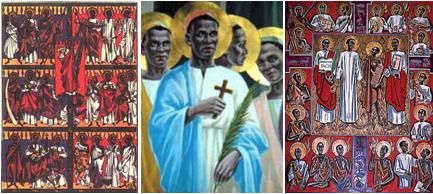 ST. CHARLES LWANGA AND 21 UGANDAN MARTYRS (d 1885-1887)
ST. CHARLES LWANGA AND 21 UGANDAN MARTYRS (d 1885-1887)
Between 1885-1887, an Ugandan tribal chief had 22 Catholic and ten Anglican court pages
killed for refusing to denounce their Christian faith. One of them was Charles, who became
head page after his predecessor Joseph Mukasa was beheaded for the same offense. Charles
then protected his pages from the homosexual advances of the tribal chief. He was a catechumen,
converted by the White Fathers, when he joined the royal household, where he managed to
convert other pages. He was considered the best athlete in the court and 'the handsomest man
in Uganda'. The tribal chief had been tolerant of Christianity at first but one of his chief
advisers persuaded him that Christians with their pacifism would be counterproductive to his
rule. He first turned against the rebellious pages who were sentenced to death by burning, with
Charles burned alive first to set the example. The other pages (15 Catholics and 10 Anglicans,
aged 13-30) likewise stood and died for their faith. Benedict XV recognized their martyrdom and
beatified them in 1935, and Paul VI canonized them in 1964. Charles is venerated as the patron
of African youth.
Readings for today's Mass:
usccb.org/bible/readings/060412.cfm
No events announced for the Holy Father today.
The Congregation for the Doctrine of the Faith released the text of a Notification it issued last March regarding a 2006 book
entitled 'Just Love, a Framework for Christian Sexual Ethics', by an American nun, Sr. Margaret Farley, R.S.M., who has failed
to answer satisfactorily the questions raised by the CDF about the incompatibility with the Church Magisterium of some of
her writings on the topic, particularly with regard to masturbation, homosexual unions, the indissolubility of Christian
marriage, and divorce. Sr. Farley writes that the Church Magisterium in these matters is just another opinion among many.
http://press.catholica.va/news_services/bulletin/news/29292.php?index=29292&po_date=04.06.2012&lang=it
ON THIS DAY...
In 2010, Pope Benedict XVI began a three-day apostolic visit to Cyprus.
In 2011, he began a three-day apostolic visit to Croatia.
|
| |
 05/06/2012 00:19 05/06/2012 00:19 |
|
| | | OFFLINE | | Post: 24.987
Post: 7.501 | Registrato il: 28/08/2005
Registrato il: 20/01/2009 | Administratore | Utente Master | |
|
 Last year, Mons. Georg Gaenswein was widely quoted when he said that what one finds in the media, especially about the Church and the Pope, is "not public opinion, but published opinion". Cardinal Angelo Scola was even more blunt today....
Cardinal Scola tells the media:
Last year, Mons. Georg Gaenswein was widely quoted when he said that what one finds in the media, especially about the Church and the Pope, is "not public opinion, but published opinion". Cardinal Angelo Scola was even more blunt today....
Cardinal Scola tells the media:
'What you think about the Pope is not
what the faithful think about him'
by Massimo Giardina
Translated from

June 4, 2012
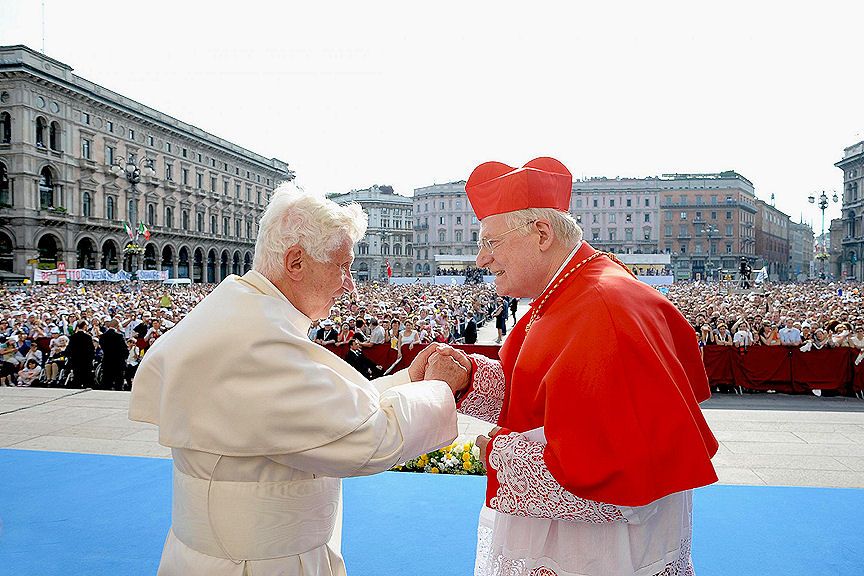
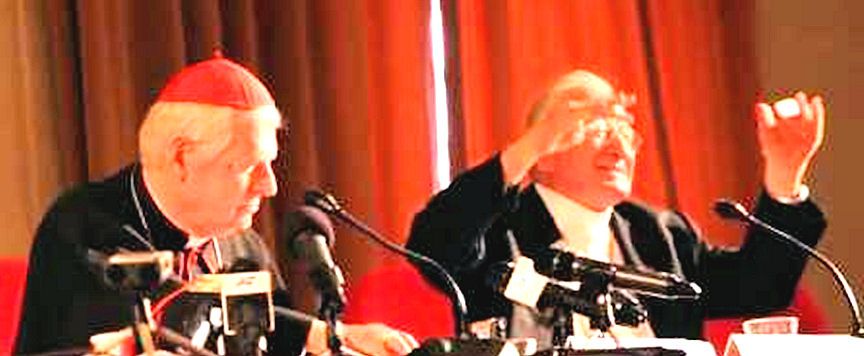 Cardinals Scola and Antonelli at the news conference on Monday, June 4.
Cardinals Scola and Antonelli at the news conference on Monday, June 4.
"When he arrived last Friday, the Pope told me that he is more comforted than tired [by recent events], and that he is convinced that demanding trips like these constitute a special grace for him", Cardinal Angelo Scola, Archbishop of Milan, told the media today at the concluding news conference on the VII World Meeting of Families held in this city May 28 to June 3.
"You must resign yourselves to actual fact: the opinion of the media is not public opinion. There's is a gross difference between what you report and what people really think, feel and live", he said, referring to the media coverage of Vatileaks in recent weeks, and of the Pope in general.
"You may think of yourself as being the vanguard, but throughout history, being the vanguard of controversy has been quite dangerous. The people love the Pope, and in particular these last few days, the Milanese have shown they love the Pope for the illuminating power of his humility along his superior intelligence about the faith and about man. In human beings, these two things rarely come together".
Cardinal Ennio Antonelli, president of the Pontifical Council for the Family, who co-presided at the news conference said the Pope remarked to him, "It's so beautiful to be in the midst of a living Church".
Antonelli said he found the remark "an indication that he is paying attention to the Church and not to 'marginal' things". The 'marginal things' clearly referred to Vatileaks and new developments about it.
But the organizers of the VII World Meeting on Families also presented statistics on the event, msot of them ahving to do with the presence of the Pope. And the numbers speak clearly.
- At least one million present at the Mass in Bresso-Parco Nord on Sunday.
- 350,000 participants in the Feast of Testimonials on Saturday night
- 80,000 recently-confirmed or about to be confirmed children at the football stadium on Saturday morning, with their parents and catechists
- Tens of thousands of wellwishers who lined the streets of Milan during the Pope's local transfers from one event to the next
And the special grace the Pope speaks about also reached the 3 million Italians who watched the RAI-1 live broadcast of the Feast of Testimonials - 25% of audience share on a Saturday night.
Fr. Davide Milani, spokesman for the ArchDIocese of Milan, said the audience drawn by the 'family feast' celebrated with the Pope was even more remarkable because "It was not your typical Saturday-evening fare - it was a program of substance, asnd yet it was the most viewed program that night".
Cardinal Scola underscored the responsibility that follows upon the VII World Meeting of Families: "Now it's up to us follow up on an important event that is significant because it lays emphasis on the 'ordinary' - the daily life of families".
He said this would be the second phase of the work he inherited from his predecessor, Cardinal Dionigi Tettamanzi, who started the preparations for the event, stressing 'family, work and solidarity' and deciding that "the diocese must re-invent the old-fashioned mutual aid societies".
Cardinal Antonelli said he was surprised by Benedict XVI's choice of Philadelphia to host the next World Meeting of Families. "In the short list of possible sites, I did not think Philadelphia was included. But then, all of the US bishops who have been to Rome for their ad limina visits in the past year have discussed the great difficulties and challenges faces by American families today , but that Catholic families also have a great vitality thanks to the positive contributions by the Church in the USA".
Other statistics on the Pope's visit
from the official site of the VIII WMF
TV viewership (from Auditel figures on viewership of Italian state TV RAI, mostly on its premier channel RAI-1):
2,097,000 Papal Mass on Sunday, June 3
1,791,000 "A Sua Immagine" focusing on the family and the Pope's visit, Sunday afternoon, June 3
3,082,000 Feast of Testimonials on Saturday night, June 2
1,305,000 “A Sua immagine” on Saturday afternoon
800,000 The Pope's meeting with the confirmands at San Siro stadium on Saturday morning, June 2
1,490,000 The Pope's address to the city of Milan in Piazza del Duomo, Friday afternoon, June 1
1,200,000 Concert at La Scala in honor of the Pope, Friday night, June 1
Police figures on attendance
and participation
150,000 lined the Pope's route on Sunday on his way to and from Bresso for the Mass
150,000 lined the Pope's route from the Archbishop's Residence in Milan to Linate airport om Sunday, June 3
200,000 lined the Pope's route from the Cathedral to San Siro and back to the Archbishop's residence, and then from the Archbishops residence to Bresso-Parco Nord on Saturday, June 2
100,000 lined the Pope's route from Linate airport to the Cathedrla of Milan on Friday, June 1
The Pope's other audiences:
On Saturday, June 2 -
5,500 Priests, religious and seminarians at the Cathedral of Milan on Saturday, June 2
80,000 Confirmands at San Siro Stadiumj on Saturday, June 2
95 Civilian officials and business leaders at the Archbishop's residence on Saturday, June 2
On Friday, June 1 -
80,000 Faithful assembled in Piazza del Duomo for the Pope's arrival
1,880 Attendees at the concert at La Scala
Assorted figures:
80,000 Visitors to the Family Fair in Bresso-Parco Nord
6,900 Foreign delegates to the Theoological-Pastoral Congress which opened the VII WMF
5,000 Tele-Participants in the Congress in Milan city center and other cities of Lombardy
5.300 Family2012 volunteers who worked the week of May 30-June3
900 Children who participated in the Congress for Children at Milan's fairgrounds
153 Nations represented at the VII WMF
P.S. For those who are interested, I have now posted translations of the Holy Father's other addresses in Milan that I had failed to translate right away - notably, his addresses to the confirmands at San Siro, the address to civilian authorities and lay leaders of Milan, and the one I did first, as priority - the Pope's Q&A at the Feast of Testimonials - in which once again, it is very clear how news reports on the Pope's statements are generally so deficient, failing not just to capture his tone but even the most substantive parts of his answers (about which there is much to remark upon!). His reminiscence alone of his childhood adds another piece to the picture he has built for us across the years at various occasions, in addition to what he wrote in MILESTONES back in 1997.
There were novel insights in his answers to the question of the 'always' in marriage (with a new reflection on the marriage in Cana); the problem of families caught in the grip of the economic crisis; the problem of families whose jobs preoccupy them so much to the neglect of their family life; and the problem of remarried divorcees who cannot receive the Sacraments - are new examples of his pastoral wisdom, in which he admits when the Church cannot do anything concrete (as in the economic crisis) other than charitable stopgaps, or admonishes remarried divorcees to consider their 'suffering' on account of not being able to receive the sacraments of Penance and the Eucharist - as being their offering to Christ and to the Church, from which they are not excluded but not from the love and concern of the Christian community and from the practice of the faith other than for the two sacraments they cannot receive...
Equally engrossing was his discourse on the gifts of the Holy Spirit to the Confirmation children; and his mini-tract on St. Ambrose's leadership guidelines delivered to the city and regional authorities and business leaders of Milan...
[Modificato da TERESA BENEDETTA 05/06/2012 19:45] |
| |
 05/06/2012 17:54 05/06/2012 17:54 |
|
| | | OFFLINE | | Post: 24.988
Post: 7.502 | Registrato il: 28/08/2005
Registrato il: 20/01/2009 | Administratore | Utente Master | |
|
 When I read in the Italian media yesterday that Cardinal Bertone had given an interview to an Italian news program about Vatileaks, the day after the Holy Father's exceptionally moving and spectacularly successful apostolic visit to Milan[ my first reaction was skepticism - 1)What good would it do anyone, since of all people, he has been the most objectively discredited by the documents that have been made public? And 2) Did he really need to do it when, as usual, Benedict XVI himself already took the lead, directly and explicitly, at the GA last Wednesday, and in everything he said and did in Milan? It doesn't add anything to Bertone's credit that he 'speaks up for the Pope' in this very 'softball' and basically unenlightening interview - he should have done so much earlier, but, very much in keeping with his record of being missing in action when it matters most, he did not.
When I read in the Italian media yesterday that Cardinal Bertone had given an interview to an Italian news program about Vatileaks, the day after the Holy Father's exceptionally moving and spectacularly successful apostolic visit to Milan[ my first reaction was skepticism - 1)What good would it do anyone, since of all people, he has been the most objectively discredited by the documents that have been made public? And 2) Did he really need to do it when, as usual, Benedict XVI himself already took the lead, directly and explicitly, at the GA last Wednesday, and in everything he said and did in Milan? It doesn't add anything to Bertone's credit that he 'speaks up for the Pope' in this very 'softball' and basically unenlightening interview - he should have done so much earlier, but, very much in keeping with his record of being missing in action when it matters most, he did not.
On the other hand, Bertone's conspicuous presence hovering behind the Pope at every event in Milan was perhaps intended by Benedict XVI to visibly demonstrate his continuing confidence in him, and Bertone may have decided that being 'acolyte' to the Pope in Milan had sufficiently inoculated him from the sting of negative public opinion, to the point that he felt courageous enough to address the Vatileaks issue directly.
Not, of course, that the interviewer even bothered to ask him whether he felt any responsibility at all for the bulk of the leaked documents that had come from his Secretariat of State. Nor did Bertone volunteer that he was sorry if anything he did or failed to do may have caused this open war against the Vatican and the Pope. The interviewer was also too deferential in not directly confronting him about the impression of 'ambition to power', as Nuzzi entitles his chapter on Bertone in the book 'Sua Santita', created by the objective fact of his misadventures with the CEI, San Raffaele and Toniolo (in all three of which Benedict XVI was not on his side).
In any case, John Allen has translated a transcript of Bertone's interview provided by the Vatican and I am posting it for the record. I have also decided not to fisk or comment on Bertone's answers.
Vatican 'Prime Minister'
speaks on leaks scandal
by John L Allen Jr

June 05, 2012
On Monday night, the Vatican press office dispatched an e-mail alert to journalists with the text of an interview given by Cardinal Tarcisio Bertone, the Vatican’s Secretary of State, in the wake of Benedict XVI’s weekend outing to Milan for the church-sponsored World Meeting of Families. The trip was considered a major success for Benedict, culminating in an open-air Mass that drew more than one million people to Milan’s Bresso Park.
The Bertone interview is noteworthy primarily because it’s the first time the Vatican’s “prime minister” has spoken at length about the leaks scandal which has engulfed the church’s central government since January, and which exploded anew in late May with the arrest of the Pope’s butler. Bertone’s comments take on special significance given that many analysts believe he is the primary target of the leaks, reflecting dissatisfaction among some Vatican insiders with his leadership.
Aside from insistence that Benedict XVI will not “allow himself to be frightened by attacks, of any sort,” perhaps the most striking element of the interview is Bertone’s comment that the leaking of confidential documents seems “carefully aimed, and sometimes also ferocious, destructive and organized.” [DUH! Any ordinary reader of news reports can come to no other conclusion!]
That language would seem to lend credence to the theory that whatever the butler’s role may have been, he did not act alone, and that there’s a larger agenda behind the leaks.
The following is an NCR translation of the transcript of the Bertone interview, which took place with TG1, a news program of RAI, the Italian state television service.
Interview with Cardinal Tarcisio Bertone
TG1, June 4, 2012
Question: You have just returned from Milan, who you accompanied the Holy Father for the World Meeting of Families. We have all seen, on television, so many people, an immense crowd, and above such great affection toward the Holy Father, who spoke words that touched everyone, including non-Catholics …
Bertone: It’s true. We all experienced this extraordinary display of love for the pope and of accompaniment, of support for him and his magisterium, for his work, of joy and enthusiasm around him. I saw so many people who were moved, even in the streets of Milan. Think about the streets of Milan Friday and Saturday, which was the weekend, and not just the big events in the stadium or Bresso Park. It was truly everywhere. It was, therefore, a beautiful display of love for the pope in this particular moment and an act of esteem for Benedict XVI, who was called the ‘great coach’ of the universal church’s vast team for the championship of the third millennium. He got a standing ovation that no player, no coach, no protagonist of social or artistic life has ever had. The pope was therefore very happy, and also very moved.
Q: Naturally the family was discussed, because it was the World Meeting of Families, and the pope indicated some firm points. Then he surprised some people when he spoke about the family, pointing to it almost as a useful and indispensable element to overcome the economic crisis that’s gripping our country and the rest of the world …
Bertone: Yes. The family as a resource, a resource which is above all moral. A united family, a family that educates, a virtuous family which teaches the fundamental virtues to children through their tender years, which educates children in work and respect for others, and in solidarity. Moreover, a family that’s a great resource for society, which also has been confirmed by modern sociologists. I would say that the pope has also launched some concrete instruments – instruments of solidarity, of twinning between families, supporting especially those in difficulty – twinning between parishes, between communities and cities. It seems to me that he’s indicated some paths which can be concretely followed to relieve situations of need and to move forward.
Q: It was inevitable that the media would look at these three days in Milan with special attention, also for the coincidence with an internal Vatican inquest which everyone is talking about, and which is seen as a great test of transparency for the Vatican …
Bertone: This is also true. I remember that Saturday night, while we were returning from Bresso Park, from the huge event that night, toward the cathedral of Milan. I was with Cardinal Scola in the car. We saw the stained glass windows lit up, and we immediately commented: ‘This is the church, an illuminated house, notwithstanding all the defects of persons within the church.’
Transparency, however, is about commitment, solidarity one with the other, and trust. It’s not a matter of cynicism or superficiality. It’s not enough to become aware of some documents, or to publish partial documents, in order to know the full truth. Often, this is exactly what happens: Clarifications are the fruit of a work of dialogue, of personal relationships and conversion of the heart, which don’t come just from paperwork or bureaucracy. Papers are important, but personal relationships are much more so.
What’s most sad in these events and these situations is the violation of the privacy of the Holy Father and his closest collaborators. I would like to say, however, that these have not been, and aren’t now, days of division but of unity. I would also like to add that they are above all days of faith, or firm serenity, also in the decisions being made. It’s a moment of cohesion among all those who truly want to serve the church.
Q: A final question, which is the one everyone would like to ask. How has the Holy Father experienced this affair? Should we think, as someone has written, that there are inferences which have been instrumentalized in order to attack the church and the pope?
Bertone: There have always been instrumental attacks, in all times. I remember, for example, speaking of my personal experience of the church, of the times of Paul VI, which aren’t so far away. This time, however, it seems the attacks are more carefully aimed, and sometimes also ferocious, destructive and organized.
I would like to underline the fact that Benedict XVI, as everyone knows, is a mild person, of great faith and great prayer. He doesn’t allow himself to be frightened by attacks, of any sort, nor by the hard accumulation of prejudices. Those who are close to him and work by his side are sustained by the great moral strength of the pope. Benedict XVI, as I’ve said on other occasions, is a man who listens to everyone, he’s a man who keeps moving ahead faithful to the mission he’s received from Christ, and he feels great affection from the people. Especially in these days [in Milan], he’s felt complete affection from the people around him, from young people and families with children, who applauded the pope frenetically. It seems to me that the trip to Milan gave him extra strength.
Moreover, I’d like to underline a word that he’s repeated many times, including just before his departure from the Archbishop’s residence in Milan: It’s the word ‘courage.’ He said it to others, to the young, to young people who seek to form a family. He said it to families in difficulty, he said it to the civic authorities, and he says it to the whole church. He speaks this word because he’s convinced on the inside, because it’s the strength that comes to him from faith and from God’s help, and thus he says it to all: ‘Courage!’ He said it also to the victims of the earthquake. I repeat: I’d like us to interiorize this word alongside the pope, and under the guidance of the pope.
OK, one comment: What about Cardinal Bertone himself taking on the courage of a positive initiative, instead of hiding to take cover first and then coming out when a temporary ceasefire allows him to show himself?
[Modificato da TERESA BENEDETTA 05/06/2012 19:43] |
| |
 05/06/2012 18:32 05/06/2012 18:32 |
|
| | | OFFLINE | | Post: 24.989
Post: 7.503 | Registrato il: 28/08/2005
Registrato il: 20/01/2009 | Administratore | Utente Master | |
|
 Tuesday, June 5, Ninth Week in Ordinary Time
Tuesday, June 5, Ninth Week in Ordinary Time
 Third from right, medieval illustration of the saint's preaching and martyrdom; center photo, John Paul II at Boniface's tomb in Fulda, Germany; next to it, a painting of Boniface's martyrdom.
ST. BONIFACE (born England ca 672, died Germany,754), Benedictine, Missionary, Apostle of the Germans, Martyr
Third from right, medieval illustration of the saint's preaching and martyrdom; center photo, John Paul II at Boniface's tomb in Fulda, Germany; next to it, a painting of Boniface's martyrdom.
ST. BONIFACE (born England ca 672, died Germany,754), Benedictine, Missionary, Apostle of the Germans, Martyr
Benedict XVI dedicated a catechesis to the saint on 3/11/09:
www.vatican.va/holy_father/benedict_xvi/audiences/2009/documents/hf_ben-xvi_aud_20090311...
Boniface was a learned monk who gave up the chance to be an abbot when he was assigned by Pope Gregory II to evangelize the Germanic tribes, where paganism was rife, and Christian teaching was lax for lack of appropriate catechists. He was much aided in his work by a letter of safe conduct from Charles Martel, father of Charlemagne. His mission was characterized by doctrinal orthodoxy and fidelity to the Pope. He established Benedictine convents to facilitate the mission and introduced Benedictine nuns to the work of education. On a mission to the Frisians, he and 53 others were killed while preparing converts for Confirmation. He is buried in Fulda, Germany.
Readings for today's Mass:
usccb.org/bible/readings/060512.cfm
No events announced for the Holy Father today.
Benedict XVI mourns death of
Guatemalan Cardinal Quezada, 80

June 5, 2012
Pope Benedict XVI has sent a telegram of condolence to Archbishop Oscar Julio Vian Morales S.D.B., of Guatemala City, Guatemala, for the death of Cardinal Rodolfo Ignacio Quezada Toruno, archbishop emeritus of that metropolitan see. Cardinal Quezada Toruno died yesterday at the age of 80.
In the telegram the Pope asks the Lord to grant His peace to a man who "served the Church with such intensity and generosity during his pastoral ministry, as guide of the diocese of Zacapa and prelate of Santo Cristo de Esquipulas, then as archbishop of the metropolitan see of Guatemala.
"With faith in the Paschal Mystery of Christ which illuminates moments of suffering and fills them with hope, and in recollection of a pastor committed to the mission of evangelisation", the Pope concludes, "I am pleased to impart my special apostolic blessing to those mourning such a touching loss".
Formal interrogation of
ex-valet started today
Translated from the Italian service of

June 5, 2012
Fr. Federico Lombardi's news briefing today on the Gabriele case was rather technical, with a magistrate of the Vatican civil court answering some questions. Sergo Centofanti has the report:
The formal interrogation of Paolo Gabriele, the Pope's former vale,t began today for the theft of documents from the Pope's private files.
Prof. Paolo Papanti-Pelletier said that Gabriele is accused of aggravated theft, which carries a penalty of 1-6 years if there is one aggravating circumstance, and 2-8 years if there are two or more aggravating circumstances.
Fr. Lombardi also said that investigators are also determining whether the documents that have been published so far are authentic or falsified, and whether one or more persons are responsible.
He said the Vatican has not issued any formal requests for investigation of Italiancitizens to the Italian authorities. [It was reported earlier that the Vatican was considering the possibility of investigating any role played by specific Italian citizens in the theft, dissemination and publication of the stolen documents.]
Paolo Gabriele continues to be detained under preventive custody in one of the 4 security rooms at Vatican police headquarters where he has been since his arrest on May 23. Under Vatican law, he can be held for up to 50 days, with a possible 50-day extension. On Sunday, he was allowed to go to Mass at one of the small churches in the Vatican.
Prof. Papanti-Pellletier said that there will be no public disclosure of what takes place during the interrogation, as a guarantee of the accused's rights, and in this case, he said, Vatican law is like Italian law.
Fr. Lombardi denied two new allegations reported in the mainstream Italian media:
1) that Gabriele had been acting as a 'double agent' for the Vatican police for months in order to smoke out the protagonists in Vatileaks. Fr. Lombardi called this 'absolutely unfounded and implausible' and 'sheer foolishness'.
2) an attempt by the media to involve Cardinal Bernard Law in the disappearance of Emanuela Orlandi in 1983. [NB: That's a stretch! In 1983, Law was bishop of Springfield-Cape Girardeau in the US, and would be named Archbishop of Boston by John Paul II the following year. But the Italian media are pandering to public prurience in the extreme by even reporting any of the wild speculation being fed to them by sympathizers of Orlandi's older brother who appears to have vowed an absolutely vile vendetta on Benedict XVI, who has nothing to do with the 29-year-old case at all!]
[Modificato da TERESA BENEDETTA 05/06/2012 19:31] |
| |
 06/06/2012 15:39 06/06/2012 15:39 |
|
| | | OFFLINE | | Post: 24.991
Post: 7.505 | Registrato il: 28/08/2005
Registrato il: 20/01/2009 | Administratore | Utente Master | |
|
 Italian Prime Minister
Italian Prime Minister
saddened by Vatileaks episode

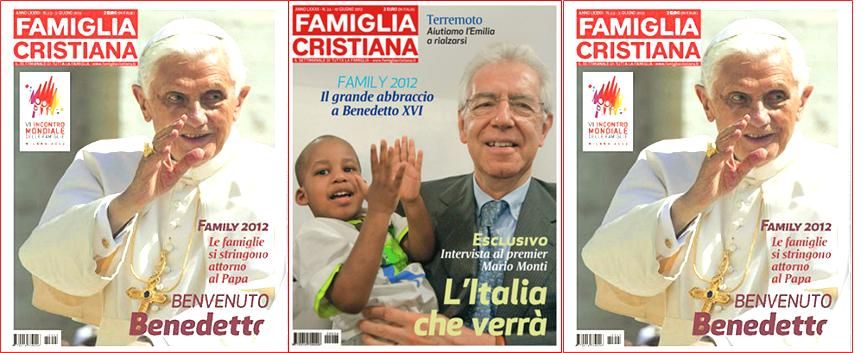
ROME, June 5 (Translated from LaPresse) - "Of course, I am stunned and profoundly saddened by what I read about events at the Vatican," says Italian Prime Minister Mario Monti in an interview with Italy's most widely-circulated weekly magazine, Famiglia Cristiana, for its issue coming out this weekend. He was quoted as saying:
I am saddened because, in itself, the episode [of Vatileaks] is saddening. But also because I think - even without having the least idea about the facts, since this has nothing to do with me - of the great sorrow and pain that this casts, at least for now, on too many people.
Mostly, at the pain that this must cause to the person of the Holy Father, in his heart, even if he has a heart of great solidity, not just of great kindness.
In the various occasions that I have met the Pope, from the very beginning, it was clear that he has a solid and direct idea of institutional relationships [between the Holy See and Italy], and there is thus a profound closeness which is, for me, a source of encouragement and support. And I may say so, I would say the same on the personal level.
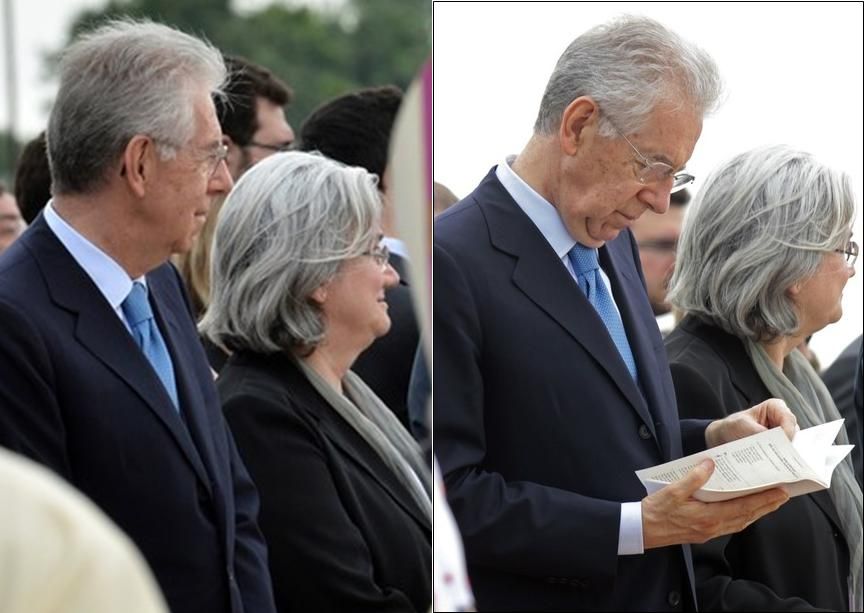 Monti and his wife at the Papal Mass in Milan last Sunday. The Prime Minister also saw off the Pope from Linate airport later that day
You must excuse me that I may be unable to post for some time. My PC has apparently been invaded by a virus that occupies disk space, so that I keep getting a 'You have 0 disk space left' message when I have only used 10gb of a 100gb hard drive. I need to have my hard drive rid of the virus (Norton 360 can't deal with it) - and meanwhile I cannot do any simple operations like 'copy and paste', let alone save anything. I freed up enough space to perform this post by switching a big file from the main drive to a flash drive, but everytime I do this, I get a few MB space for a 1GB transfer, and then it goes back to 0. This is crazy...
Monti and his wife at the Papal Mass in Milan last Sunday. The Prime Minister also saw off the Pope from Linate airport later that day
You must excuse me that I may be unable to post for some time. My PC has apparently been invaded by a virus that occupies disk space, so that I keep getting a 'You have 0 disk space left' message when I have only used 10gb of a 100gb hard drive. I need to have my hard drive rid of the virus (Norton 360 can't deal with it) - and meanwhile I cannot do any simple operations like 'copy and paste', let alone save anything. I freed up enough space to perform this post by switching a big file from the main drive to a flash drive, but everytime I do this, I get a few MB space for a 1GB transfer, and then it goes back to 0. This is crazy...
|
| |
 06/06/2012 17:44 06/06/2012 17:44 |
|
| | | OFFLINE | | Post: 24.992
Post: 7.506 | Registrato il: 28/08/2005
Registrato il: 20/01/2009 | Administratore | Utente Master | |
|
 'Dominus Iesus':
'Dominus Iesus':
The truth about God
By Fr. James V. Schall, SJ

June 5, 2012
The truth about God is not abolished or reduced because it is spoken in human language; rather, it is unique, full, and complete, because he who speaks and acts is the Incarnate Son of God. Thus, faith requires us to profess that the Word made flesh, in his entire mystery, who moves from incarnation to glorification, is the source, participated but real, as well as the fulfillment of every salvific revelation of God to humanity, and that the Holy Spirit, who is Christ’s Spirit, will teach this “entire truth” to the Apostles and, through them,to the whole Church
- Dominus Jesus (§6)
Dominus Iesus was issued on the Feast of the Transfiguration in 2000. Cardinal Joseph Ratzinger was then Prefect of the Congregation for the Doctrine of the Faith. Though not “inspired,” perhaps, in any technical sense, still the document was “prophetic.” It represents the teaching of the ordinary Magisterium of the Church. In many ways, it is one of the most instructive and incisive of all recent papal documents. [Technically speaking, it was not a papal document, because it was issued by the CDF under the signature of Cardinal Joseph Ratzinger, and indeed, the document affirms many of the indispensable fundamental bases of Christianity as expressed by Joseph Ratzinger/Benedict XVI in his countless writings.]
As I look back on it now, it was a document meant to recall the central teaching of what Christianity is about. But even more, perhaps, it was to inspire Christians with the courage of their mission, which remains to go forth and teach all nations what Christ has asked and commanded. (1)
It does indicate that we should be prudent, and theologically accurate, in whatever we do. But it does not say: “Go forth and teach all nations, except Jews, Protestants, Muslims, Buddhists, Chinese communists, sincere secularists, or Hindus.” This would, in practice, only leave a few African pagans who are not yet Muslim or Christian.
The fact is that, even with all the technological means available to us today, politically and culturally, it is less and less possible to teach and present Catholicism outside its own confines, and it is often under attack there. Freedom of religion is today much narrower than at almost any time in modern history. “Hate language” legislation has become largely a democratic, totalitarian tool to silence any real freedom of religion.
The document begins by stating what the Church itself is obliged to do and teach. It defines positions which deviate from that central purpose that is put into the world by Christ. It is thus of great significance to know just who and what Christ was and is — God? a prophet? a zealous man? a madman?
“The Church’s universal mission is born from the command of Jesus Christ, and is fulfilled in the course of the centuries in the proclamation of the mystery of God, Father, Son, and Holy Spirit, and the mystery of the Incarnation of the Son, as saving event for all humanity” (§1). Obviously, at the end of the second millennium, “this mission is still far from complete” (§2).
At this point, many begin to wonder: “Why is it not complete?” Surely two thousand years is enough time to give to a divine project. The implication is either that it really is not divine, or that the folks in charge, the Pope and the hierarchy, have constantly botched the job, misunderstanding the mission. Many, therefore, want to find another way to salvation, one that would utilize other religions and rites. Christianity is only one among many ways, not the way.
Dominus Iesus reaffirms the centrality of the Church and the place of Christ, true man and true God. It also relates the truths, found in other religions and philosophies, to the purposes of revelation.
Citing Paul’s statement in 1 Corinthians 9 about the “necessity” to preach the Gospel, Dominus Iesus “explains the Magisterium’s particular attention to giving reasons for, and supporting the evangelizing mission of the Church, above all, in connection with the religious traditions of the world.”
Inter-religious dialogue does not replace the need to evangelize. There is only one way of salvation. Inter-religious dialogue is designed that Catholicism be understood by other faiths, and that the Church itself knows exactly what other faiths hold.
This mutual understanding is not conceived as an assault on other religions, but as a respectful understanding of how they think of themselves. Likewise, the Church has been misunderstood and misrepresented too often over the centuries to look kindly on the deliberate or inaccurate understanding of what it actually teaches and practices. It does not hide what it holds and teaches.
Dominus Iesus takes up “what has been taught in previous Magisterial documents, in order to reiterate certain truths that are part of the Christian faith” (§3).
“The Church’s constant missionary proclamation is endangered today by relativistic theories which seek to justify religious pluralism, not only de facto, but also de jure” (§4).
Relativism holds that there is no single religious truth. All religions have something that is admirable. Therefore, religions should be joined together in a kind of world parliament of religion, under some larger cultural or political authority, which would define the limits of belief and religious practice. The claim to preserve a genuine revelation, and to make it known, is considered a threat to all religions. In this theory, Catholicism becomes the real enemy of religions in the world.
The following basic doctrines of revelation, in this new order view, have now been “superseded”:
- The definitive and complete character of the revelation of Jesus Christ, the nature of Christian faith as compared with that of belief in other religions, the inspired nature of the books of Scared Scripture, the personal unity between the Eternal Word and Jesus of Nazareth, the unity of the economy of the Incarnate Word and the Holy Spirit; the unicity and salvific universality of the mystery of Jesus Christ, the universal salvific mediation of the Church, the inseparability — while recognizing the distinction — of the kingdom of God, the kingdom of Christ, and the Church, and the subsistence of the one Church of Christ in the Catholic Church (§4).
These positions are controverted on all sides. The Church has the duty to remain itself, in all ages, to teach what was handed down to it. This is the good that Christ was sent into the world to make clear. His teaching was about the ultimate human purpose, and how it was to be achieved.
The document immediately states the philosophical and theological background to the objections against the truth of this revelation. Every objection to the truth of revelation will have its roots in an alternate intellectual system. What are these presuppositions?
- The conviction of the elusiveness and inexpressibility of divine truth, even by Christian revelation;
- Relativistic attitudes toward truth itself, according to which, what is true for some, would not be true for others;
- The radical opposition posited between the logical mentality of the West, and the symbolic mentality of the East;
- The subjectivism which, by regarding reason as the only source of knowledge, becomes incapable of raising its “gaze to the heights, not daring to raise to the truth of being;”
- The difficulty in understanding and accepting the presence of definitive and eschatological events in history;
- The metaphysical emptying of the historical incarnation of the Eternal Logos, reduced to a mere appearing of God in history;
- The eclecticism of theologians, who uncritically absorb ideas from a variety of philosophical and theological contexts, without regard for consistency, systematic connection, or compatibility with Christian truth;
- The tendency to read, and to interpret, Sacred Scripture outside the Tradition and Magisterium of the Church (§4).
Needless to say, these statements themselves are a good review of the theology and philosophy behind the rejection of the specifically Catholic understanding of revelation. The document locates the background of arguments that, sooner or later, end up by denying essential positions of revelation. The courage to protect revelation includes the courage to state clearly what is revealed, and the reasons why it is credible.
The Koran, for example, denies both the Trinity and the Incarnation of the Man God. Indeed, it not only denies them, but forbids their expression. In the name of ecumenism, we often underestimate the virulence with which the Cross, and divinity of Christ, are denied in most segments of Islam. Calling Jesus a “prophet” here — as also occurs in liberal Christianity — is designed precisely to deny what is being taught in this document, that Jesus was not just a prophet, but the Son of God.
In the light of this view that Christ was only a prophet — a view obviously itself developed centuries after the events of Christ’s life—it is necessary to affirm that Christ was not a simply a prophet (as in the Koran), nor was he a revolutionary, nor a nice guy, nor a deluded madman. The separation of the Jesus of faith and the Jesus of history, so dear to much modern theology, is, as the document says, simply untenable on the basis of the text itself. The Christian dispensation “will never pass away” (§5).
The Koran’s version of another dispensation, replacing the Old and New Testaments, is simply untenable on its own, and on the grounds of the New Testament.
Nor are all religions, including Christianity, just so many partial revelations of something which none of them, by themselves, can completely grasp. There may be, and often is, some truth in most religions — from any era or in any part of the world. The Church does not deny this, but rather affirms it.
But the only salvific message about salvation, in its fullness, is given in Christ (§6). Moreover, we should try to express exactly what it means when we say that “Christ is true God, and true man.” We often need philosophy — usually Greek philosophy — to assist us. In using such terms, we do not betray, but fulfill, the intent of Scripture.
“The truth about God is not abolished or reduced because it is spoken in human language; rather, it is unique, full, and complete, because he who speaks and acts is the Incarnate Son of God” (§6). Those religions and systems that would say that God is so ineffable that he cannot be spoken of — so that we must lapse into silence concerning God — do not reckon with the significance of the Incarnation. The fact is that the Son of Man did use human speech, and used it accurately. This still grants that there is much more to be said, even when we have spoken rightly.
Theological faith, our personal adherence to God, and the “beliefs” of other religions are not equivalent. “The distinction between theological faith, and belief in the other religions, must be firmly held” (§7).
This position does not say that, therefore, nothing in other religions is valid, but rather that the central and coherent fullness of God’s revelation is in Christ, and nowhere else. Non-revealed religions are still groping for what God is. They belong to the virtue of pietas: what man naturally owes to God. Christian revelation in this sense is not a religion. It is initially God seeking man, not man seeking God, though both have their proper places (§7).
Some writers want to maintain that the books of other religions are also “inspired.” Often, the reason they want to maintain this view is because they despair of the Christian mission in the world. If all are to be saved, they argue, the only way this can happen is if the books and rites of other faiths are equally salvific with the Christian books.
The Church, however, reserves the term “inspiration” to the Old and New Testaments alone (§8). It does not deny that good things can be found in these other books, but not the proper explanation of what God has revealed. Nor does this mean that all men are not called to the same end.
Citing the famous passage from Gaudium et Spes §22, the document states that God will “not fail” to make ways known to them. But the source of these ways is not independent of Christ, and his relation to the human race. “The sacred books of other religions, which, in actual fact, direct and nourish the existence of their followers, receive from the mystery of Christ the elements of goodness and grace which they contain” (§8).
Other theories want to “elevate” the Holy Spirit to a position independent of Christ and His Church. The document has no trouble in admitting that the range of the Spirit, and grace, is outside the limited boundaries of the visible Church.
Jesus is not just another pious or holy figure, along with others (§9). “These theses (that say he is) are in profound conflict with the Christian faith. The doctrine of faith must be firmly believed which proclaims that Jesus of Nazareth, son of Mary, and he alone, is the son and the Word of the Father” (§10). Nor is it possible to maintain that the Word of God, the Logos, is one thing, and Jesus, the man, is another. They are one and the same.
There is but one salvific program that is revealed: that is in Christ, who is true man. He is the sole, universal redeemer. Any theory of redemption must pass through him (§11). This is why some theories of the Holy Spirit, providing an alternate way of redemption, are untenable.
The Holy Spirit is the Spirit of God. There is one redemption effected by the Trinity, for one purpose: that all men might be saved. “There are also those who propose the hypothesis of an economy of the Holy Spirit, with a more universal breadth than that of the Incarnate Word, crucified and risen. This position also is contrary to the Catholic faith, which, on the contrary, considers the salvific incarnation of the Word a Trinitarian event” (§12).
Even from the beginning of the world, as well as in areas not yet evangelized, the presence of the Holy Spirit is always directed to the incarnational event. The Church has no trouble in admitting that the work of the Spirit, even now, ranges freely over the earth; but its purpose is the same redemption in Christ. There is but one “divine economy.”
The salvific mission of Christ is universal, being one within itself. With rather dry words, the document reads: “The thesis which denies the unicity and salvific universality of the mystery of Jesus Christ is also put forward. Such a position has no biblical foundation” (§13).
The constant teaching is that salvation will finally come through the sacrifice of the Cross. There are not “many” ways to salvation. All salvation will be through the grace of Christ, through the plan of the Father in sending him, and his Spirit, into the world.
“Those solutions that propose a salvific action of God, beyond the unique mediation of Christ, would be contrary to Christian and Catholic faith” (§14). This reaffirmation is not stated with any arrogance or defensiveness. It is just a report of what the texts say, and of what the Church has always taught.
It is one thing to say that “I do not agree with this, or I do not think it applies to me.” What is of concern here is whether this unconcern is what the Church teaches, on the basis of its mandate in Scripture and tradition.
Some propose that “theology should avoid the use of terms like ‘unity’, ‘universality’, and ‘absoluteness’, which give the impression of excessive emphasis on the significance and value of the salvific event of Jesus Christ in relation to other religions. In reality, however, such language is simply being faithful to revelation” (§15).
The final two sections of Dominus Iesus have to do with the Church, and its role in our salvation. The Church was established: she is an organized society under the successor of Peter and the bishops (§16).
“Therefore, there exists a single Church of Christ” (§17). The mission of this Church remains to make known this single revelation to all men (§18). We may not like this establishment, or think we have a better plan. Rather, what is at issue here is: “What did Christ do?” The document states the difference between the Church, and churches and ecclesiastical bodies (§17). And there is no doubt that all Christians should worship in one Church.
The document is careful to distinguish between the Church, theKingdomofGod, and theKingdomofChrist(§18). These are biblical terms, and technical ones. Christ, as the man-God, is the center.
The Church is not identified with theKingdomofGod, but is not apart from it. It is within it, as a body set up by Christ, to carry out his mission in this world. The document notes a modern “kingdom-oriented” thesis that wants to downplay both Christ and the Church, in order to get everyone into the Kingdom of God.
Again, “these theses are contrary to Catholic faith because they deny the unicity of the relationship which Christ and the Church have with the kingdom of God” (§19). In wanting to gather everyone into the kingdom, they bypass the means and institutions that Christ set up in the world to accomplish what he offered to mankind.
Finally, the Church is not just one way, among other ways, to salvation. If there is going to be an eternal destiny for all mankind, as there is, it cannot avoid a relationship with Christ. Dominus Iesus states that the Church is necessary for salvation, but this doctrine should not “be set against the universal salvific will of God” (§20).
The true Church, established by Christ, “subsists in” the Catholic Church. This does not mean that grace and the Spirit are not operative beyond the visible Church’s structure, but it does mean that grace and the Spirit are not setting up some alternative way to salvation that somehow bypasses what the Church is.
“It would be contrary to the faith to consider the Church as one way of salvation alongside those constituted by the other religions, seen as complementary to the Church, or substantially equivalent to her, even if these are said to be converging with the Church toward the eschatological kingdom of God” (§21).
How all of this is to be coherently explained is something for theologians to ponder. Dominus Iesus is concerned with these issues, but within the parameters of what is given in revelation itself. We may not see how God’s salvific will — that all be saved — is explained within the context of what Christ said about baptism, and the Church. But any explanations should begin with these givens. Otherwise, we have, in effect, some other position that was established by Christ.
“With the coming of the Savior Jesus Christ, God has willed that the Church, founded by him, be the instrument for the salvation of all humanity. This truth of faith does not lessen the sincere respect which the Church has for the religions of the world, but at the same time, it rules out, in a radical way, the mentality of indifferentism, characterized by a religious relativism, which leads to the belief that ‘one religion is as good as another’” (§22).
The universal plan of God for salvation means that the Church must always, even today, be “missionary” to all peoples in ways that respect the freedom, intelligence, and customs of others, but which also include the core of revelation.
Thus, if it is asked about its truth, the Church must speak it. This truth is what it owes to the people of the world, who look for a salvation from their sins.
The document concludes by citing the Declaration on Religious Liberty (§1) from Vatican II: “We believe that this one true religion continues to exist in the Catholic and Apostolic Church, to which the Lord Jesus entrusted the task of spreading it among all peoples’” (§23).
Looking back over a decade since the publication of Dominus Iesus, we can note that in the meantime, we witness the rise of a militant Islam, the increased and aggressive secularism that no longer “tolerates,” but replaces religion, and the continued decline in births in formerly Christian areas.
We also see the growing doubt, in many quarters, that the Church is the mediator of salvation. As Benedict wrote in Spe Salvi, we see a secular eschatology, not the one given through the Lord Jesus, but invented by man himself.
We notice that the alternatives to Christianity are pale imitations of what men really want, which is eternal life. It is refreshing that the Church still has the vigor, in her heart and in her head, to reaffirm that the salvation, offered to mankind through Christ, remains the only one which answers the longing in men’s restless souls.
Surely, the Church is right to reaffirm what it is to the nations, whether they listen or not. To repeat: “The truth about God is not abolished or reduced because it is spoken in human language; rather, it is unique, full, and complete, because he, who speaks and acts, is the Incarnate Son of God” (§6).
Managed to get this in because I had previously formatted and saved it on my 'working file' thread in the PRF. I'm still trying to figure out how to finish a post on the GA today - the Holy Father's account of the pastoral visit to Milan.
|
| |
 06/06/2012 21:12 06/06/2012 21:12 |
|
| | | OFFLINE | | Post: 24.994
Post: 7.508 | Registrato il: 28/08/2005
Registrato il: 20/01/2009 | Administratore | Utente Master | |
|
 From the rector of the church I attend for its traditional Mass on Sundays.
A lesson from St. Paul
From the rector of the church I attend for its traditional Mass on Sundays.
A lesson from St. Paul
for those 'vague Catholics'
who prefer Caesar to Christ
by Fr. George W. Rutler
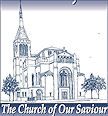
June 3, 2012
Having spent more than a few years dealing with mental patients, I thought I was pretty well informed about the etiology of psychosis. When I had to deal with a distressed individual whose symptoms were unlike any I had encountered, I asked a distinguished psychiatrist if there is a term for such a personality, and he replied that, based on the information I had given him, the best term was “nutcase.”
That was precisely what the Roman governor Porcius Festus thought of St. Paul. The Apostle had been imprisoned by Felix, the predecessor of Festus, for causing social unrest. The problem was that Paul's alleged crimes had to do with religion, and the cynical Romans did not want to get involved in matters concerning Judaism or anything outside the purview of the Roman legal system.
As the Greeks were nothing if not philosophers, so the Romans were above all lawyers, and at their best they had no equals. When the King of Galilee, Julius Marcus Agrippa II, came to the coastal city of Caesarea with his sister, Julia Berenice of Cilicia, with whom he was said to have had an incestuous relationship, Festus told them with Roman hauteur about this Paul of Tarsus, who spoke of “a certain Jesus who had died but who Paul claimed was alive” (Acts 25:19).
After Paul had testified before King Agrippa, Festus shouted, “You are mad, Paul; such language is driving you mad!” He assumed that Paul was the sort of fanciful intellectual the sober Romans disdained — living in an unreal ivory tower while the sturdy Romans built real towers and aqueducts and bridges.
Paul said, “I am not mad, most excellent Festus. I am speaking words of truth and reason.” Agrippa then said half sardonically, “You will soon persuade me to play the Christian.”
Christians are presently engaged in a confrontation with authorities in our nation that resembles Paul on trial. Some of those authorities assume that anyone who believes in a “certain Jesus who had died but who Paul claimed was alive” must be mad.
With admirable unity our bishops are defying the intimidations of our present government, like Paul in Caesarea. This discomforts those vague Catholics who prefer Caesar and his largesse to Christ and His sacrifice.
I recently received a note saying that that the bishops are exaggerating the state of things to mislead the people. I should be glad to disprove that in public debate — for there is no substance to such a view — but the note was anonymous.
Paul was not mad, and on the Feast of the Holy Trinity, we celebrate the mystery that will always be a puzzle to those who define reality on their own terms: “The grace of the Lord Jesus Christ and the love of God and the fellowship of the Holy Spirit be with all of you” (2 Corinthians 13:13).
Got this in, so I'll try working on the GA post, though I may not be able to copy any photos to go with it... And the next post should open a new page.
[Modificato da TERESA BENEDETTA 06/06/2012 21:17] |
| |
|
|
|
|